Frank Zappa wasn't so much a musician as he was a commentator on musical and social aesthetics who just happened to use music as his primary medium (along with all sorts of random chatter and bizarre noises and immature in-jokes so dumb that only an extremely intelligent person could come up with them). He didn't so much ignore musical trends as he transcended them, picking off elements from every genre imaginable and then repackaging them into a bizarre product that (almost) always could be instantly identified as Zappa messing with his audience again. He ...
Ah, screw it. So many essays have been written by music critics (somewhat of an irony, given how much Zappa professed to despise music critics) on the greatness and ridiculousness of Frank Zappa that I can't really say much that hasn't been said a thousand times before (though my wording may be different). If you're not a novice, you know that he invented (or played a significant part in inventing) a score of concepts used in the creation of rock music by artists ever since. He arguably created the idea of making intentionally conceptual albums; he showed that practically any genre could be grafted into rock music in some form or another; he popularized the notion (for better and often for worse) that you didn't always need to have music in the music you recorded, and so on and so on. Of course, you'll also be aware that Frank had/has a (well-deserved) reputation for letting his dilligence in putting good (and sometimes not-so-good) ideas on tape obscure a need to incorporate 'traditional' elements of good music (you know, like melody, harmony, actual human feeling and resonance, etc). I would even go so far to say that he cared about getting a message across in his albums much more than about providing a pleasant musical experience for people who are reluctant to completely obliterate their standards of what they would normally enjoy, and that, understandably, takes a little getting used to.
(Well, ok, I should also point out that there are a good number of albums, particularly the mostly instrumental ones, where Zappa is obviously focusing mostly on the music side, even if still not necessarily on the enjoyability side).
All of this is well and good, and these ideas are (generally) mentioned by pretty much anybody (in some form or another) who takes on the mammoth task of tackling the Zappa discography. But, you know, the downside of Zappa being, quite possibly, the most fascinating musical artist ever from a purely academic perspective, is that people tend to (not necessarily intentionally, of course) skirt a crucial question: why is it that you like or dislike this guy's music? What does he do that draws you in, and what does he do that repels you? I mean, let's face it; any person who claims to like everything Zappa did in his career is either a liar or somebody who deserves to be committed, so there's got to be something that attracts listeners to some of his work more than to others. Furthermore, with a discography this big, the number of possibilities of what makes Zappa tick for somebody is practically infinite. I know of several people who love Zappa solely because they see him as an alternative to "mindless" regular rock and pop music, and who thus love him when he's at his weirdest and most avant-garde, and reject him almost outright when he approaches anything they remotely view as a "sellout." Some people are really into his jazz and classical fusion period and largely reject the "song-oriented" albums he does. Some people care most about his political statements and social commentary, and don't like it when he gets "silly." And so on and so on.
So what makes me like Zappa? Actually, the question should probably be phrased more like "What makes me like some Zappa albums more than others?" I like quite a few sides of Zappa (though not all of them, for sure), and the ratings will reflect that, but there are definitely a few albums that stand a cut above the rest in my eyes. Of course, it's not as if I can exactly use as my rubric any "traditional" means of evaluation, simply because it's awkward to judge somebody by the rubric they are trying to annihilate. Judging a Zappa album primarily on "song quality" in the traditional sense strikes me as a waste of time; I often see people rip on Freak Out!, for instance, on the grounds that over half of the album is "just a bunch of stupid doo-wop songs," with the implication that it's then odd to consider that album superior to the more "involved" Mothers of Invention albums (and later). Since Frank (in my view) treated music much more as a tool than as an end unto itself (which I admit does bug me a bit about him, and which is why it's not possible for me to enjoy his best albums enough for a ***** rating on this site to be possible), it seems to me that the first thing to look at when evaluating a Zappa album is to see how effectively the music gets across his message (for better and for worse; naturally, of course, the seriousness or flakiness of the message inevitiably must also be considered), and that only after it's determined that the "message" factor has been considered should the question of individual song quality dominantly come into play.
The best way to explain what it is I like most from Zappa is that I like it when his albums are focused upon what I basically view as the primary gist of his entire body of work. The overall thesis of Zappa's career, the way I see it, consists of two parts. The first part says that contemporary art, even if it has some intrinsic redeeming qualities, is so hopelessly cheapened and commercialized that, in its present form, it cannot be salvaged/redeemed/whatever. The second part says that, because of this, contemporary art must be completely torn down, and then it must be rebuilt into something shocking and new and original. The albums I enjoy most from him, therefore, are the ones that present the most compelling and on-point arguments in favor of this thesis. This largely explains why my top three Zappa albums are Burnt Weeny Sandwich (where he actually adds a good dose of human emotion, or at least a really good imitation of it, to his bizarre deconstruction of modern classical, and then presents the amazing "The Little House I Used to Live In," which in my eyes might as well be the soundtrack to the sacrifice of modern art), You Are What You Is (which, technically, largely performs the tearing down and rebuilding processes simultaneously, producing some of the most glorious f*&ked up rock and pop songs I could conceive of) and Freak Out! (where the argument is probably presented in its most clearly discernable form).
Still, as implied before, these are hardly the only instances where I like, and sometimes approach loving, Zappa. I mean, he had some of the most astounding backing bands ever (especially The Mothers of Invention, not to mention the Roxy-era ensemble), he was an outstanding guitarist in his own right, and overall he could really entertain (or at least intrigue) at seemingly any time that he wanted to. I happily give him an overall rating of ****, just because two of his albums are (as of this writing) in my top 50 overall, and because with a discography as big as his he can't help having a bunch of other albums I think are terrific. I'm not a Zappa fanatic, nor would I ever want to become one, but I think he's seriously neat, and that's enough.
What do you think of Frank Zappa?
SolomonsOther.aol.com (07/03/05)
You forgot to mention the facial hair!!
Rick Atbert (erfinagerfin.hotmail.com) (07/03/05)
Nice to see you reviewing Zappa...he's one of my favorite musicians, and one
of the only guys who I could say, hands down, was a musical genius. "We're
Only In It For the Money" is such a well crafted album (well, barring the
last track) - how many albums can you not listen to for over a year and
still remember exactly how they go? Just the sheer amount of material - and
GOOD material the man put out was astounding. It would take the catalogues
of twenty bands combined to do all that Zappa did.
Yet, as much as I admire the guy, I have to admit that he tends to get
rather obnoxious at times. Now I like his theory - most songs on the radio
are about having sex, so he makes his songs blatantly graphic. Yet a lot of
the time (like on "Jewish Princess" or half the songs on that album) it just
gets annoying. His solos can be boring, and a lot of times he goes off on
stupid tangents (like the entire Thing-Fish album...how could he possibly
think THAT was a good idea), but I still love him to death. Who else could
do as much as he did?
Clifford Palmer (cpalmer2193.yahoo.com) (12/02/07)
Frank Zappa is my Elvis.
Dex Quire dexquire.gmail.com (05/13/12)
Hi John McFerrin,
I just wanted to say how much I enjoyed your reviews of the many Frank Zappa recordings over at your site; I'm late to the party in
finding out about Zappa (in my 40s, in my 50s now); many of the reservations you mention were mine too; but he is a wonderful
talent and artist when he wants to be. You have a friendly, clear writing style that makes it a pleasure to learn, explore-- thanks
much for posting.
I have some music and writing up around the web:
http://soundcloud.com/tracks/search?q=dex%20quire
and at
http://dexquire.com/
Constant, James (DFA5-A51) (James.Constant.dfa.state.ny.us) (01/13/13)
First of all let me commend you for taking on the monumental task of actually sitting down to listen to and review all of those
albums (I’m exhausted just thinking about it). You make good audio observations regarding the nature of Frank’s music and the
“meaning” behind some of the concepts. But alas, I think that perhaps you get caught up a bit in breaking down the stuff a bit too
much and lose the whole in the process. In the end, as much as you profess to like Zappa and (some of) the music, you come off as
someone who is just trying REALLY hard to enjoy it. Props for that, but you clearly have more of a taste for straight up rock and
roll…200 Motels a “4” in your ratings? Really? Wanting Captain Beefheart on Bongo Fury to shut up? Huh?...perhaps my tendencies
toward more avant-garde music have rendered me intolerant (I highly recommend you listen to a recording of Alban Berg’s Wozzeck,
and keep trying Trout Mask). I also never understood why people seem to be so uncomfortable and constantly claim that Frank’s
focus on sex and, shall we say less-than-socially-acceptable subject matter take away from his achievements and distract from the
music. IT’S ALL PART OF IT! Frank once said that he writes about stuff that is real, Hence songs about the Illinois Enema Bandit
versus ditties about eternal love. Writing about what is real as opposed to fantasy is going to get messy, and that’s the point!
Reality is messy, and that is reflected in the music…and if it takes over the top grossness or sophomoric sexuality to make the
point, so be it. Well, I suppose that when it comes to a man with such a monumental output encompassing so many differing musical
styles and points to make about society, politics, art and people in general, reasonable people will disagree. I guess I just
never quite got why there seems to be so much stinging critique regarding a guitarist who was so superior to most, a satirist with
such a biting sense of wit, and a composer with unparalleled creativity…while the latest crappy pop albums garner rave reviews.
Perhaps it’s just me…
John Harris (johnharriscivil.hotmail.com) (01/13/13)
John,
great reviews- am here to looking at the zappa ones
but will check some more out
how do you find the time !!!!!!!! or is there a team of you
Terry Pagitt (pagittsmith.me.com) (08/13/13)
So far I read all your reviews and other than most of Roxy and You are What You Is you don't have anything good to say about them.
Why did you bother?
Thomas Hesser (thesser2018.francisparker.org) (12/13/15)
Interesting guy. Everyone should have at least a couple albums. Very influential on Beefheart, the Pop Group, and other geniuses. BTW, have you ever heard the pop group? Nick Cave said “We are all prostitutes” is the greatest song ever written, so I recommend you at least sample them.
Be careful though, their music is frightening at points.
Best song: Trouble Every Day
What's funny about that innovative property of the album, though, is that it ends up as an innovative album not only despite there being large stretches of the album that aren't innovative in and of themselves, but also arguably because large stretches of the album aren't innovative in and of themselves. You see, as detractors of the album are often only too eager to point out, the majority of the first LP (I guess I should mention that this was a double album, the second one in rock, even though it's only about 60 minutes long) is filled with a mix of "regular" 60's pop-rock and a whole lot of doo-wop. Of course, "regular" isn't exactly the right word to use; there is an unbelievable amount of satire and parody and plain ole vitriol to be found in these tracks, the kind that wasn't common back then. The doo-wop songs have absolutely no optimism in them whatsoever, and that should be obvious (even without giving the tracks a serious listen) just from the titles. What kind of self-respecting doo-wop band would release songs with titles like "I Ain't Got No Heart," "Go Cry On Somebody Else's Shoulder," "How Could I Be Such a Fool" and "You Didn't Try to Call Me?" The 60's pop-rock pastiches that make up much of the rest are just as jabbing; "Motherly Love" is proto-cock-rock at its deliberately dumbest (well, sorta), "Wowie Zowie" is an interesting pop song with hilariously dumb lyrics, and "Any Way the Wind Blows" is a fantastic "typical" 60's pop song that would actually have serious commercial potential in the hands of a different band (who would probably do the vocal arrangement more straight-laced, naturally).
Still, for an album with the title Freak Out!, it might seem only natural to expect something a little more "extreme" than a bunch of slightly tweaked doo-wop and 60's-pop songs, and on a surface level, that seems a reasonable statement. In my view, though, this belief overlooks one of the primary innovations of this album, which is definitely found in these songs as much as anything else; the concept of deliberately messing with the listener. Zappa knows that all those songs aren't the kind of huge stylistic left-turns one would expect after reading the liner notes, and in fact he explicitly clues the audience into this fact by ending this stretch with a song called "You're Probably Wondering Why I'm Here." After starting the album with such a deep-hitting counter-culture anthem as "Hungry Freaks, Daddy" (one of the best social protest anthems ever, as far as I'm concerned, even if it's not even the best social protest anthem on the album), and early on assaulting the listener with the hyper-low-pitched grumbling, hilariously lethargic "Who Are the Brain Police" (a song that instrumentally almost sounds as if it were recorded twice as fast and then played back at its current pace, and which has hilariously off-pitched dirgey vocals and which breaks into a really disturbing freak out in the middle), the idea of making nine of the album's first eleven tracks pop and doo-wop, tweaked as they may be, is utterly absurd and incongruous with the supposed album concept, and that's the point. Zappa is playing his audience, batting it around like a cat with a ball of yarn, until he feels the joke has gone on long enough, at which point he immediately switches gears and veers off back to the "main attraction."
The first stop is "Trouble Every Day," a "blues-rocker" that is indeed the best song on the album and an even better social protest anthem than "HF,D." Structurally, it's much more direct than the kinds of things Zappa would do for social protest in the future, but in this case that's really for the best, because it's the lyrics and delivery that matter most here, and the blues-rock background absolutely rips in terms of giving these lyrics the extra power they deserve. Zappa doesn't so much sing as he orates with a couple of pitch changes here and there, declaring at a rapid pace that, in essence, he's disgusted with society and the way people treat each other and how moronically they act. More relevant to the album itself, the implication is also that he's disgusted with the (in many ways) "trite" music culture of the day that stood by and was complicit with all of the other negative forces in society in that they helped lull people into a mindless stupor that would make listeners more willing to sit back and passively accept things (parallels can clearly be seen in the later Third Reich and Roll by The Residents, though in that case the response is just to cleverly mock pop music instead of to attempt to completely redo the music culture). Clearly, Zappa is postulating that if music is going to be able to snap out of this state and act against negative forces, it essentially needs to start over and reform as something as different from present music as possible.
For better or for worse, the solution he proposes makes up the rest of the album (the second LP of the original release). "Help, I'm a Rock" is a rhythmic jam that largely consists of chanting the title repeatedly while all sorts of sounds get built up around it, "It Can't Happen Here" is a bunch of a capella muttering and "singing" of whatever, and "Return of the Son of Monster Magnet" takes the "sound collage" concept to a hilarious level. The funniest part, in my ears, is at the beginning of "Monster Magnet" when Frank addresses his made-up female 'heroine' (well, actually, she's just a recurring character that would later appear on a lot of Zappa albums, but whatever) in the guise of her conscience and asks her, "What's got into you," but that's really just one amusing bit of many. Is the whole thing overlong and ridiculous? Of course. If these tracks were released as a stand-alone album, the truth is I probably wouldn't have the slightest idea what to make of them, and it's entirely possible that I would (to my detriment) just try to completely ignore it. But the thing that matters (to me, anyway) is that this jam/collage is the logical conclusion to the question implicitly postulated in the first part of the album. Frank's solution to the "problem" of pop music is musique concrete, and whether or not that's a "good" answer (I think it's kinda silly, to be honest) seems largely irrelevant to me. The fact that somebody even bothered to ask a question like this, produce an answer, and then release it to the general public is flat-out amazing to me, and that's where I find the greatness of Freak Out!.
In short, Freak Out! strikes me, overall, as one of the smartest albums Frank ever made in his long, long career. Yes, there are plenty of individual moments (heck, there are long stretches) where, taken on their own, it doesn't seem like this should be considered an incredibly great album, but taken as a whole, this album is a shiny jewel. A shiny, sarcastic, orgasm-noise-making jewel.
marc white (marcwhite29.icloud.com) (05/13/16)
I have enjoyed your reviews. I didn't like freak out at first, but the more I listen to it; the more I enjoy it.
(later)
Reading your reviews on Frank Zappa. After you completed your reviews the ZFT (Zappa Family Trust) released the project object series. MOFO (making of freak out) comes in two forms; one is a two cd version, and the other is a three or four cd version (from what I read both versions have different unreleased material). That said, I own both freak out and MOFO. MOFO is freak out as the original 1960's mix with bonus material. I personally like it better. It sounds more authentic without compromising the sound.
Best song: Brown Shoes Don't Make It
The album is divided into two "underground oratorios:" one, called "Absolutely Free," which mostly consists of Zappa singing about the life and culture of vegetables (though preceded by "Plastic People," which goes more with the second suite), and one called "The M.O.I. American Pageant," about the life and culture of the average yokel American. The general implication, of course, is that the average American is just like a vegetable, which naturally can be taken as some sort of biting general social critique. This concept of a vegetable/American parallel is a good idea, but the problem I have with it is that (in my observation at least; maybe I'm missing a whole bunch of subtext in it) Frank doesn't really bother to expound in detail on this idea. In my mind, a conversation on this topic between myself and Zappa on this album would go roughly like this:
Me: "So what exactly is the point of the vegetable suite?"
FZ: "Well, it's obvious that I'm saying that the average American isn't that much different from a vegetable."
Me: "Hmm, that's interesting. I think I have a vague notion of the kinds of direct comparisons that could be made as examples of your claim, but it would be nice if I could have a clearer idea of what you mean by that. Can you go into further detail about this comparison?"
FZ: "Uh ..... Chunga, Chunga, Chunga, Chunga!!"
The thing is, on Freak Out!, there was a kind of "thematic crescendo," which not only gave a neat tension as Frank went on and on before reaching the punchline, but also gave a chance to clearly (if indirectly) delineate what it was he was trying to say. Here, though, by throwing the vegetable suite at us without much of a warning/introduction, it's tougher to make sense of it, and given that the "message" of the album is so obviously a central focus point in trying to to enjoy it, this kinda hurts things overall.
Not that I don't basically enjoy the suite, of course. "The Duke of Prunes" suite is a goofy, yet lovely, pseudo-romantic melody crossed with weird, jazzy guitar rock and with a strange dissonant modern-classical/jazz/random-chatter/whatever break in the middle ("Amnesia Vivace"), and the "Call Any Vegetable" suite goes from a jazzy yell-fest into a lengthy instrumental break ("Invocation & Ritual Dance of the Young Pumpkin"), before "resolving" (I guess) itself in "Soft-Cell Conclusion." "Invocation & Ritual Dance etc" might not seem extremely whacked today, but I have to suspect that crossing jazzy saxophone and guitar soloing with 60's go-go rhythms wasn't commonplace back in '67, and this innovation and sense of novelty adds to the enjoyment I already feel towards the piece. So yeah, the suite is basically ok; I wouldn't mind hearing it from time to time, I mean.
The second suite is more interesting to my ears, probably because I can understand direct rips against average Americans better than doing so using prune metaphors. The album opener (which, again, I consider a part of the second suite, if only as a prelude), "Plastic People," has one of the greatest introductions to any album ever, and proceeds to alternate a great verse "melody" with a bunch of chatter to terrific effect. "America Drinks" is a nice lounge-jazzy piece (with stupid vocal asides like "Wanna buy some pencils?") whose opening "Dah doo doo doo doo doo doo doo Dah doo ..." is done in the best "deeeuhrr, I'm an average American idiot" voice I could imagine (it's also reprised at album's end, as "America Drinks and Goes Home"). "Status Back, Baby" is a jazzy doo-wop piece about a high school socialite who had once been popular but now finds his fifteen minutes of social fame slipping away, and who implicitly (I think, at least this is what I'm reading into it) realizes that he's now worthless because he's losing his popularity. Now this I can understand and enjoy; I like seeing popular people become losers like me.
"Uncle Bernie's Farm," then, is just hilarious, as it goes from an awkwardly anthemic (for the better) lampoon of whatever into an UNBELIEVABLY hilarious middle-8 ("We gotta send Sanny Claus back to de Rescue Mission! ...") that's delivered in a way that will send you rolling on the floor if you listen carefully enough. "Son of Suzy Creamcheese" is a short interlude loosely based on the "Louis Louis" riff (a theme that Frank would reprise several times in his career, and was already used in "Plastic People" to even better effect) that could have been a large hit in the hands of somebody else, but here it acts merely as an entertaining prelude to the main showcase of the album.
"Brown Shoes Don't Make It" sums up so much about Zappa and his world view that listening to it could easily serve as a 7:30 primer on Zappa. It throws jazz-rock and music hall and bluesy call-and-response and old cabaret music and whatever into a single pot, with all sorts of weird vocal effects and sounds and Zappa explicitly saying that the average American male wants to have sex with his daughter when the wife isn't around (!!!). Naturally, when he does the last of these, he does it in the goofiest novelty-tune manner imaginable, at least in the way he sings, "Smother my daughter in chocolate syrup ..." Excessively gross? Oh yeah. But it's brilliant, horrifying as it is.
Overall, then, I find this album much more confusing than its predecessor, which hurts it, but it's an intriguing kind of confusing, which helps offset much of the "damage" from that. Plus, the two bonus tracks that are plopped in between the two oratorios (bonus tracks in the middle, oy), are lots of fun; "Big Leg Emma" is (I guess) a music-hall/blues cross with more deliberately "dumb" vocals, and "Why Don'tcha Do Me Right" is growling nonsensical blues-rock that has one of the best grumbling bass tones that I can imagine existing in the 60's. So overall a B or C seems reasonable to me, and I find myself leaning towards the higher of the two; if you like it a lot more, though, I can understand that, since, as mentioned before, I vaguely suspect there's a bunch of subtext within that I'm missing that would make me enjoy this even more than I do.
marc white (marcwhite29.icloud.com) (05/13/16)
For the life of me I just can't see the appeal of this album. I cringe when I think that a Zappa newbie might stumble upon this album as their introduction to Zappa. I know I'm in the minority, but I feel most would be better served getting "ahead of their time" well before purchasing this album. Good review.
Best song: ...
Well, you know what? I can empathize, and it isn't every day you'll see me sympathizing with Rolling Stone reviewers, because quite a bit of Zappa's output definitely falls into a "hell if I know" category. Like, say, Lumpy Gravy. George Starostin had the ingenious idea to get out of assigning this an actual grade by formally categorizing this as "This is Not Music," and man would it be tempting to do likewise. On, the other hand, there are actually a few stretches on this that are indisputably music, particularly the pieces that bookend the album (a bit of interesting modern classical that starts the album, and an instrumental version of "Take Your Clothes Off When You Dance," from Money, to close it), so that doesn't quite seem right either ...
If you haven't listened to this album, try to imagine a seemingly deliberately random collage of modern classical spliced with bizarre conversations, spliced with some noises that would later appear on Money, spliced with whatever. Goodness me, at least the jam/collage that ended Freak Out! usually had a steady rhythm underpinning it; imagine if the jam had lost the few vestiges of cohesion it possessed and was released on its own, and you'll vaguely approach imagining what this album is like.
The thing is, I don't hate it. I mean, there aren't really any individual parts that are unpleasant, and there's never a moment where I go, "That's it, I can't listen to this anymore." Some of the conversations are fairly pogniant in how inane they are (oh man, the "pick up sticks" bit is painful, because I know too many people who would be capable of actually laughing like that after getting onto that topic), and a lot of the classical and jazz bits are certainly fun to listen to for a couple of minutes. Of course, most of them only last a couple of minutes at the very most, after which the album switches to something completely different.
On the other hand, even though I don't hate it, and like several individual pieces, I can't say I like this much either. In a certain sense this is dense, but it doesn't strike me as the kind of dense that reveals new interesting things with many repeated listens. I've listened to this way too many times in preparation for this review, and I can definitely say that my appreciation for this hasn't grown with each listen. It's not complicated so much as it's just weird; I'm fairly sure that that was Zappa's intent, of course, to just make the most bizarre splicing of all of his "spare parts" that he could, but that doesn't necessarily mean I have to love what he did (I don't think he meant for people to love this either). It's just ... kinda neat, but not neat enough for me to feel like I'll ever have to listen to this again.
In short, I have no idea how I just wrote five paragraphs (albeit very short paragraphs) about Lumpy Gravy and matters related to it. Buy it cheap for the curiousity, but sell it cheap after a couple of listens; that's all the times you'll need to hear it, if your ears are anything like mine.
KiddAbout.aol.com (05/13/10)
As much as I like experimentation, this is too much. The last 20 minutes
of Freak Out! had listenability and "Revolution #9" (which John and Yoko
probably made after listening to Lumpy Gravy) had a so bad its good quality
that makes it one of the best (unintentional) comedy classics in music. This
has neither. The dialog got annoying after the third listen and a good
chunk of the instrumentals are unbearable in this type to structure. I don't
know how you managed to rate this higher than Lizard and Minstrel In The
Gallery. Granted, they're not the best records (I think I might have overrated
Minstrel after all), but they were much better than this.
There are some good pats; the first five minutes - which are basically the
"Lumpy Gravy Theme" and an instrumental version of "Oh No" - rule and the
cute, instrumental version of "Take Your Clothes Off When You Dance" are
high quality Zappa. There's also a cool sped up part after the "Big Note"
skit that might have been the basis for "Theme From Burnt Weenie Sandwich"
that I wish went on longer, a couple of cool King Crimson-esque orchestrations
after a brief mock prayer, which eventually leads to a kickass jazz groove
(I believe it's "King Kong"), and a too short surf theme at the five
minute mark after "Oh No". Unfortunately, you have to wade through the dialog in
order to get there. Oh well, at least Zappa took pity and split it in two
making it a tad easier to reach the good parts, unlike other albums that
could have benefited from the same (*coughPassionPlaycough*). Still, even that
is not making this album worth owning since Zappa recycled the better
themes in later albums in his 1968 - '69 - '70 era. Also, there's a rare BBC
sessions album by the Nice that had a pretty good cover of the "Lumpy Gravy
Theme".
Unless you're into extreme experimentation, I wouldn't get this.
My rating: 3(6)
Best parts: The first five minutes of side 1, the last two minutes of side
two.
Fernie Canto (cfern.canto.gmail.com) (07/13/12)
Yes, you can see that I'm writing this in a very headlong fashion. I just need some distraction to the stretches of boring work I'm
doing now, you see. Thing is, your reviews are really interesting and thought-provoking. Now, as for Lumpy Gravy, I'm glad that you
didn't fall into the Starostinean trap of giving this album no rating. His calling of "This is not music" is extremely immature (in
fact, I suspect that nowadays, he wouldn't have such an attitude, but I'm just speculating). Basically, you eventually have to
reach a point where you recognise that ANYTHING can be music. I've read once that there's this artistic concept of "framing": you
can take anything, put a (physical or metaphorical) "frame" around it, and call it art. When it comes to other forms of art, this
becomes a little tricky, but when it comes to music, there's no bigger truth than that. If Frank Zappa took these sounds, assembled
them into an album and published them, we have to accept them as music. Arguing whether it fits some arbitrary, biased, prejudiced
and necessarily incorrect and/or incomplete definition of "music" is unnecessarily hard and troublesome: accepting them as music is
an easy and absolutely better alternative. Now "good music" and "bad music" are valid distinctions to make, but "music" and "not
music"? Come on, let's grow out of that one, okay? So, yes.
Lumpy Gravy is one case where it's worth knowing the story behind it, and you can read all about it in plenty of sites. The basis
of this album are a series of sessions that Zappa recorded for Capitol, featuring some modern classical pieces written by Zappa and
performed by an orchestra of session musicians. Zappa claimed that his contract with MGM only prevented him from appearing as a
performer in other labels, and he'd only be credited as a conductor. Still, MGM claimed breach of contract anyway, and they
eventually bought the tapes. So, Zappa used those recordings, as well as several others, as part of a larger project that included
a bunch of albums, among them Lumpy Gravy itself. Recently the original Capitol all-orchestral version of the album has surfaced on
the Lumpy Money release. Most of the music eventually found its way into the released version of album. In fact, some parts that
sound like crazy collages are actually the unedited orchestral performances! However, the bits of "surf music" (like Duodenum, that
opens the album, and Take Your Clothes Off, that closes it) are NOT from the orchestral compositions; they come from completely
different sessions.
All that said, I don't think that Zappa intended the album to be impenetrable, or "avant-garde", or "difficult", wacky or
experimental. Zappa's basic attitude was to provide a kind of entertainment that people couldn't find very easy, something that
combined the innovations of some of his heroes, such as Edgar Varèse, with subversions and attacks against the stagnant and
hypocritical American society. That's the gist of it: it's not avant-garde, it's just DIFFERENT. And if we take it as a given that
it is music (otherwise, what else could it be?), then it's some pretty interesting music. One thing I noticed is that, when I first
heard it, the stretches of dialogue sounded downright interminable; but now, they're over in the blink of an eye. I think I got
more patient and tolerant towards this kind of thing. And, well, couldn't we try to hear the "musical content" of the way the
voices sound, for example? The people are speaking with their heads inside the piano, and that's what creates that odd, rich tone.
Pretty cool. Also, the guy with the laughter that "sounds like a psychotic turkey"? That is a riot in its own right. All in all, I
am rambling. But my point is, this album is pretty new stuff. For the time it was release, it was definitely innovative, and I
don't think it has lost much of this value after these years. They still sound refreshing. And you know what? I WILL listen to this
again, with all certainty. Why shouldn't I? Not many musicians are willing to see how modern classical music can dialogue with surf
rock, tape collages and banal dialogue. As for the ORIGINAL version of Lumpy Gravy, it's not worth dying for, to be honest. I
listened to it because I am that crazy, and it is a pretty good album, but far from the Second Coming. It is of immense historical
value, though, and I can't fathom a Zappa fan not getting it. It WAS possible to listen to it before, because it was, for a short
time, released on 8-TRACK. YES, 8-TRACK, that shitty abomination of a format that existed before cassettes became popular.
Obviously the sound quality was abysmal, but it was around in bootlegs and whatnot. Now, with Lumpy Money, the album is out in
pristine audio quality, and Zappa fans rejoiced. If you can check it out, do so. If you can't, don't get worked up about it.
marc white (marcwhite29.icloud.com) (12/13/15)
I view Lumpy Gravy as the development of what was to come later. Best I can describe it is like a child growing in the womb. Zappa made new arrangements of songs all the time, and I really like many of his rearrangements over the years. Oddly, I found this album much more interesting than Were Only In It For The Money on my first listen. I do like both albums.
I know many people hate this album, and I realize it's not for everyone. I personally find it extremely interesting. Part of me wants to see my old college music theory teacher try and analyze it.
For those who despise this album I can only point them toward a comment Roger Ebert told Richard Roper about gifted directors. "Only extremely talented film makers can make memorably bad movies." For someone who hates this album but loves Frank, maybe that is the best we can give them. You're unique in that you neither love nor hate this record. I don't find many who are not passionate about it one way or the other.
marc white (marcwhite29.icloud.com) (05/13/16)
Another project object release by the ZFT is called Lumpy Money. Like MOFO (making of freak out), from what I've read Lumpy Money is a rerelease of both Were Only In It For The Money and Lumpy Gravy in a 3 CD format. Like MOFO I've heard they use the original 1960's mix. The set also comes with the original CBS release of Lumpy Gravy.
From what I've read the record companies had a fight and MGM won, and this gave Zappa more time to work on Lumpy Gravy (what we know as Lumpy Gravy). Cool thing is that MOFO is affordable as an MP3, and Lumpy Money will be available through third party retailers like Amazon in May 2016.
Best song: Mom & Dad or Take Your Clothes Off When You Dance
Before I start commenting on the concept, just as every single review of this album is seemingly required to do at some point, there's something I want to comment on that I don't think I've ever seen discussed. Today, years after the release of this album, the fact that Zappa despised hippies is just taken for granted, and the reasons he gives for this are certainly very legitimate ones. I have to wonder, though; did hippies back in 1967 and 1968 have any reason to believe that an album like this was imminent from The Mothers of Invention? I can't help but think that the situation was quite the opposite; Zappa had put so much energy into ripping on "conventional" American culture in his first two albums that I would think that many hippies would have thought they'd found a common soulmate. After all, they were rebelling against their parents and elder authority figures (and the culture that had sprung up from them), the same people which Zappa thoroughly condemned in his own unique way. In a certain way, it could have been perceived that Zappa and Flower Power hippies were sort of "brothers in arms," united in their struggle against The Man.
And yet, there's this album, which I suspect was an even greater shock to the hippie community than we today consider it to have been. The question is then this: why would Zappa so thoroughly despise the people and ideologies he condemns on this album, when in theory they had several goals in common with him? The answer, I suspect, was largely tied in with the fact that hippies were making Zappa and his own fervent desire to bring down the establishment look bad by association. It's the same sort of reason why, even though I like a lot of prog rock, I despise getting messages from people insisting that music is supposed to be judged solely on how complex and intricate and difficult-to-play it is. When I'm trying to get people into art-rock and prog-rock, as I have attempted on other pages on this site, I have done so with the intended goal of showing fans of "normal" rock music that they can indeed fit art-rock and prog-rock into their already-existing pallettes, and that you don't have to become a snooty technique whore to enjoy these things. More than any other kind of comment for my site, I get absolutely livid when I read comments of this type, because in those comments is an inadvertant and incidental, but nonetheless very real, attack on my credibility as an art-rock lover among others whom I am trying to convert.
And so it was with Zappa and hippies; he was really trying to effect a change in society as a whole, but while hippies were ostensibly trying to do the same thing, most of them were just a bunch of lazy poseur brats who were merely looking for an excuse to get high and get laid. Zappa had to make it as clear as he could that he did not consider these imposters as people on the same side as him; it was only true eccentrics like him, the "other people" that he refers to in the song "Mother People," that were the true revolutionaries, the ones who could actually pull off what it was he intended to accomplish.
Now that that little rant is over, I can get back to the album. The truth is, as much as I like it, I still don't feel like I like it as much I'm "supposed" to. As thorough an assault on hippies (and by extension, all phonies, poseurs and hangers-on) as it is, it kinda feels to me like the concept runs out of steam midway through. I'm still not sure of the purpose of the whispering control-room voice threatening to erase every Zappa album (as cool as it sounds), since it's kinda difficult for me to figure what some sort of commentary related to censorship has to do with the album concept. I'm also not a fan at all of the closing sound collage, "The Chrome Plated Megaphone of Destiny"; I do think it's amusing that Frank would essentially stick a parody of taking music too seriously onto the end of the album (after asking around, I've found that at least the people I've asked think that the spiel Frank goes off about needing to read "In the Penal Colony" by Franz Kafka is totally tongue in cheek), but making it almost twice as long as anything else on the album was a bit much. I'm also not a particular fan of "Absolutely Free" (the second longest track on here), which aside from the lovely piano introduction is alarmingly dull to my ears (echoing voices saying "Flower power sucks!" notwithstanding), and "The Idiot Bastard Son" doesn't do much for me either.
Now, that might seem like a whole lot of complaining I've given for an album I'm giving a grade as high as D, and to a large extent I agree; it's extremely tempting to go back to the beginning and change that D to a C. On the other hand, there's a whole lot of parts to this album that I really love, and furthermore there's just some unexplainable power coming out of this album that I can't help but feel beholden to. It also doesn't hurt, for instance, that not only are there a whole lot of melody snippets strewn throughout this album that I find unbelievably great, but that a lot of the lyrics and spoken passages strike my ears as absurdly perfect even after hearing them a zillion times. Do you have any idea how much giddy joy I get from hearing Frank sing, "I'm completely stoned. I'm hippy and I'm trippy; I'm a gypsy on my own. I'll stay a week and get the crabs and take a bus back home. I'm really just a phony but forgive me 'cause I'm stoned?" Or hearing the spoken voice-over in the same song ("Who Needs the Peace Corps?") say the following?
"First I'll buy some beads, and then a leather band to go around my head; some feathers and bells and a book of Indian lore. I will ask the Chamber of Commerce how to get to Haight Street, and smoke an awful lot of dope. I will wander around barefoot. I will have a psychedelic gleam in my eye at all times. I will love everyone; I will love the police as they kick the shit out of me on the street. I will sleep ... I will, I will go to a house. That's, that's what I'll do; I will go to a house where there's a rock'n'roll band, 'cause the groups all live together, and I will join a rock'n'roll band. I will be their road manager, and I will stay there with them. And I will get the crabs, but I won't care."
Does it get ANY more perfect than that?
Let's see, after that, there's "Concentration Moon," which has 3 melody snippets that I can't regard as anything less than awesome: the "AMERICAN WAY" snippet, the "Don't cry, gotta go bye bye" bit, and of course the main "verse" melody ("Wish I was back in the valley with all of my friends ...'). There's the extremely moving "Mom and Dad," where in the span of 2:16 he puts much of the blame for the existence of the hippies that he hates squarely on the shoulders of emotionally negligent parents. As much as many like to go on about how America needs to get back to ways of the 1950's in order to save the moral structure of the country, it should not be ignored that it was in this time that the archetype of the emotionally distant father, who came home from work and just wanted to put his feet up, read his paper, eat his already-made dinner and only have a token amount of involvement in his children's lives, really etched its way into the American consciousness. This was the time when the Pleasantville style of life became the supposed ideal, and you know what? That was the time period and culture that created the conditions for the culture of the 60's to come into being, and was indeed the soil from which phony hippies sprung. This song hits on that observation better than any I've ever come across, and if you don't grit your teeth a bit at the lines, "Ever take a minute just to show a real emotion, in between the moisture cream and velvet facial lotion?" and "It's such a drag to have a plastic Mom and Dad," (an obvious nod to "Plastic People"; conceptual continuity strikes again!) then we're just not on the same wavelength.
Other major highlights include the hilarious "What's The Ugliest Part of Your Body" (which then breaks into Frank delivering his message in a straight-up metered superliminal fashion), the AMAZING "Hey Joe" parody "Flower Punk" (which ends with two entirely separate monologues done in the usual helium-Zappa phony hippy voice, one in each speaker, each of which are jaw-droppingly dead-on imitations of shallow hippiedom) and of course the gloriously catchy "Take Your Clothes Off When You Dance." Yeah, it's only a minute and a half long, and I know it's to be taken as a mockery of hippy world peace anthems, but it's so much fun and so lighthearted in comparison to the rest of the album that I can't help but be happy when it comes on.
There's other good songs, and other great sound effects (the most notable of which is the quasi-"rewinding" of "Mother People" that takes place during the unfortunately-titled "Hot Poop"), but I don't really need to go over them at this point. The overall message I want to convey here is that, as (arguably) overhyped as the album might be, and as obnoxious some of its passages might be, Money nonetheless exudes greatness, and has a feeling of being "essential" to any 60's rock collection that I don't think should be ignored. I wouldn't recommend it as a first Zappa purchase, but it definitely should be gotten early on.
"matt faris" (7headedchicken.gmail.com) (11/13/10)
Wow, no comments for this one yet? Okay, I would have to say that you're
dead on in your assesment of the concept of the album. There is something
to be said for a band or artist who is individual enough to realize that
sometimes the answer to a problem doesn't always lie in its polar
opposite. While I will always have an affinity for the hippy movement's
love for peace and open-mindedness, I will also always agree with Frank
Zappa in that not everyone who follows (followed) that movement had the best
of intentions, or even really meant or understood it. The bold statements
made in this album are not just humourous, but a profound way to say that
there are other ways of thinking besides what is commonly put out there.
I'm thinking that they probably identified closely with early hippies, but
as time went on, and more people joined the movement, became disillusioned
with how fake a lot of it became, and started feeling like the movement was
starting to have more things in common with what it was originally trying to
stand up against. Of course, I'm not Frank Zappa or any of the Mothers of
Invention, and I didn't live in the 60's, so I can only imagine. But as far
as "The Chrome Plated Megaphone Of Destiny" is concerned, I think those
listening instructions that accompany it in the liner notes *is *tongue in
cheek, and meant as a commentary on how people are prone to believe anything
that it told to them, and along with the album's general theme, a statement
that the bandwagon is not always right.
Noah McKelvie (noahpmckelvie.yahoo.com) (12/13/15)
I completely agree with your assessment on Mom and Dad. I think it is possibly the best song Frank Zappa ever wrote lyrically and is often overlooked. Regarding the whispering control-room voice threatening to erase every Zappa album, his name was Gary Kellgren and he was an American audio engineer who also worked with The Velvet Underground and Jimi Hendrix. I’m not quite sure of his purpose relating to the rest of the album. After reading/watching/listening countless Zappa interviews, this is the best quote I could find that Frank made about Gary Kellgren and his whispering part on We’re Only In It For The Money:
“He was a funny guy-a suffering individual during those days, because he had a studio that had the only 8-track in New York City at that time. It was kind of a homemade rig, and he was recording 18 hours a day, and he had no private life, no social life. He was just run down. We had to get our album done and we were forced to work with a guy where I knew that just by our going and doing our session we were making his life more miserable by the minute. He would do, maybe, three or four bands per day, and it was just grinding him down. He was living on leapers and beer, and so I decided one day to just let him blow off a little steam: I put him out in the studio- I became the engineer and let him talk into the microphone. That's where all the creepy whispering comes from.”
One other thing that may be worth mentioning is that the voice that is asking "Are you hung up?" on the album’s first track of the same name and the voice saying “Beautiful! God! It’s God! I See God!” on Nasal Retentive Calliope Music were spoken by the one and only Eric Clapton.
Best song: whatever
So, ok, it's a pretty funny joke on an overall level, but the most important question is whether or not the album itself is enjoyable to listen to. The answer is ... sorta yes. The most important matter along these lines is the fact that the band members (ok, maybe just Frank, I don't actually know how the other people in the group felt about this joke) didn't actually try to create an "enjoyable" (in the proper sense of the word) listening experience with this album (which he refers to, in the liner notes no less, as "an album of greasy love songs and cretin simplicity"). While it is true that Frank grew up largely loving doo-wop, he also loved it despite a perfect awareness of the limitations and ridiculousnesses of the genre, and he sure doesn't try to write around those traits here. Hence, some of the tracks just can't help but be completely unlistenable even after the nature of the joke has been taken into consideration, at least not if you've been weaned primarily on post-50's music.
On the other hand, though, some of the caricatures within these songs are really truly funny, and they help boost this album's rating a long way. Am I the only person who finds the concept of a 50's pop song about "cheap thrills in the back of my car" hilarious? Or who nearly falls over laughing at the sound of Frank's low-pitched backing vocals in "Later That Night?" Or who can barely contain himself when hearing some of the ridiculous spoken monologues on here? The point is, there are a lot of little points within these songs that manage to give the album much more replay value than it theoretically should have. Heck, the closing number goes out with a completely incongruous (and great) Zappa guitar solo, and that's not something you'll find on most 50's tribute albums.
Still, this is an album where you need the full context of Zappa's early career to properly appreciate it. This isn't a bad album by any means, but when you're building a Mothers of Invention collection, this should definitely be your last stop.
MATTHEW CONSTANTINE (10/26/08)
You should have pointed out that the bass and
drums were re-recorded for the CD issue - to the horror of many
fans. Also, an amusing bit of dialog was cut from Later That Night.
(Whereas the controversial "1985 remix" of WOIIFTM at least has the
benefit of restoring the censored part of Mother People, this remix
is an unmitigated disaster).
marc white (marcwhite29.icloud.com) (12/13/15)
I have Greasy Love Songs, which from what I've read is Ruben and the Jets with the original bass and drums (not re-recorded tracks years later). I don't own Ruben and the Jets, but I've heard it's the same songs as Greasy Love Songs but that Zappa had the bass and drums re-recorded.
Best song: The Orange County Lumber Truck Part II
The primary attraction of this show lies in the first half, which includes 14 members of the BBC symphony playing some weird chamber music pieces that have a really bizarre half-improvised play built around them. The summary (every review of this album contains a blurb on this, but it's hard to get around it) given by Zappa in the liner notes is essentially that a civil war breaks out within the group over what the band's direction should be, which causes factions of the group to go in different directions. Three of them leave out of protest over another's desire to play wacky crazy electronic music, and go off to form a "well disciplined" group consisting of themselves and the 14 BBC symphony members ... as robots. Meanwhile, Motorhead wants into the group, but they don't want him because he can't read music, so he proceeds to try and sneak in through other means. Jimmy Carl Black (the Indian of the group) then declares to the others that they'll never get laid playing music like that, and that if they want to get laid they gotta play rock'n'roll music and drink beer. The story goes into weirder territory as the evening goes on, but suffice it to say that some of the other features include Black dressed as Jimi Hendrix and Roy Estrada dressed as the Pope (!!!). I will definitely admit that it hurts quite a bit not to have the visual side of this play easily available (it's included in the Uncle Meat movie, but that's not a very easy find, nor very watchable overall, or so I'm told), and as the lines of dialogue start to thin out and the chamber music itself starts to take over, I do find my attention drifting a bit. Still, it's an extremely funny listen for a couple of runthroughs, even if it doesn't have much replay value beyond that.
The second half, then, is basically a "normal" Mothers of Invention performance, and it's got its ups and downs. "King Kong" eluded me the first few listens, but eventually this shortened portion at least became as interesting as the studio version. Everything else in the first portion of the second half, except for the brief "Help, I'm a Rock" blurb, is just far too unmemorable and not interesting enough for my tastes. On the other hand, though, I'm sure not offended by any of it either; I enjoy all of it plenty while it's on, even if I inevitably end up treating it mostly as background noise (and, come to think of it, I remember "Pound for a Brown" having some pretty terrific guitar passages). The second half of it, then, is a blast, a perfectly segued medley (all instrumental, of course) of "Let's Make the Water Turn Black," "Harry, You're a Beast" and "The Orange County Lumber Truck" (divided in two parts with "Oh No" sandwiched between them; these would eventually make their way onto Weasels Ripped My Flesh). The last of these, which closes the show, is an absolute blast of lovely jammy jazziness, built around a simple and pretty theme, with great sax and guitar solos all around. And besides, it actually has a real groove to it; go Jimmy Carl Black!
So that's your archive release. I kinda wish there were real pictures from the play portion in the liner notes instead of all these drawings, since that would help make the first half come to life for me in a better way than it actually does, but that's just a fairly nit-picky complaint. If you're a M.O.I. fan, and especially if you love the jazzier "King Kong" type of stuff more than I do, you'll want to pick this up very quickly.
"Saenz, Jason" (jsaenz.sagetelecom.net) (08/11/05)
Thats one of the most excellent and "straight to the point" reviews I
have ever read for this album. Still, I think the rating should be
raised at least a point more, due to the fact that the whole album is
a live recording and the playing here is really difficult and complex
without being overbearing or bombastic. The first half is a bit
wobbly but enjoyable, sticking mostly to the "concept", but then
comes that long ass jam, just melting into the next track without
missing a note. Thanks for reviewing this album and keep up the good
work.
Best song: Uncle Meat: Main Title Theme maybe?
As the cover of the album tells the listener, Uncle Meat was "most of the music from the Mother's movie of the same name which we haven't got enough money to finish yet." Now, some bands, when they do a soundtrack, tend to homogenize their sound for that soundtrack, making the songs kinda tie together with some unifying 'theme.' It's ironic, then, that not only is this the first M.O.I. album to not have an underlying theme, but it's also the most hilariously all-over-the-place album they'd ever do. This is the Mothers' "whatchagot stew" album (if you've never read any Patrick McManus, allow me to explain; two hikers are hungry and decide they should stop and eat. One says to the other, "Whatcha wanna eat?" The other responds with, "Whatcha got?" The two of them then proceed to dump the entire contents of their backpacks into a boiling pot of water, making sure to not actually look and see what's going in there - this should only be made and eaten in darkness, you see - and eat the resulting concoction, known as "whatchagot stew."), and for a band as ludicrous as the Mothers, this means some interesting results. Brief bits of Suzy Creamcheeze dialogue are interspersed with great acoustic guitar-driven instrumentals with weird doo-wop with saxophone-driven Spanishy pop with whatever, with jazzy bits dumped over everything.
Want to know some of what I consider highlights? Well, there's the opening 'title track,' which says a whole lot in two minutes by smooshing together classical and jazz and neat vibe sounds and military rhythms (the later "Uncle Meat Variations" is also neat, especially when it gets into the goofy area with the high, high-pitched voices singing something about fuzzy dice). There's "Nine Types of Industrial Pollution," a six-minute demonstration of Frank's talents at making electric guitar sound like acoustic (or is it acoustic? I can't tell), that never once bores me. There's "Dog Breath, In The Year of the Plague" (and the later "Dog Breath Variations"), one of the finest catchy-pop/jazz fusions I could ever imagine (and actually, now that I'm reminded while listening, this is where the fuzzy dice bit first pops up). There's a hilarious live excerpt of Frank playing the chords to "Louie, Louie" on the giant pipe organ at The Royal Albert Hall (the very thought of this makes me bust out in laughter if I'm not careful), and another of the band doing "God Bless America" in such a twisted and sloppy and blatantly ironic way that I love it. There's ... well, there's some more stuff I like (even the bits of Creamcheeze banter, and the part where Jimmy Carl Black is complaining about the band never getting gigs, and the part where Ian Underwood explains how he came into the band, which is followed by him wanking on his sax for a good while).
Essentially, I like almost everything on the first disc. There are a few tracks I could easily lop off ("The Legend of the Golden Arches" and "A Pound for a Brown on the Bus" come to mind, as they're largely the same track, and I'm not as fond of "Cruising for Burgers" or "Project X" as I suspect I should be) without missing them, but overall, the first disc is pretty much great. So what about the most infamous piece on here, the 18-minute instrumental "King Kong?" Well, I still don't adore it entirely; as much as my taste for jazz has gone up over time, there's still just a little too much rambling noodling for my tastes in the second half (except for a stretch for a couple of minutes in part six where it becomes so frenzied that I'm pulled back in). What can I say, I like jazzy elements in some of the music I listen to, but unless it's really top-notch, I have a tendency to get bored soon. That said, I've come to adore about the first eight minutes or so of it. The main theme is fantastic, and the instrumental interplay is really energetic and rousing and fascinating, with a lot more focus than I once gave it credit for. I don't know if this deserves credit as the first jazz fusion piece (it predates In a Silent Way, after all, but there might be something that came before), but wherever it fits in the grand scheme of things, it's still a nice piece.
So, in all, the album gets docked a bit because I don't like all of the noodling on here, and I think a good portion of the "normal" material could get cut without much damage to the final product. That said, I still find it extremely enjoyable overall, and it's a must for any decent rock collection.
"Alakulju, Matti" (matti.alakulju.swtp.ru) (8/11/05)
I bought the double CD with the movie bits in 1990, so that answers
your question.
(author's note): Bad Frank! Bad!
acg3dinst.aol.com (03/17/07)
I have been a huge fan of this album since the vinyl age, before the
totally worthless extra tracks were added. Even though it was Zappa
himself who added that stuff to the CD's, I think the album should be
judged in its original form. I would suggest that you play it
through skipping the 3 extra tracks. Listened to in that way, the
album is brilliant. Even if you don't like every track (I happen to
think "Project X" and "Cruising for Burgers" are great!), every track
is critical to the "flow" of the album. I put "flow" in parentheses
because of course Zappa loved to mess with your head with all sorts
of abrupt jarring transitions. One of the things that makes this
album great is the incredible range of styles. Who else will go from
abstract atonal instrumentals to recordings of the band pissing and
moaning about lack of money, to doo-wop and back to atonal inst
rumentals? Yes, the instrumental solos drag on - the guys were good,
but not great, soloists. King Kong has it's moments, esp. "as
performed by a derranged good humor truck". I would put this on the
short list of must-have Zappa albums.
Chris Bell (02/13/11)
I wanted to congratulate you in being one of the first reviewers that I've read
that mentioned something about Tunna na menchia tanta or whatever that out of
place song is called, as there is no mention of it on other reviewers websites,
not even AMG. I always like it when someone at least takes the time to observe
and point out something that others might have missed, which will be my goal
when I get around to writing reviews again.
Best song: Peaches En Regalia
I'm not thrilled with everything on here: no matter how many times I listen to them, I can't shake the feeling that the 3:04 "Little Umbrellas" and the 5:15 "It Must be a Camel" are clearly in the second tier of Zappa tracks. They have somewhat decent themes, and I find the conversations between the instruments somewhat engaging, but ehn, Zappa's done better. Still, they're good tracks, and they show that Zappa could write decent enough "regular" jazz pieces (as opposed to the wilder stuff that makes up the rest of the album). Well, and to be fair, "It Must be a Camel" has a couple of places where it really tears, so calling it "regular" might be a bit of an oversimplification.
I'm also not as thrilled with the main attraction of side 2, the 16:55 of "The Gumbo Variations," as I'm sure many many people are. The thing is, as I mentioned in the Uncle Meat review, I like when jazz elements are sprinkled into rock, but this is something else entirely. This is Frank taking what I guess is one of the "fundamental jazz aesthetics," (choose your own better description, please), the idea of having most of a group play a single primary theme over and over while one person in the group solos on and on and on and on and on, and fusing it with rock by (a) making the rhythm section play a rather funky foundation ad infinitum and (b) have almost the entire song dominated by a single multi-instrument solo. Indeed, there's a lengthy saxophone solo here, a shorter (but not quick either) violin solo, a bit of a guitar solo, and then a bit of a drum solo for crying out loud. Not only that, though, but if you pay close attention, you'll notice that, near the end of the saxophone solo, the violin starts playing underneath it, and by the time the sax stops, the violin is in full throttle (the same phenomenon occurs with the transition from the violin to the guitar; these smooth transitions allow the soloing to never actually stop, thus making it seem like one continuous solo). Now, don't get me wrong, I do essentially like listening to it; it's awesome to listen to, for instance, if you're driving on Lower Wacker Drive in Chicago on a sunny day. But the solos and the entertainment caused by them during the piece don't stick with me once the piece is over, if you get what I mean. Put another way; the violin solo in "The Gumbo Variations" may be stunning in terms of speed and virtuousity, but it's the violin solo in "The Little House I Used to Live In" that sucked me in enough to desperately need to hear it again and again. Still, "stunning in terms of speed and virtuousity" is a nice compliment, and it is really entertaining when it's on, so that still means a lot.
So, ok, I'm not madly in love with side 2, even if I like it a lot. Side 1, on the other hand, is basically all top-notch winners. The opening "Peaches En Regalia" is a worthy contender for The Greatest Zappa Track Ever, one of the most famous jazz/classical/rock fusions that anybody ever came up with. It's really the closest thing I've ever heard to a symphony that lasts less than four minutes, a piece with so many elements and themes that work not only without negatively affecting one another but that even manage to find a real sense of emotion that was often lacking with his work with the Mothers that it's absolutely mind-boggling. (I have absolutely no idea what the correct way is to split up and punctuate that sentence. Meh.).
"Willie the Pimp" is up next, and it's a 9:16 wankfest that guest features none other than Captain Beefheart on vocals. Wankfest is meant in a good way here, though; the main feature of this is not the recurring violin theme, nor Beefheart's voice, but instead Zappa ripping out an amazingly non-repetitive guitar solo for a good seven minutes. This guitar solo once made a list of the 100 worst guitar solos of all time, and on a certain level I can actually see the justification for this; to say that it's excessive doesn't quite convey just how excessive it is. On the other hand, while it can certainly become boring as a whole after a while, there isn't actually any moment during it that I can pinpoint as the place where boredom officially sets in, because Frank is doing so many things and playing so many interesting themes that boring ends up seeming like a silly trait to identify it as.
Closing out side one is "Son of Mr. Green Genes," an extension of one of the interesting shorter pieces (that for some reason I forgot to namecheck) on Uncle Meat. At first I kinda lumped this in with the other pieces as "just another piece of jazz-fusion," but for whatever reason this one grew on me quite a bit. Maybe it's because, throughout all of the jazz-classical trappings of the piece, the essence of a neat, weird, quirky little tune is always shining through. Whatever, I like it.
So that's Hot Rats as seen by me. I know of quite a few people who rate this as Zappa's best, and all I can say is more power to them. If I had it in me to enjoy jazz even more, it's likely I would too. As is, it's still a really marvelous album, one no Zappa fan can possibly be without.
SolomonsOther.aol.com (8/11/05)
Uhm, dude... there's no jazz on that record, except maybe the guitar
soloing on Willie the Pimp. It's completely written out and performed
very tightly. Jazz fusion is something else entirely, involving
actual improvisation. If you need to hear an actual jazz fusion
record for comparison, I suggest picking up something from Miles
Davis' late 60s/early 70s period. Either Bitches Brew or In a Silent
Way are perfect.
Hot Rats is much easier to understand if you imagine it as
progressive rock taken to the extreme, except with lyrics no prog
vocalist would never sing.
(author's note): I guess my understanding of the term "jazz fusion" was anything firmly rooted in jazz "stylistics" and sound, written or otherwise, that happened to be performed by rock instruments. My bad.
Joel M (12/31/06)
John -
Shame on you!! Did you really just let some self-professed expert
school you on jazz fusion, of all things? Never apologize for a
classification of an intangible because some loser attempts to assert
his knowledge over you. Sheesh!
Of course Hot Rats is jazz fusion, and I think your definition is as
good as any. I would only add that by using rock instruments, an
element of bombast automatically enters the equation, making tone a
more important (or at least more dramatic) element of jazz fusion
than in more traditional jazz. This is probably why many jazz
purists disdain jazz fusion as inelegant. Many would argue the finer
points of this simple enough statement, but it is true enough for
now.
Further, however, the silly wanker above states that Hot Rats is
completely written. Ha!! Silly silly silly. "Willie the Pimp" is
over nine minutes, and all but the first minute is an improvised solo
(which I like a lot, but to each his own). "The Gumbo Variations" is
16+ minutes of nothing but improvisation over a rubbery bass groove.
(You could tell that, John!!) That is over half the album, leaving a
mere three "scripted" songs. (While I don't know for a fact, It
seems clear that parts of "Son of Mr. Green Genes" are also
improvised (though certainly it has a more rigid structure than the
rest).)
Anyway, the point is, John, I don't read your reviews for your
expertise, but your opinion. While I like Hot Rats a lot, I respect
your taste for more structure. Phooey on the silly man (aren't they
always men) above and his worthless expertise. You can call jazz
fusion whatever you want.
Great work tackling the Zappa catalog. I tune in weekly for updates.
Theo Duncan (theoduncan01.icloud.com) (07/13/16)
On my copy of Hot Rats “Gumbo Variations” goes for 12:54. Why is it that there seems to be two versions of this song out there? I don’t necessarily want to hear the 16:55 version (sheesh, that’s longer that Awaken) but I do want an answer.
Best song: The Little House I Used To Live In
On paper, this is, definitely, a really bizarre choice for a favorite Zappa album. It consists of nine tracks, two of which are regular doo-wop (these bookend the album), two of which are :36 each of dissonant interlude and one of which is an "overture" to another piece. The remainder, as far as I'm aware, is a mix of live instrumental improvisations, modern-classical and jazz-fusion outtakes, some of which were first recorded live and then taken into the studio. Except for the doo-wop numbers, there are no vocals at all, barring a moment at the end of "Little House" during the audience applause when there's a mildly tense moment between Zappa and an irritated fan.
In short, then, one might wonder how such a hodge-podge collection could ascend to such a lofty place in terms of my regard for Frank and Co.; indeed, there was a good while after I realized how much I loved the album where I'd start to play it and try to remember what on earth it was that had made me so ga-ga over it in the first place. I mean, the doo-wop tracks ("WPLJ" and "Valerie"; both are covers, despite me being told initially that the latter was a Mothers original) are hardly spectacular, nor do I think they're meant to be; aside from a funny monologue at the end of the former, they would completely pass me by on another album. Same goes for "Igor's Boogie (Phase One)" and "Igor's Boogie (Phase Two)"; it's very likely that on another album I might even be actively complaining about these two tracks.
But you know what? I don't (in general) review collections of individual tracks; I review albums, and this is a clear case (in my mind) of the distinction between the two. The collection and sequencing of the tracks on this album absolutely amazes me, because Frank accomplishes three significant tasks in doing so (which I will address one by one), all the while throwing in a bonus trait for good measure. The first regards the tension and release thereof throughout; the second regards the symmetry of the album (though actually this is very tied to the first, and could be called trait 1a); the third regards the way Frank creates a "proxy" for the band's overall work. The fourth is that there's actually a strong dose of un-ironic emotion on here, an accomplishment for sure from Frank, but I'll get into that.
First, the tension and release aspect. You will likely recall from my review of Freak Out! that one of the aspects I enjoyed the most about that album was the way Frank played on the inherent expectation of a wild, crazy, mind-blowing experience by instead providing a bunch of pop and doo-wop parodies, thus making the later effect of "Help, I'm a Rock!" et al that much more pronounced. I realized after writing it that that album was very much, in terms of building up to a storm, a sort of studio equivalent of Bob Dylan's Live '66 album, at least in terms of toying with the audience. Well, Frank does a similar thing here, though the actual purpose is slightly different (there isn't an explicit message here). The opening combination of "WPLJ" and "Igor's Boogie 1" works well along these lines, making the listener wonder why on earth Frank would put two tracks like that immediately together, and "Overture to a Holiday in Berlin" ups the ante by featuring a "romantic" theme that happens to have some of the instruments way, waaaaay flat. "Theme From Burnt Weeny Sandwich" (a very pleasant, hypnotic instrumental that mostly stars Zappa and his wah-wah pedal) acts as a pleasant "diversion" (one that just happens to really really rule), before "Holiday in Berlin, Full Blown" manages to "correct" the partial flatness of "Overture" in one of its parts (its many parts add up to one of the loveliest modern-classical/jazz instrumentals I can imagine; the last half of it features more of Zappa's guitar skills at their most hypnotic), thus releasing the tension that came specifically from that part earlier on.
But of course, that doesn't relieve all of the tension of the first side, and the very beginning of side two's "The Little House I Used to Live In" piles its own lump of tension into the pile as well. It's soooo intricate and so full of different moods and great melodies, even just within the first five minutes or so (which begins with a couple of minutes of piano improv), as it builds into a multi-instrumental extravaganza, then lets Frank's guitar take over for a bit ... and then we get it. I cannot stress enough how much I absolutely love the violin solo that then proceeds to own something like the next ten minutes of the track (it disappears for a little bit in favor of some piano, but let's not be picky). My preferred analogy to describe how I hear it is to say that it's as if the first half of the album has been placed upon on a sacrificial altar, and the violin solo is the soundtrack to the ritual act itself, but even then I'm not sure I'm accurately conveying my thoughts on it. It's just ... it's just unbelievable. It creates some tension as it goes along, yes, but it also (in my mind, anyway) manages to wipe away a huge chunk of its own tension and the remaining tension from the first side, which (along with being absolutely awesome on its own) is enough to make me adore it.
The piece goes on a bit more after the solo is done, dissolving a good 95% of the remaining tension, calling up some of the themes from side one for good measure (more later), and then ends to a thundering burst of applause. Then it's off to "Valerie," and we're done. Which brings me to point two, the symmetry of the album. Let's see, the album starts and ends with a doo-wop member. "Theme From Burnt Weeny Sandwich" is immediately preceded by "Igor's Boogie (One)" and "Overture to a Holiday in Berlin," and immediately followed by "Igor's Boogie (Two)" and "Holiday in Berlin, Full Blown." Side one ends with an extremely beautiful piano-and-harpsichord based instrumental in "Aybe Sea" (heh), then side two begins with a minute of piano improvisations. Ooh, and don't forget about the very end of "Little House" featuring not only a return to the same organ-driven instrumental texture as the start of the track, but also a stretch which quotes "Aybe Sea" in parts! Hell, there's probably more of these things that I'm forgetting about, and what's here is already impressive.
Part three regards the way Zappa manages to make the album so representative of The Mothers' career despite theoretically not doing so. He manages to bring in the doo-wop/sarcastic pop side, the occasional dissonance-for-its-own-sake side, the nods-to-jazz side, the genre-fusion side, the wow-that's-intricate-stuff side, and even the cultural-war side ("Take that uniform off!" "Everybody in this room is wearing a uniform, and don't kid yourself."). To a large degree, one could argue that the whole gist of the band's career is summed up by those characteristics; it misses out on a lot of the finer details, of course, but for an album with only nine tracks, hitting that much of the band's essence is pretty impressive.
And, finally, there's an aspect here that is not routinely found in other Zappa albums, and that is actual emotional resonance (as opposed to mockery of resonance, which is the closest thing to it that was usually achieved in the other albums). There is unironic beauty to be found in tracks like "Holiday in Berlin," "Aybe Sea" and "Little House," and from a man like Zappa, who seemingly devoted most of his life to mocking beauty, that is truly something to behold.
So that's a good start to summarizing why I like this album so much, more than any other Zappa I've heard, and enough to put it in my overall top 50. I enjoy it to pieces, and it works on so many intellectual levels at the same time that I can't help but also feel wonder at its overall construction. A Zappa collection without this (and it can exist, because it doesn't get publicized as much as many of his other albums do) is really missing the heart and soul of the man.
MATTHEW CONSTANTINE (10/26/08)
Valerie was originally recorded by Jackie And The Starlites in 1960.
Best song: My Guitar Wants To Kill Your Mama
Fortunately, I came around to the first half a bit in the end. A BIT, mind you; I still can't shake the sneaky suspicion that people who worship music like this will worship anything that's sufficiently atonal as long as the texture is right (which, frankly, bugs me just as much as people who automatically put prog rock above "normal" rock), and I've long had an instinctive aversion to anything where I've felt like my respect for the object is supposed to occur as an automatic function of the existence of the object. On the other hand, though, there's quite a bit I've been able to fish out of the first half as "quality" material, even in the most abrasive tracks. I've come to love the driving, rhythmic atonal jamming that kicks off the opening "Didja Get Any Onya?," for instance; I can definitely feel the common source material with much of later King Crimson within these sounds. "Prelude to the Afternoon of a Sexually Aroused Gas Mask" actually does about as good of a job of living up to its title as one could expect, as the various odd vocals certainly remind me of somebody wilting off into unconsciousness through a gas mask, which seems to be pumping aphrodisiacs, laughing gas and ether all at once (and I almost wonder; did Monty Python get their idea for knights who say "NEE!" from the "nee" noises on here?) Plus, it features the sound of what I can only describe as a hungry dog trying to eat the mic, so that's something.
"Toads of the Short Forest" is also rather neat, starting off relatively pleasant before entering a lengthy instrumental passage that features all the instruments playing different time signatures, except for the alto sax which, as Frank points out, "is blowing his nose." Throw in the blues/porno-music cross (I can't help it, that's what the wah-wah's here make me think of) of "Get a Little," and a cover of "Directly From My Heart to You" by Little Richard (featuring marvelously moody violin work from Don "Sugar Cane" Harris, making this the third straight album where he's had a brief starring role), and the first half actually ends up as fairly intriguing. On the whole, that is; far too many moments make me want to be anywhere else when I'm listening to them, but instrumental and stylistic schizophrenia is always a good way to win points with me in aggregate.
The second half is much more "normal," though it's bookended by more rough material. "The Eric Dolphy Memorial Barbecue" never really picks up steam, if you ask me; it starts off mildly pleasant, but quickly morphs into another "free jazz" romp that doesn't even really have the gritty texture that made me like parts of "Didja." The title track, at the other end, is essentially a minute-and-a-half of noise (followed by applause), which I guess would have been the ideal way for a Mothers show to close, and is thus a fitting end to the album, but it wasn't a keeper on my iPod once I finished this review, if you get me..
The neatest part of the album to my ears, then, is the stretch between those two tracks. "Dwarf Nebula Processional March & Dwarf Nebula" (I LOVE these titles) is a bit of a throwaway (one commentator on the Starostin site says that this track invented video game music), but the next three are each wonderful. "My Guitar Wants to Kill Your Mama" is a marvelous mix of driving 70's Zappa sleaze rock (or least what he'd eventually start making in the 70's) that also has a wonderous mid-section consisting of blotches of synths, sax, acoustic guitar that fits in with the rest of the song in much the same way that, say, the mid-section of "Monkey Man" fits in with the rest of that track. "Oh No" (shown in a longer, instrumental version on Ahead of Our Time) is a great Money throwback, a direct answer to all of the songs that said "All You Need is Love" (uh, I wonder who that could be), and when it suddenly cuts into "The Orange County Lumber Truck," which I've loved since hearing it on Ahead, I'm almost willing to forgive everything that had annoyed me about the album up to that point. That said, I wish each of these three tracks were longer, but oh well.
So the question at hand is, given all my thoughts here, what rating I should give this album. I actually bounced around in a range between a 7 and a B or C (that's quite a bit of distance there), because I'm not sure how to resolve all my conflicting feelings about the album. In the plus column, the album effectively showcases a sound that no other band had, throwing in a small number of tracks I really really like, and overall has a lot of odd diversity that needs to be given due credit. In the minus column, well, I don't particularly enjoy listening to several stretches of it. In the end, I'm kinda leaning more to the good side, because I do think it's a very worthwhile album. But man, this is not for the uninitiated. Proceed with caution.
Best song: Transylvania Boogie or Tell Me You Love Me
The thing that really jumps out at me about the album isn't so much the lineup, though, but rather that this seems like the first "lightweight" album Frank released in his career. It doesn't have a central "message" or any conceptual value (even Cruising had a "point" in Frank's overall scheme), it's not groundbreaking in the least, and extremely impressive displays of skill (like the best stuff on Sandwich) are nowhere to be found. A significant portion of the album is instrumental, as usual, but those tracks don't sound or feel as essential as, say, the best stuff on Hot Rats. And as for the sung tracks, well, Zappa didn't really seem to have any real ambition other than to sound kinda macho and dumb, and while that's pulled off fairly well, this hardly seems like a worthy goal of somebody who'd led the Mothers to such interesting heights in recent years.
That said, I'm hardly opposed in principle to a lightweight Zappa album; it at least guarantees that there won't be any hard-to-listen-to moments like the most abrasive passages on Weasels. Of course, the instrumental tracks aren't always that interesting either; "The Nancy and Mary Music," for instance, spends way too much time staying away from decent jazzy guitar noodling and hitting us with an overlong drum solo (though this is somewhat redeemed by an amusing "scat vocal percussion" solo near the end), and the title track, while basically pleasant, is also basically directionless to my ears. On the other hand, though, the opening "Transylvania Boogie" entertains me completely, as it's full of sharp, angry guitar tones in the first half (with lots of complicated jazzy rhythms) and equally piercing tones (with a bluesy rhythm) in the second (the guitar passages themselves are awesome throughout the track as well). "Twenty Small Cigars" gives a nice (if brief) dose of jazzy guitar and harpsichord interplay, and "The Clap" is, of all things, a parody of a drum solo (bashing around on a wood block over regular drums). In total, then, the instrumental tracks, while not amazing overall, are definitely worth some listens.
The vocal tracks, similarly, range between kinda weak and an awful lot of fun. The best of these is the ridiculously over-the-top macho blues-rock of "Tell Me You Love Me," featuring Zappa playing porno-wah over a mid-tempo stomping Sabbath-quality riff while Flo and Eddie scream their heads off (with an occasional foray into silly falsetto "'Cos I gotta make love with you" lines). The disturbingly catchy "Would You Go All the Way?" (which, unfortunately, seems to be about US servicemen seeking out sexual pleasure with USO women) and closing "Sharleena" (a sorta doowop and R'n'B cross) also work pretty well (and "Sharleena" has a pretty unexpected melody twist in the middle), even if they could probably do with some better vocals. On the minus side, "Road Ladies" is just a bit too predictable of an organy soul-blues tune about groupies for my tastes, and "Rudy Wants to Buy You a Drink" (about the musician's trade unions) just doesn't work for me on either on a song or humor level.
So that's the first album that clearly marks the "post-Mothers" area of Zappa's career, and while I can see why he started to lose fans with this, it's nothing close to a terrible transition. It's hardly essential, but if you really fancy yourself as a Zappa historian, you should definitely pick it up. Unlike, say, the next album.
Best song: Happy Together
On the plus side, when the band actually gets its act together and plays some real music, they sound fine. The opening runthrough of an excerpt from "Little House I Used to Live In" is perfectly decent, the sadly faded out (just as it's really picking up steam) version of "Willie The Pimp" sounds like it has the potential to rip down the house, and "Peaches en Regalia" (with Flo and Eddie doing a nice job of replacing the horns at one point) is a fine choice for the encore. And while they don't show very good vocal harmonies in it, the closing r'n'b pop of "Tears Began to Fall" leaves a nice taste in my mouth, though the net effect is like taking a single Tic-tac after siphoning ten gallons of gas with my mouth.
The only other thing I'd like to say (besides the expected warning to stay far away from this) is that I discovered in the process of listening to this album for reviewing purposes that I'd actually heard this album long ago, without knowing it, in a most unexpected circumstance. Back in Fall 1995, in my sophomore year at IMSA, I was in a Sophomore Physics study group with a classmate named Jeremiah Gregg. While in his room one evening working on some homework, with him playing something weird in the background, I suddenly heard this guy screaming out, "BUT HE'S GOTTA HAVE A DICK, AND HE'S GOTTA HAVE A DICK THAT'S A MONSTER!!!" I asked him, "Dude, are these guys gay?" His response was, "Does it matter?" I mumbled, "Well, no, but ..." I think I was supposed to have an epiphany then or something. Oh well.
Best song: Dental Hygiene Dilemma
I'm not completely sure what this album says about Zappa's abilities in the realm of modern classical, whether he really had a legitimate talent in it or not (of course, BWS suggests he did in fact have talent in it, but I'm only considering this album for now in regards to this question). The reason for this is that the snippets of modern classical strewn all over this album (and not especially grouped together at any point) are for the most part so short and undeveloped that they're almost never given a chance to rise above the level of background noise. The main theme of the closing "Strictly Genteel" is kinda pretty and even majestic in its own way, but it's difficult for me to think of many other passages that could be described the same way on here. And guess what, when the avant-garde classical aspect is as dominant as it is here, it's hard for such non-descriptiveness to not have a negative effect on my perception of the album, even if the individual passages don't tend to be actively offensive or anything.
The songs and skits, however, do tend to be actively offensive. They're so awkwardly and pointlessly offensive and sexist (I mean, at least the later Joe's Garage showed some real creative spunk in its offensive sexism) that I really have trouble imagining the kind of person who would actually find the majority of this enjoyable. There are some neat bits, I'll admit; for instance, it's amusing when Jimmy Carl Black sings in the guise of a really crude, really redneckish cowboy. I also think the endlessly repeated chorus to "What Will This Evening Bring Me This Morning," with some well-placed falsetto vocals, is a terrific little piece of bubblegum parody, and the skit ("Dental Hygiene Dillemma") where a band member is being coaxed by the voices in his head to run away from Zappa's stupid comedy skit ensemble to do serious music is kind of a riot (especially since I too would be in favor of somebody running far away from the band that did this album). But the rest of the tracks are just so stupid and unenjoyable that I can't even be bothered to namecheck them.
Frankly, it's no wonder to me that this was out of print for so long. It's hilarious that this is one of the most expensive items in the Zappa catalogue, and were it not for the fact that I was able to get it for about $2 courtesy of a certain online Russian site, I would be pretty furious right now. As is, all I can say is that I hope you have the sense to avoid buying this, and to not make direct eye-contact with anybody who thinks this is a worthwhile listen. It's not.
Best song: Billy The Mountain
The first side, however, keeps giving me some light chuckles with each listen, even if plotwise it's rather stupid (the plot can be found in many places on the web, but for the purpose of adding some length to this review, I will re-tell it). "Billy the Mountain" tells the tale of a mountain (named Billy, naturally) with a tree (named Ethell, who is his wife, I guess) growing out the side of him. Over the years, Billy had appeared on thousands of postcards, and finally, one day, his royalties check comes in the mail, making him rich. Billy and Ethell decide to uproot and go on a vacation to New York, and in the process of trekking across the country they accidentally keep destroying residential spaces and military air bases. To save the country, the government trumps up charges against Ethell of being a communist and a witch, and drafts Billy into the military. The would-be hero, Studebaker Hoch, who is sent to deliver this order to Billy (and who is able to fly into the air to speak "face to face" with Billy by a means involving flies and maple syrup), ends up getting seriously hurt when Billy laughs at him (Billy has a cliff for a jaw, you see). The ending moral, of course, is that, "A mountain is something you don't want to f*&k with."
Yup, this is stupid, and yet it has a certain "suck you in" quality to it that much of the other Flo and Eddie material simply lacks. Some people don't like the way that it so deliberately namechecks so many icons and places of contemporary (circa 1972) American culture, saying that this aspect severely dates it (especially since the references tend to focus mostly on, you guessed it, L.A.), but I don't think these references date the piece anymore than all of the cultural references found in 40's and 50's Warner Bros. cartoons date those pieces. They're not the focus, they're just a nice extra layer that somehow makes the whole thing at least kinda tasty. At least, I think so.
All in all, then, this isn't exactly an album I'd recommend hunting night and day for, but the first half is intriguing in its own perverse way, so you could certainly afford to grab it if you're a real Zappa-phile and you see it used. This incarnation of the band did a lot worse, after all (and thank goodness, this was the last Flo and Eddie album. Huzzah).
Best song: Whatever
The majority of the album is occupied by the opening sidelong, "The Big Swifty," and the closing title-track, both of which are instrumentals with a small amount of neat, obviously "composed" sections, (worthy successors to "Peaches in Regalia"), and an awful lot of rambling jamming. The opening of "TBS" is a great set of aggressive, complicated guitar-and-trumpets call-and-response and other neat things, but eventually it settles into a long, long collection of trumpet and guitar meanderings that I can enjoy as pleasant background music but little more (there is a brief passage where Frank tears, though). Still, in the moments where I can nudge myself back to paying attention, the meanderings tend to make me happy to listen to them. Anyway, the title track is better to my ears, with some pleasantly moody bits (especially in the beginning, courtesy of the brass) and a totally unexpected synth solo that any prog keyboardist would have been proud to write (and perform, despite it having no "show off" aspects). And hey, there's a decent guitar passage in there that hooks my interest for a while too. Of course, my brain can't hold off from shutting down forever while listening to this, and I forget what was neat about it almost as soon as the track stops, but it's a nice enough listen while on.
The second side also contains a pair of short "normal" songs, featuring the kind of bizarre genre-bending that I tend to prefer from Frank anyway. They're not among his very best, but they're quite good. The first part of "Big Mouth" irritates the hell out of me (mostly from the vocals), but the big-band jazz-blues aspects meld into other areas as the song goes on, and the song becomes a winner in the end. "It Just Might be a One-Shot Deal" is even more interesting, and has the extremely pleasant surprise of a gorgeous pedal steel solo popping up in the middle. The rest of the song is kinda non-descript, but that solo makes it all worth it, man.
In the end, jazz-fusion isn't 100% my cup of tea, and I don't even think this is among the absolute best jazz-fusion I've heard. And yet, I find myself enjoying this album more and more over time. Even when it gets relatively boring, the musicmanship is fantastic, and there are some simply blistering moments that I can't just deny. Zappa's done better, but it's a fine album nonetheless.
Best song: Cletus Awreetus Awrightus
"For Calvin (And His Next Two Hitch-Hikers)" can't hold my interest for more than ten seconds at a time, and it just seems like a giant ugly mess to me. Fortunately, though, that's the only bad track here. "Eat That Question" has a great main riff, and while it gets rambling pretty quickly, it does so in a good way, and not in a sloppy way. And finally, the closing "Blessed Relief" is quite pretty. I keep feeling every so often like it's going to break into the theme of some 70's TV drama, and it threatens from time to time to get boring, but there's some really lovely electric piano and guitar meanderings that save it whenever it gets close to the edge, so to speak.
This album bores me a little more than I'd like, but it only took a little bit of jazz training to get me to feel good about this album on the whole. The worst parts are pretty crappy, but the highs are higher than on Waka, and this is definitely a necessity for any serious Zappa collector.
Best song: D.C. Boogie
The album starts off a little slowly, and I actually thought at first this would be a somewhat tedious listen. After a pointless introduction in "Oddients," we get an early version of "Rollo," which was later featured in live performances of the Apostrophe suite, and it's just kinda ok. "Been to Kansas City in A Minor" is a fun blues/jazz workout, but it's a little overlong, and while the 16-minute "Farther Oblivion" contains a lot of differences from its near-namesake on Apostrophe (with a lot of features that would later make it into other songs), it's not great enough to justify its length.
The rest of the album is really great, though. "D.C. Boogie" starts off as a totally enthralling fusion piece, with an almost psychedelic air about it and guitar soloing that's largely atypical of Zappa, and if it stopped after five minutes it would already be a sure lock for the album's best song. Instead, Zappa unexpectedly stops the song in the middle (with the band underpinning him as he addresses the audience), takes a poll of the audience as to how they'd like the song to end, and he has the band close out with a fun boogie that features great guitar interplay. It's definitely one of the most fun things I've ever heard Zappa do, and the combination of the two halves of the song are enough to make this one of my favorite Zappa live tracks.
The album finishes with a pair of great jams in the title track (with great interplay between the guitars and the brass and woodwinds) and "Montreal" (which is basically an extended guitar solo, but a top-tier Zappa extended guitar solo, so it's great). Both tracks are well over nine minutes in length, but they fly by, and it's a real pleasure to lose myself in the sounds of these numbers. Gosh, why did there have to be two live albums from the Flo & Eddie era, but this is the only material we got from this era?
This may be a posthumous release, and it may not be impeccable from start to finish, but I'd hate to imagine a 70's Zappa fan not having heard the best stuff on here. It actually kinda makes me wonder what would have happened had Zappa pursued this path more thoroughly, instead of changing things up again ...
marc white (marcwhite29.icloud.com) (12/13/15)
I didn't see a review for Zappa Wazoo which was released just a few years ago (2013?). That album in my opinion is better than Imaginary Diseases (though I would like to add that your review here is dead on).
From what I've read Zappa Wazoo uses the big orchestra where Imaginary Diseases uses the petit Wazoo.
Best song: I'm The Slime
Zappa's new approach, from an overall theoretical perspective, is really freaking awesome. He takes "regular" rock (and related kinds) music, (seemingly) haphazardly smooshes in a solid dose of funk and whatever other genre strikes his fancy at the moment, writes ridiculously over-the-top entertaining (if not always memorable) melodies, uses all sorts of his old jazz fusion buddies to diversify the instrumentation beyond the standard guitar (which tends to go into some awesome solos at times), bass and drums setup, and sings lyrics that range from totally ridiculous to sharp satirical stabs at seemingly anything. The one major drawback to the new approach is that his lyrics would also, from this point forward, very often focus on the obsession that rock music has with sex, and his method of satirizing this would be to sing about sex in the crudest, bluntest ways imaginable. Strangely, I'm not as bothered when he engages in this kind of sexist pig shtick as I was when, say, he would let Flo and Eddie go off into their more intolerable rants; maybe it's because this kind of humor seems less like immature frat-boy humor and more like over-over-over-the-top attempts to rattle sensibilities on the part of somebody who knew just how to make people feel uncomfortable.
So anyway, there are but seven tracks on here, and only a slight letdown in the last two tracks (which are pretty lengthy) prevents this album from getting a higher grade. "Dinah Mo Hum" is an incredibly offensive tale about a guy's attempts to bring a girl to climax, and how he succeeds only after he starts screwing her semi-retarded sister, but while it's tough for me to take an incredible amount of offense at something that's so blatantly tongue-in-cheek lyrically (the clearest indicator is that goofy synth line that pops up every so often after he says the name of the track), I'm very bothered at how uninteresting the piece is from a musical standpoint. I mean, it starts out alright, but once we get to the part in the lyrics concerning the screwings of the sisters, all that's left is a stripped-down generic porno background (which I think is the point, but that doesn't mean I have to like it), and this goes on seemingly forever and a half. Blech. The closing "Montana" is amusing lyrically ("moving to Montana soon, gonna be a dental floss tycoon"), but while it does have some pretty solid guitar passages, there really isn't that much of a melody to fall back on otherwise, which is a problem given that it's almost seven minutes long. Then again, I've gotta give Frank credit for being able to make the singing of, "YIPPIE AYE O KYE YAY!" in the background repetitively in the last minute or so sound so hilariously anthemic, so the song's not a total loss by any means.
The first five tracks are a total hoot, though. The opening "Camarillo Brillo" is a surprisingly straight-up country-western/Mexican number, but the lyrics are so ridiculously bizarre that nobody will make the mistake of thinking Frank's gone normal on us. "She had a snake for a pet, and an amulet, and she was breeding a DWARF, but she wasn't done yet" is a standout snippet, and the spoken monologue at the end, "Is that a real poncho ... I mean is that a Mexican poncho or is that a Sears poncho? Hmmm ... no foolin' ..." is tweaked in just that way that makes me like Zappa so much. "I'm the Slime" is even better, featuring Zappa singing/speaking lyrics about the corrupting influence of television, doing so in Frank's newfound (courtesy of the whacky fan who'd attacked him on stage) creepily lower-pitched voice. It's not just the lyrics that work here, though; the opening main theme is terrifically funky (and is proceeded by a nice aggressive guitar flourish), the female vocals that sing the "chorus" are fabulous, and the song structure is something that I find really neat. Instead of featuring an alternation of verses and chorus, with an instrumental break in the middle, like most rock songs have, the song is broken down simply into "Instrumental Intro"/"Verses"/"Chorus"/"Instrumental Outro." It may not seem like much to you, but for some reason it strikes me as rather amusing.
Next up is "Dirty Love," another piece of funky bliss, this time about sex with a poodle (!!!) and with Frank, from time to time, doing a great imitation of Barry White. Sheesh, what a great goofy song for such a gross topic. And then we have "50/50," with a great over-the-top screaming guest vocal delivery from Ricky Lancelotti, which well complements the over-the-top keyboard, violin and guitar solos. It's not really a "song" so much as it is an enormous wank-off, yes, but it's one heck of an entertaining wank-off. And finally, we have "Zomby Woof," which is a bit of a comedown (these incessant rhythm-shifts and weird vocals get a little old after a while), but it's a neat little "spook rock" pastiche, and it rounds out the album well.
Overall, then, this is a nice introduction to "mid-period" Zappa, and actually a good candidate for a first album to buy of his. Get it, especially if you can find it as part of the Apostrophe/Overnite Sensation two-fer disc.
Damien Browning (damienbrowning.hotmail.com) (06/13/14)
the thing about this album is I think it may have the worst front cover art I have ever seen. I don't don't remember what the back looks like. I just think the song Montana sucks cuz it's apparently supposed to be humorous in some retarded way, but it aint. and the last song should never have released. it's to disturbing.
Best song: Apostrophe or Stink Foot
On the other hand, it's surprisingly enjoyable for an album with all of these negatives. The aforementioned instrumental jam, the title track, is a total rock-out treat for me. Jack Bruce of Cream fame co-stars with his bass playing, and while I know that a lot of people are irritated with him on this track for spending so much time in the highest registers of his instrument, I just can't help but love the way his playing interacts with the tight drumming, and this in conjunction with some blistering guitar solos (though not mixed extremely well) adds up to a heck of a headphone experience for me. The closing "Stink Foot" is also a fun listen for me, even if it doesn't really add much to Frank's legacy from a pure music perspective, as it gets to play off his whole "conceptual continuity" kick, and does throw in a bizarre guitar tone to complement Frank's great blues soloing.
So anyways, I haven't mentioned the reason that this album is most infamous, for better and worse. This is Zappa's parody on the whole concept of rock operas, as this album tells the touching story of an Eskimo named Nanook whose mother told him to never eat the yellow snow, and ... ah, I don't want to tell the story, it's available in billions of places, and it's as dumb and goofy as you'd expect a mock rock opera plot-line from Frank to be. It helped spawn a memorable single that was a large part of this album's success ("Watch out where the huskies go, and don't you eat that yellow snow!"), and it is just effective enough to be able to hook the listener back in when they start to get especially distracted.
There are also large chunks of, as mentioned before, Frank's obsession with conceptual continuity. In one of the tracks we get the "poncho phrase" from "Camarillo Brillo," in another we have reference to the Grand Wazoo, in yet others we have reference to the Mudshark, and in the closer we have references to the "Dirty Love" poodle and the whole concept of "conceptual continuity" in general. You know, things like this make me realize that, to a large degree, Zappa was just a big dork, but it's hard for me to dislike him for that.
So anyway, that's the album: not amazing by any means (did you notice how few actual songs I mentioned? There's a reason for that), but a basically enjoyable listen. Plus, if nothing else, the playing on this album is freaking marvelous, as this really stands out as one of Zappa's tightest bands. If that's the sort of thing that plays a big role in how you think about music, then rush out and get this.
VALEYIE ALLEN (danielle.13.btinternet.com) (05/27/07)
I really don`t follow alot of peoples opinion on this album,i think
it`s amazing (o.k. it`s not avant garde or free form jazz) for so
many reasons!
marc white (marcwhite29.icloud.com) (05/13/16)
I like this album for the same reasons you a bit forgettable (at least what I took from your review). Your review is fair. However, this is one of the few Zappa albums I can play and still get things done. I can work without getting distracted by something I've never heard before.
Best song: Echidna's Arf (Of You) and Don't You Ever Wash That Thing?
Of the three "pure" live tracks, two of them are among the album's biggest highlights. "Son of Orange County" is a fabulous adaptation and expansion of "Oh No" with elements of "The Orange County Lumber Truck," and it has a neat gimmick in the way Frank and Napoleon so strangely sing *I I I* in "I I I just can't believe that you're such a fool." It has great moody guitar work, too; it's a pity that Weasels couldn't have had a longer "Oh No" performance on it. There's then an immediate segue into "More Trouble Every Day," a slow blues reinterpretation of the great FO! original. It's tough to say which is better, this or the original; the flurry of words in the original still gives me an incredible rush, but man, there's just so much cynical passionate intensity in this slow version that there are a lot of days where I'd have to give this the nod (and oh man, Zappa playing the blues is just way too incredible). The third is mostly a rhythmic comedy skit with a funky background (except for the first minute and a half that actually has Napoleon Murphy Brock singing as opposed to talking), but unlike such things in the Flo and Eddie years, this one's actually funny, mainly because it has nothing to do with sex (it's about one band member trying to entice Napoleon into first smoking a high school diploma and then a college degree in order to get smart and high). It's relative filler on the album, yes, but it's a lot of fun, so I don't really mind. (Note, by the way, that I incorrectly attributed Napoleon's work in these tracks to George Duke originally, which explains a correcting comment below).
So that leaves the other seven tracks, the first six of which are AMAZING on the whole. The centerpiece is the four minute "Echidna's Arf (Of You)," immediately followed by the ten minute "Don't You Ever Wash That Thing?," which taken together essentially make up a rock/jazz/funk/neo-classical/WHATEVER symphony that features more interesting melody and rhythmic twists and turns than I could have imagined before ever listening to them. To say that this is complicated is to say nothing, but that's hardly the sole reason I adore this pairing; after all, say, The Grand Wazoo had lots of complicated parts too, and much of that album bores me. Nah, what gets me is the combination of the immaculate precision of the guitars and keyboards and brass and percussion in nailing every single one of these shifts and calls-and-responses, on the one hand, and the sense of hot, sweaty energy that goes into their performances, on the other, which completely removes any sense of this music being played by a soulless machine. Of course, knowing that this was overdubbed kinda spoils the fun a whee bit, but whatever; it's still sheer brilliance from a composition point of view, and it entertains me like mad to boot. Heck, even the extended percussion sections work here!
The other four tracks (again, the fifth will be dealt with later) aren't as great as this pair, but they're still a blast. "Penguin in Bondage" is introduced by Frank giving a hilarious monologue about S&M equipment (made hilarious not due to the subject matter, but rather because of how he's able to make his subject matter so obvious despite admittedly "circumlocuting" the topic to avoid getting censored), then goes into a jazzy, bluesy, funky piece that blasts, say, "Dinah Mo Mum" into oblivion. The following "Pygmy Twylyte" is just two minutes or so, but it features an AWESOME guitar sound over some great rhythm work, so it's nowhere close to filler. "Village of the Sun" is relatively close to a "normal" song, at least as normal as anything on this album can be, and features a passionate Duke delivery about a place in Palmdale where people raise turkeys and the air is bad. And finally, "Cheepnis," which has another hilarious monologue introduction about bad monster movies, has lyrics about, well, bad monster movies, which take the form of a little play about a Giant Poodle Monster over a fun tune with a great "chorus" melody. To say entertaining is to say nothing about this.
So why only a C? It's because, as well as it conveys the absurdity of Zappa concerts, and as funny as it might have been to see in person, 17 minutes of "Be Bop Tango" is just way way too much. There are some funny spoken moments, and the concept of having audience members dance on stage to Duke's scat singing is amusing, but 17 minutes??!! I actually liked this track the first time I heard it, but on listen two, the novelty value was exhausted, and my goodwill was gone. Arrrgh, and to think that if he left this off and (maybe) cut out "Dummy Up," he could have had a rock solid single live album that would be one of the greatest things I'd have ever heard in my whole life.
Still, this album is a MUST for any Zappa fan, and the most vitally necessary album he'd made (to this point) since the glorious pinnacle of Burnt Weeny Sandwich. Take away the lowest point, and you have as solid of an E as one could ask for from the man.
Eric Benac (sonicdeath10.hotmail.com) (03/03/06)
Great review of a mindblowing album; never in your life have I heard such
complex music, played to such an entertaining degree!
But the main reason I wrote was to just point out that it's not George Duke
that the band is trying to get high but Napoleon Murphy Brock, the sax
player and background and lead vocalist. He sings "Village Of The Sun" I
believe. Great review!
andreascg.aol.com (03/03/06)
If you like Roxy and Elsewhere, please be sure to check out You Can't
Do That On Stage Anymore Vol. 2. It's an entire concert from the
same tour in Helsinki. One very interesting Conceptual Continuity
note is that the guitar solo from the "studio version of "Inca Roads"
on One Size Fits All (which I assume you will review eventually), is
actually an edit of the solo in this concert. Also an interesting
Conceptual Continuity clue which explains why Zappa ended up playing
"Whipping Post" 10 years later.
"[www.piol.org]" (info.piol.org) (07/02/06)
the first time I heard "Village of the sun" i thought "now, that's
what pop music should be". That song takes pop listening to a higher
level, without too hard efforts. Great Frank...too great...!!
MATTHEW CONSTANTINE (10/26/08)
Napoleon Murphy Brock does almost all the lead singing - George's voice is only featured on the BeBop Tango.
Best song: More Trouble Every Day
After the FO! chunk is done, followed by standard runthroughs of "Let's Make the Water Turn Black" and "Harry You're a Beast," we fade into the middle of an extended runthrough of "Oh No" (called here "Oh No, I Don't Believe It"), which then jumps into a runthrough of "More Trouble Every Day." They're basically the same as what's on Roxy, albeit in worse sound quality, but they're definitely enjoyable. The album then closes with a couple of minutes of "Louie Louie" and then, in the first acknowledgement that it's 1974 and not 1969, breaks into a fun rendition of "Camarillo Brillo," with an even more emphatic barking of, "and she was breeding a DWARF." And that's it. Not an essential album by any stretch of the imagination, but a nice one nonetheless, and yet another testament to the coolness of the San Francisco Amoeba Music Store.
MATTHEW CONSTANTINE (10/26/08)
Again Napoleon sings lead on almost
everything, including Oh No. (The only time George sings is on the
first few lines of How Could I Be Such A Fool).
Best song: Echidna's Arf (Of You) and Don't You Ever Wash That Thing?
I definitely don't like it as much as I do Roxy, though. First of all: I don't at all get the point of the TWENTY FOUR MINUTES of "Dupree's Paradise" that sits near the beginning of disc 2. It's got some bits of a skit buried inside it at some point, and there are some decent jazzy bits here and there, but mostly it just sits there as a giant lump of boredom that keeps going and going and going. It's one of the least entertaining lengthy pieces I've ever heard in my life, and definitely one of my least favorite Zappa tracks, even if it has a few moments (especially near the beginning) where it almost threatens to get interesting.
There's other material here, loved by others I'm sure, that doesn't thrill me a lot. I've never been a huge fan of "Montana," which turns into a very long guitar solo that only sorta entertains me, and even this version, with the band changing the lyrics to reflect the "Whipping Post" request, doesn't make me jump up and down. I'm also a little disappointed with how "Village of the Sun" is done on this album; doing it at a rushed tempo makes it lose a lot of its charm, and it almost sounds like the band is just trying to get it over with. Oh, and "RDNZL" (which would later show up on Studio Tan) continues to strike me as somewhat dull, even if it has some good aspects.
The rest of the album is quite nice, though. "Echidna's Arf (Of You)" and "Don't You Ever Wash That Thing?," even without the overdubs of Roxy, still sound totally awesome, confirming their positions as among Zappa's best tracks. "Cheepnis" suffers a little bit more from lack of overdubs (and without the great spoken introduction), but the fun melodies and rhythmic shifts remain as awesome as ever. And the other Roxy track in the lot, "Pygmy Twylyte," actually improves from before, as it's graced with some of Frank's best soloing on the album.
Aside from a really nice performance of "Inca Roads" (which has some power and roughness to it that I would have liked to have heard in the One Size version), and a mid-length jazzy jam called "Approximate" (which I like quite a bit), the rest of the album consists of various shorter songs, and they're mostly a hoot. Apostrophe is represented by "Stinkfoot," which preserves most of the charms of the original, and the rest is either from much earlier albums or is new material. There's one new skit ("Room Service") that's quite amusing, a new song they'd never played before ("Satumaa (Finnish Tango)") and a couple of new short interludes ("T'Mershi Duween," "Building a Girl"). And finally, there are older surprises like "The Idiot Bastard Son," "The Dog Breath Variations," "Uncle Meat" and, as the finale, a two-minute teaser of "Big Swifty." It's from these shorter tracks, by the way, that a large chunk of the overal favorable rating comes.
So basically, I'm not incredibly thrilled with the album, but I think it has a lot of charm, and it works as a nice complement to Roxy. It'll never be one of my very favorite live albums, largely because of the lengthy agony of "Dupree's Paradise," but it's nice enough.
MATTHEW CONSTANTINE (10/26/08)
and again, Napoleon (not George) sings everything
that isn't narrated by Frank. This is actually edited together from
two concerts and a short informal performance.
Best song: Give me a few minutes
What's really weird about this album is that, for all of its eccentricities (and boy, there are a lot of them), the central core of it is semi-mainstream slick commercialized 70's jazz rock. I get the feeling that Zappa really wanted to satisfy both the "normal" fans who had jumped on board with Overnite Sensation and Apostrophe, on the one hand, and the olden-day instrumental freak-out (pun sorta intended) fans who loved when Frank and co. would start wanking in all directions, and the end result certainly does an adequate job of providing satisfactory elements for both. Honestly, though, it's not done in a way that I find ideal; I find myself longing for a bit more grit in the final product, rather than the technically perfect but rather (in my opinion) soulless sounds and instrumental techniques that dominate. It really comes down to where your music priorities are; if you find yourself judging the quality of music primarily by the technical prowess and compositional "sophistication" involved in making this (in other words, if you're a big fan of "King Kong" or The Grand Wazoo), or if you instinctively go "yay!" at anything that has a heavy jazz influence (see previous parentheses), you'll probably adore this album. Personally, I like a little more function to go with my form, a little more solid offensive line play to go with my Pro-Bowler wide receivers and running backs, and a little more effort in the melodies than I get here.
But sheesh, I've done nothing but whine in this review so far. Let's change directions and look at the good parts, which are many. The band is the same as on Roxy, and while it's not as flabbergastingly engaging in its tightness as on that semi-live album, it's still the most impressive he'd had to that point (and quite probably his most impressive ever). Frank's guitar techniques have only gotten better, and that says something; his soloing in "Andy" (a bizarre mix of 70's funk/pre-disco and prog-lite) is almost beautiful, and he gets great leads all over the place on the rest of the album. The rest of the band is similarly fantastic; "Inca Roads" is probably overlong, but the cool synth, vibe (and of course) guitar breaks save it from being even close to unenjoyable.
Switching gears, Frank's perverse sense of humor is all over the place on this album; it's less concentrated than on, say, Overnite, but it's still omnipresent. Going back to the opening "Inca Roads," it does get a little tiring after a while when the vocals riff on weird bits like "guacamolequeenguacamolequeenguacamolequeen..." but for the most part the bizarre call-and-response passages work with the lyrics in a satisfactory way. The first "Sofa" track doesn't make much sense when you first hear it, but when you hear the closing second part, with Frank and co. singing as bombastically in German as they can while delivering their ludicrously mundane lines (the english translation is, "I'm here and you are my sofa"), the two parts become a laugh riot (I agree with George Starostin that it would have been more effective to switch the order of the two; having the instrumental close things out as a reprise would have been a perfect capstone).
The album also seriously rocks in places. "Can't Afford No Shoes" is a great piece of semi-compact riff rock, with lyrics about begging in the streets that are disturbingly fun (I love the way they do the line, "Hey anybody, can you spare a dime? If you're really hurting a nickel would be fine!"). "Pojama People" (deeeuhr, this isn't thematically similar to "Plastic People" in the least bit, nope, not at all) is an effective piece of intense, jazzy blues-rock that has low-key power running through it (and yes, low-key bluesy power can rock), and dang if that isn't an awesome guitar solo. And finally, "San Berdino" does a good job of aping "average" mid-70's rock, mixing redneckiness with the standard Zappa elements with flair.
I'm also rather fond of the totally genre-ambiguous "Florentine Pogen," which I'm almost tempted to name my favorite of the album except for the fact that it kinda makes me droop around the five minute mark. Ah well, with a little more energy it could actually have fit in well on Roxy; as is, its weird mix of "normal" music with all of the weird harmonic trappings and rhythmic "disturbances" that normally go with Zappa makes it intriguing.
In the end, then, I really like most of this album's component parts, but as an album, it falls a little short of where the individual tracks say it probably should be. I guess I just feel like the album, in trying to be so "artsy" while still being vaguely accessible, holds back too much of its potential in either direction. Make no mistake, though, there are no obvious low points on this album (even the throw-away "Evelyn, A Modified Dog" is oddly fun), and a Zappa album with this set of positives and with no song-specific flaws is practically guaranteed a high grade.
Nick Pulliam (nickpulliam.resonetics.com) (11/25/06)
It's hard to disagree with your review, because I can't really get
what you are trying to say. You list most of the songs as songs you
like, but I guess you find the whole somewhat less than the sum of
its parts. I think this album is Zappa's peak. Not a duff song to be
found. This is the Roxy Band's last full album together and with its
conclusion something was lost from Zappa's music (intangible, maybe).
I like some of his later albums, but this one is the only Zappa I
pick out and play often.
Matti.Alakulju.upm-kymmene.com (11/25/06)
Among the hardcore fanatics this is considered one of the most important
albums in the entire Zappa catalog. The opening Inca Roads actually won a
poll some years ago as the Greatest Zappa Song Of All Times. That's why I'd
like to give some fan trivia about this song.
First, the guitar solo on the album version is edited from a live version
in Helsinki, Finland, released on You Can't Do That On Stage Anymore Vol 2,
which has the entire concert. That was a typical thing for Zappa to do,
sometimes you just can't tell if it's a studio or a live version, because
it's both.
Second, the origins of the song are somewhere in Burnt Weeny Sandwich. Back
in '70-'71, The Mothers used to play live versions of Holiday In Berlin,
which included a theme, later to be reused as the vocal melody right after
the guitar solo of Inca Roads. That was also typical for Zappa, any musical
element could be rotated and reused somewhere else, many years after the
original appearance.
Third, Zappa apparently liked the Inca Roads live guitar solos himself.
Four (!) of them ended up in the Shut Up 'n' Play Yer Guitar -album, which
consisted of guitar solos only. Those solos were recorded in London in
February '79 within a few days, and they are all completely different!
Fourth and last, Zappa gave a very interesting and humorous presentation to
Inca Roads in Austin, Texas, October 26, 1973, two years before it was
released on this album:
"I'm sure you're aware that recently there has been a rash, if not an
epidemic, of flying saucer citings. I'm sure that each of you, each in his
own words, each in his own way, has had some sort of mystical theory about
the origin of, or perhaps the potential existence of life on other world,
any place outside of Austin, Texas. Well, let me tell you this, ladies and
gentlemen, it is possible for life forms to exist outside of Texas, and
that's what this song is about. Incredible as it may seem, forty-thousand
years ago there has been evidence uncovered that the Peruvian air force
knew something we didn't know. And that's why they carved those notches on
the top of the plains of Nazca. Right up there on the top of the Andes,
ladies and gentlemen, those funny little notches on the top of the
mountain, that are known to the world as the Inca Roads. And here is George
Duke to tell you all about it, hey!"
Best song: Muffin Man
It's amazing, then, that the rest of the album is good enough for me to give it a rating as high as I do. The Roxy band is still in prime form, but instead of continuing the exact same jazz-symph-rock motif of that album, the band takes a more blues-based approach here (not a bad thing for this group; "More Trouble Every Day" was amazing, after all). "Poofter's Froth Wyoming" is a neat little funny bluesy shuffle where Beefheart actually sounds passable in singing amusing lines about how, come 1976, people would be using the year (the 200th anniversary of the country, naturally) as an excuse to get people to buy lots of useless stuff (at least, that's how Frank introduces it). This breaks into the hardcore blues of "200 Years Old," with some terrific Beefheart harmonica and Zappa wailing on his guitar in a terrific gritty-yet-creative way.
Then, a couple of tracks later, we get an 11-minute bluesy wanking in "Advance Romance," which manages to rule due to everybody stretching themselves to make the sound as bizarre as possible without losing the "main" blues vibe. If you hate "generic" blues as a rule, this will probably drive you crazy at first; then again, if you don't notice after a while that this is some of the weirdest "generic" blues imaginable, you might be crazy already. And finally, the album ends on an extremely high note, as the "anthemic" "Muffin Man" throws in pseudo-vaudevillian keyboard lines under a fascinatingly bizarre Zappa monologue about the greatness of muffins ("...nothing so exalted on the face of God's grey earth as that prince of foods ... The Muffin!!!") that leads into a terrific grumbling riff augmented by some more great, great guitar lines.
Aside from the aforementioned Beefheart "vocal showcases," the album also contains a couple of decent low-key (and in the case of the former, occasionally beautiful) numbers, "Carolina Hard-Core Ecstasy" and "Cucamonga," which aren't among Zappa's best work but hardly among his worst. So the ending breakdown is about 60% great, 25% ok and 15% unlistenable garbage, which translates to a "good but definitely not great" rating. It's recommendable overall, but definitely shouldn't be part of your initial wave of Zappa (or Beefheart, I'm betting) purchases.
Best song: The Torture Never Stops
Of the album's nine tracks, four stand out to me as Zappa classics. First is the opening "Wind Up Working in a Gas Station," a "straightup" (haha) rocker that must have been a total shock to fans who were especially enamored of, say, "Inca Roads" from the year before. The base form of it may be different, though, but the hyper rhythm changes are totally familiar sounding; this may be Zappa taking on a "simpler" form, but he hasn't suddenly gone stupid, and the sense of disdain for "commoners" is still totally there (first line: "This here song might offend you some. If it does, it's because you're dumb."). On a broader level, this is the first serious manifestation of the approach that would dominate a good portion of You Are What You Is, and given how much I enjoy that album, this song can't help but give me a smile.
The second big highlight is the "epic" "The Torture Never Stops," which basically trumps every "shocking", decadent, Alice Cooper-style track made in the era. It was all I could do to not fall down laughing when I heard the first lines, "Flies all green and buzzin', in this dungeon of despair," delivered in an absolutely spot-on faux-sleazy manner that reduces all torture and S&M themes and practices to the goofiness they are. The seemingly endless female moans are a perfect icing on the cake; those sure don't sound like screams of agony to me! (The fact that these orgasmic noises are made by Zappa's then-current wife makes it all the funnier). Is it overlong? Of course it's overlong! It's also thoroughly irreverant and genre-destroying; it's one of those instances where excessive length is a definite asset.
Anyway, the third significant highlight is the grumbly, intermittently rocking "Wonderful Wino," which Prindle says was originally on 200 Motels but which wasn't listed in my mp3 collection nor in any track listings I've been able to find, so I'm going to assume he's mistaken. Frank eschews singing for his creepy spoken mode a la "I'm the Slime," and it works in this case; I'm not sure any vocal melody would have been able to properly convey the gross nature of lines like, "I lost control of my body functions, on the road ahead at the ladies front lawn. I'm so ashamed, but I'm a wino man; I can't help myself." The fourth highlight, then, is a slam of the then upcoming disco culture, courtesy of the incredibly catchy "Disco Boy," complete with hilarious falsetto vocals in the chorus. It's all about a prototypical, brainless attendee of a disco club who has hopes of getting lucky and who totally strikes out. Check out this delightful line about the aftermath : "Disco Boy, no one understands, but thank THE LORD that you still got hands to help you do that jerkin' that'll blot out yer Disco Sorrow!" Welcome back, Frank, welcome back.
Of the remaining five, my favorite is probably "Find Her Finer," which seems to be about wrapping women up until you have your way with them (!!!), but the heavily distorted bassline of "Ms. Pinky" is kinda attractive (though there really isn't anything else interesting about the song), and the instrumental title track is pretty lovely (Frank's guitar has an awfully nice tone in that one). The (seemingly) lengthy wankfest "Black Napkins" could be done without (it's a rather dull "soulful" standard blues passage, with none of Frank's regular eccentricities), and while "Friendly Little Finger" is at least more energetic, it's so messy that I can't get into it.
Overall, then, there's a good amount of relatively non-descript stuff to be found, but most of it is quite tolerable, and the best stuff is a hoot. It's a slight tossoff for Frank, but it's an enjoyable one, and well worth a cheap pickup.
Eric Benac (sonicdeath10.hotmail.com) (12/05/06)
Good review, I agree pretty much, but you mention "Zappa's then current
wife." The fact is, for most of his life, Zappa was married to the same
woman, Gale Zappa. Before meeting her, he was married for a few years, but
he stayed married to Gale till the day he died. All of his kids came from
her. The weird thing about Frank is, in spite of his insanity, he was very
content and happy to sit at home with his wife and kids! It's the Italian
family thing, I think.
Best song: Titties And Beer
The 2-CD release of this album is actually an expansion of the original 2-LP set, which had a good amount of material left out both for time and censorship reasons. The most clearly "offensive" track in the new material is the lengthy "Punky's Whips," in which Zappa's drummer (Terry Bozzio) develops an insatiable crush on Angel guitarist Punky Meadows, all the while obsessing over the sexual things he wants to do with Punky while repeatedly emphasizing that, "I'm! Not! Gay!" (mmmm, denial). Nowadays, with Angel having gone down in history as little more than a footnote, the skittishness that kept this from being initially included seems more than a bit overdone, but I guess the group was "important" enough back then that offending them so would have ben considered taboo (this actually resulted in the album's release getting delayed by a year). More relevant to me is that the offending nature of the track reeks a little too much of a callback to the Flo & Eddie years, particularly Fillmore East and especially 200 Motels. I just can't get into humor that relies primarily on, "This is about homosexuality, therefore this is funny"; this kind of sexual-based humor is just too frat-boyish for me.
That doesn't mean, of course, that I'm against all sexual-based humor, hence my choice for best track on here. The opener, "Titties & Beer," is a total laugh riot, featuring Bozzio again, this time wearing a devil mask and even commenting about how much the mask is irritating him. See, the way I look at it, if you're going to do lowbrow sexual-based humor, you should make it as cartoonish, early adolescent-style and, well, Beavis-and-Buttheadesque as you possibly can, and "T&B" delivers. It ends up delivering in other ways too, though: the rhymes are brilliantly awkward, the over-the-top devil voice Terry uses is hilarious, and the improvised dialogue where the devil tries insulting Frank's intelligence, only to have it totally turned back on him, as well as Frank having to interrupt the skit to read a note passed to him from the audience asking him to tell one wayward audience member to get in touch with another audience member, has me mentally rolling on the floor every time I hear it.
Aside from one other perverted sketch, "The Illinois Enema Bandit" (a hilarious skit whose subject matter is pretty well detailed by the title), the rest of the album consists of a good mix of new material and renditions of older stuff. Frankly, the runthroughs of the older stuff don't particularly excite me; "Cruising for Burgers" and "Pound for a Brown" have never been among my favorites on Uncle Meat, and they're not very rousing here, while doing the "serious" version of "Sofa" live doesn't strike me as, um, very necessary (the rendition of "The Torture Never Stops" done on the CD version is pretty awesome, though, and the alternating vocals approach to "I am the Slime" is a blast). Among the new material, "Big Leg Emma" (which may be on Absolutely Free now but was "new" material as of 1977) is a lot of fun here, "The Black Page Drum Solo" (which is stupid on its own but is amusing in context of its successor) and "The Black Page #2" (otherwise known as "The Easy Version" according to Frank) are just as tweaked as I'd hope they'd be (mmmm, bizarre disco jazz), and the closing 16-minute jazzy jam "The Purple Lagoon/Approximate" manages to be a solid, energetic send-off.
So where does this album fall in the overall level of Zappa live albums? Well, it's a good ways below the bulk of Roxy, with a slight lack of focus (careening between frat-boy humor and by-the-numbers renditions of Uncle Meat material doesn't do much to impress me) that bothers me a bit. On the other hand, though, a lot of this is funny, and a lot of this is entertaining from a "pure" music perspective, so it gets a very good grade. Don't get this before Roxy, but among Zappa live albums, this is a worthwhile acquisition.
Best song: The Adventures Of Greggery Peccary
The first half, though, is a delightful bit of, um, entertainment, and one that has seriously grown upon me with each successive listen. "The Adventures of Greggary Peccary" is the sequel (not literally, but certainly in spirit) to "Billy the Mountain" (who makes a significant cameo appearance in this story), and it's just as much of a hoot as its predecessor. It has almost no crudeness, as well as none of the time-and-place namechecking that helped make Billy so endearing, but it manages to work thanks to a surprisingly engaging (though completely senseless and meaningless) story and a fantastic set of goofy processed vocals (mostly spoken, but with a whee bit of singing) from George Duke. Frank's narration is hilarious as well; at first I thought that Frank's delivery oozed a little too much smug satisfaction in delivering what essentially feels like one giant in-joke, but you know what, it's an awesome in-joke, so I don't mind it anymore. I'm not going to type out the plot summary (just find the lyrics somewhere), but I'll just say that more stories should involve little pigs inventing the calendar (resulting from an effort to find a new great trend for the world to follow), being pursued by creatures that angrily don't want to know how old they are (maybe there is some social critique in here after all ...) and randomly resulting in lectures by world famous philostophers.
Still, as fun as the first half may be, I can't get over how dull I find the second half. Greggery Peccary should be hunted down in whatever form you can get it, and if that means this album, so be it, but please get this used.
Anthony Hansen (lumpy_monkey.hotmail.com) (12/16/06)
I'm in complete agreement with you about the Läther album. I own all of the
Läther "fallout" albums on LP and I generally find them to be rather
disappointing. Too much complexity for complexity's sake and very little of
substance for non-musos.
MATTHEW CONSTANTINE (10/26/08)
i) it might as well be mentioned that Greggery Peccary
is, sort of, about Pope Gregory XIII. ii) A song on the other side
(LMTYTTB) attempts to cross '60s surf pop with disco - but isn't that
what the Beach Boys did in 1979 with their long version of Here Comes
The Night? Personally, I've grown to really like this - if you
forget the lyrics, it has the sort of tune/chord-changes that
jazz soloists ought to be making a beeline for.
Best song: The Ocean Is The Ultimate Solution
The remaining four are instrumental, and they range from boring to great (my enjoyment of them is totally linear to their placement on the album). The opening "Filthy Habits" has some ok parts to it, mixing blues with noisy jazz rock with occasionally decent results, but while it may be accomplished from a technical perspective (as most tracks coming from Frank's bands tend to be), it gets really tedious over seven minutes, and some of the feedback noises are awfully headache-inducing. Better is the pompous, regal-sounding "Regyptian Strut," which does a decent job of milking Zappa's jazz-classical abilities, thanks largely to some surprisingly moody trumpet themes and cool basslines. It's not among Frank's very best work (for all these cool little elements, it's still too rambling for my preference), but it's definitely not among his worst either.
Skipping ahead, we have the title track, which has Frank and James Youman engaging in a fun little bit of acoustic dueling, with Frank coming out on top after three minutes and Youman basically conceding defeat. If nothing else, it's pretty and even kinda emotional sounding, which is always a nice thing to get from Frank. And finally, there's the main reason to get the album, the 13-minute bliss of "The Ocean is the Ultimate Solution," which spends six or so minutes dithering in every possible direction with acoustic (or electric ones sounding sorta acoustic) guitars (over cool basslines and erratic drumming) before spending the rest of the time dithering around on "pure" electric guitar and doing a really really interesting job of it. I probably wouldn't like this track as much as I do were it entirely electric-based; as is, the acoustic portion does a good job of building up the tension which the electric portion delights in releasing, and the fact that both portions have some very pretty moments (wow, two tracks with prettiness on one Zappa album) only helps things.
Still, seeing as I have absolutely no use for the three Huchentoot tracks, and I'm not a fan of the opening seven-minute jam, the great music that can be found on this album isn't enough to lift the whole very high. Look for the title track, "The Ocean" and "Regyptian Strut," and try to avoid the rest.
Best song: Flakes
The problem, though, is that this album is inexplicably a double, thus wrecking a perfectly depraved concept by throwing in pointless half-minute interludes like "Whatever Happened to All the Fun in the World" or "Wait a Minute" and instrumental wanks like "The Sheik Yerbouti Tango" or "Rat Tomago" or "Rubber Shirt." Not to mention, of course, the decision to shoehorn an eight-minute atonal (or if it's not technically it sure sounds that way to my layman's ears) guitar passage from another performance into the middle of the closing "Yo Mama." I guess that this was done to increase the diversity of the album, but ... if he wanted a diverse album, why would he make the subject matter of so many of the songs similar? Either shoot for a concept album or shoot for a diverse album, I say; aiming for the middle just creates a mess.
So let's sort things out and figure out my ideal version of this 70-odd minute jumble, shall we? The first five tracks are definitely keepers. "I Have Been in You" is a hilarious doo-wop (at the base, anyway) number that has lines like the "Go 'head 'n' roll over" line above, and it does a fine job of pushing across Frank's idea that pop, rock and its cousins are mostly about sex anyway, so we might as well come out and express what's been hiding beneath the surface of the "gentle" lyrics of the genre all along. The following "Flakes," then, is one of the greatest Zappa songs I've ever heard, a return to general misanthropy instead of the misogyny of the rest of the album, and which is just so dense that I can't help but admire it tremendously. It starts as a rock (sorta) rant about flakey people popping up in all parts of life, then turns its focus to flakes at car repair shops, and after a minute of this we get Adrian Belew (yes, that Adrian Belew) delivering a PERFECT imitation of Bob Dylan circa 1966, especially in the intermittent harmonica breaks and in the way he finishes lines like "That'll get your senses reelin'." Holy cow, and then this is followed by a goofy Wakeman-like synth solo, a shift into quasi-reggae rhythms that have more great lines, which include what's probably the greatest toilet joke I'll ever hear in song. And those anthemic last two minutes, with that chord sequence and those backing vocals, are just incredible, not to mention that, "Can't escape the conclusion, it's probably God's will, that civilization will grind to a standstill" is one of the best lines I've ever heard Frank write. What a song.
This song immediately segues into the gloriously-titled "Broken Hearts are for Assholes" (which was originally intended for Läther), which contains the above "ram it up yer poop chute" line, and which has a nice handful of cool riffs and melodies in its three and a half minutes (and the lyrics, GAH). Following is "I'm So Cute," sung by Bozzio in what I swear is a parody of Sting's vocals circa Outlandos D'Amour and featuring more great lyrics and riffs and melodies that make it seem like this is going to be one of the best Zappa albums ever. And finishing this stretch is "Jones Crusher," with Adrian Belew singing lines like, "She can push, she can shove till it's just a nub" (!!!) over a bunch of fun riffage. Yeehaw.
After this point, though, finding great songs becomes a little sketchy. "Bobby Brown," a pop-reggae excursion about a bisexual guy who likes S&M (and which breaks every possible taboo of decency with lines like, "I got a cheerleader here wants to help with my paper, let her do all the work 'n' maybe later I'll rape her") would be a keeper, definitely. "Baby Snakes" is a fine piece of poppy guitar-rock, the mock disco song (full of loud power chords in the beginning) "Dancin' Fool" is AWESOME (and the ending monologue is probably the funniest moment on the whole album), and hell, even the ULTRA-offensive "Jewish Princess," which may give "Bobby Brown" a run for its money as "most offensive Zappa lyrics ever," is so goofy and wrong on every level that it's enjoyable. And, ehn, "Tryin' to Grow a Chin" is a lesser instance of Bozzio screeching lyrics a la I'm So Cute, but it has enough charms to warrant final consideration.
But the rest I can definitely leave. Which means that out of the 18 tracks on here, I'd keep 9, maybe 10 if I'm in a good mood. I've already mentioned some of the tracks I don't like, and the rest is just boring to my ears. The end result, then, is that half of the album is awesome, and half ranges from pointless to dull ... which means I should probably be giving this a 7, or maybe an 8. In the end, though, the high points are enough to warrant a bump to a 9, but no more than that. There's a great album trapped inside here, but don't expect consistency here.
MATTHEW CONSTANTINE (10/26/08)
listen again to Yo Mama and you'll find the guitar
solo is not atonal. (And I think it's rather fabulous). The nearest
thing to an atonal jam on that album is the Sheik Yerbouti Tango.
Best song: Strictly Genteel
Anyway, like the other elements of Läther, this was released without Frank's approval by his (by now) former distribution company, and contains but five tracks, three of which were intended for Frank's would-be magnum opus. One of the five tracks, "Naval Aviation in Art," is only about a minute-and-a-half long, and reminds me of one of the short 200 Motels blurbs, so it ends up kinda ignored by me. Of the remaining four, I like two: "Duke of Prunes" is a nice treatment of this piece from Absolutely Free, with Frank's guitar taking the place of the vocals of the original in places, and horns taking over at other places, while the other instruments do, well, their orchestral thing. "Strictly Genteel" (which wasn't intended for Läther, oddly enough) is verrrrrrry pretty here (it was one of the few 200 Motels pieces I liked, after all), with the main theme handled well and with somebody playing a gorgeous harmonica solo (if a harmonica solo can be called gorgeous) in the middle. Yup, if there's a reason to buy this album, it's Strictly Genteel.
The other two tracks sound hideous to me, though. "Pedro's Dowry" is just a bunch of dissonant clatter that goes on for almost eight minutes; enough said. And the closing thirteen-minute "Bogus Pomp" just mirrors its title to me; it sounds like it wants to be bigger and more important than, say, "Strictly Genteel," but it ends up totally full of sound and fury, signifying jack squat. And thus concludes my ignorant foray into analysis of half-assed modern classical.
And that's it! Find some way to get the two great tracks found here, and skip the rest.
Joel M (12/31/06)
John -
I have really enjoyed your ambitious take on the Zappa catalog, and
only wanted to pitch in to defend Lather. Not the component parts,
mind you, but Lather itself.
We all know the story about how Lather was rejected, and Zappa
spliced it up into four crappy records. But remember, he did it out
of malice and arguably put together the records as crappy as he could
to prove a rather petulant point about the evils of Warner Brothers.
This is also reflected in the crappy album art, something Zappa
usually took great care with.
So, I don't disagree with your take on any of the songs. But, as
Zappa always said (repeating the words of John Cage) framing is as
important as the music itself. So consider "Re-Egyptian Strut,"
which was relegated to the middle of the second side of Sleep Dirt,
as the opening shot of the entire four album affair. Merely
positioning a song as the kick-off gives it different import, and
transforms it into a different beast altogether. Suddenly it is
the cheesy but dramatic theme music for an epic experience. Anyway,
that is just one example. I am trying to say that Lather was a
masterpiece of sequencing. The long sex songs with spoken
introductions ("Enema-Bandit" and "Punky") were far enough apart that
you never heard them in one sitting. Instead, they were separated
with great pop songs and interesting classical music. Really, the
classical pieces made fun diversions, and their rough edges were
always soothed by something calmer just around the corner. If double
albums are inevitably spotty, at four records, Lather was spotty by
design. And, as someone lucky enough to have the set back in the
mid-80s (at age 15!), it defined my life as a Zappa fan.
What is my point? Hmm. I guess that context matters, and context was
purposefully taken from the resulting three cartoon cover albums.
Maybe you would still dislike Lather, but it certainly deserves to be
rethought as something other than a colossal failure - especially
until you hear it.
Anyway, great reviews. All of 'em.
marc white (marcwhite29.icloud.com) (05/13/16)
I own Lather and was disappointed to find out strictly genteel wasn't on it. However, I was relieved to see that I can buy it as a single on iTunes. Thankfully, they allow you to buy it as an MP3 on both amazon and iTunes. Great review.
Best song: The Adventures Of Greggery Peccary
But man, I do like Läther. There are only a few new tracks that weren't available previously (which are mostly good), as well as a few that received some reworkings, and the rest is stuff that has been covered already. And yeah, there's still some material I really don't like much: in particular, I'll never get to a point where I care much for "Punky's Whips"; "Revised Music for Guitar and Orchestra" still bores me to death, and "Pedro's Dowry" still seems like a lot of noisy classical clanging to me. All of this material works so much better on the whole than in piecemeal, though, that it's kind of astounding to me. It's really amazing what correct track placement can do: take something like "Let Me Take You to the Beach," which sounded kinda stupid as the second track on a four track album (coming out of "Greggery Peccary"), but sounds like a delightful goofy romp here. And what about "Filthy Habits," which works much better as the opener of side 7 than as the opener of an album, or especially "Regyptian Strut," which didn't have anywhere near as much impact as a mid-album track as it does as the goofily pseudo-regal/bombastic opener of this album? The only albums in Zappa's catalogue that I consider better sequenced than this one are Burnt Weeny Sandwich and You Are What You Is, and that's some mighty fine company.
It's actually really amazing how much better the Sleep Dirt material seems on here than before. One thing that helps is that "Flambay" and "Spider of Destiny" lose the incredibly stupid female vocal parts that had marred them before: here they just seem like pleasant enough jazzy interludes, fitting in well with the rest of the album. Aside from the aforementioned "Filthy Habits" and "Regyptian Strut," there's also an edited version of "The Ocean is the Ultimate Solution," ditching all of the acoustic stuff at the beginning. Now don't get me wrong, I really like the acoustic opening to that track, but somehow having an instrumental driven by blazing guitar work seems perfect for the album's penultimate track.
The entirety of Studio Tan is also here, and while the second half is grouped together, "The Adventures of Greggery Peccary" takes its place as the album's closer, and in so doing it becomes an all-time Zappa classic in my eyes. It's funny to me that, only in listening to it in the context of following an absurd amount of genre hopping, I would finally recognize that it's an incredibly sophisticated and complex track along with being an enjoyably silly one. It's the perfect capstone to the album: full of complex classical bits (not that far away from some moments in "Pedro's Dowry" or "Naval Aviation in Art," actually), full of ridiculous humor, and even boasting a great melody (the "Who is making those new brown clouds" bit) that is the perfect end to an epic listening experience.
Zappa in New York boasts quite a few entries, and only one of them ("Punky's Whips") is especially objectionable. There's an edited version of "Titties and Beer" (eliminating the moment where Zappa is reading the note from somebody in the audience), the great version of "The Illinois Enema Bandit," the great concert-ending jam ("Purple Lagoon"), the amusing "Honey Don't You Want a Man Like Me?" (which I forgot to mention in my original review), and a bunch of shorter stuff like "Big Leg Emma." It also contributes the instrumental title track, which had previously been given the unfortunate title of "I Promise Not to Come In Your Mouth" (maybe that's why I'd blocked it out; it's too bad, given that this is a really pleasant and lovely atmospheric piece). Orchestral Favorites doesn't include the redo of "Strictly Genteel," unfortunately, but it does contain the lovely "Duke of Orchestral Prunes" (in addition to "Naval Aviation" and "Pedro's Dowry"), so that helps. Sheik Yerbouti contributes some material, courtesy of "Trying to Grow a Chin" and "Broken Hearts are for Assholes" (not in the exact versions as on that album, so accusations of redundancy should at least be somewhat limited) and even Joe's Garage (reviewed below) throws in "A Little Green Rosetta" (this is completely different from the Garage version, though: it starts off sounding more like "Evelyn, a Modified Dog" than anything, before launching into a cool guitar solo that later made it to Shut Up and Play Yer Guitar).
There's also some previously unreleased material, though this doesn't make up a large portion of the album. "Duck Duck Goose" is so diverse that it's almost the rest of the album in microcosm, jumping from one of the best hard rock workouts of Zappa's career to chaotic snippets of classical bits and all sorts of weird vocal bits that almost sound more suited to the Residents. Strangely enough, it actually seems to match the title: it's like somebody's going around a circle, patting different musical bits on the head at random and letting them run around for a while until it's time for the next turn. "Down in De Dew" is a pleasant enough instrumental featuring strangely alluring, almost psychedelic guitar noises, and it's a lot of fun. And finally, "For the Young Sophisticate" is a fun blues rock romp about a guy who breaks up with a girl (voiced by Ricky Lancelotti) because of her armpit hair but decides to take her back, and which would later appear in a weaker, less striking form on Tinseltown Rebellion.
All in all, I have to say this is the most pleasant surprise in the entire Zappa catalogue. I did not have a great attitude going into this album, knowing in advance that the material was inconsistent, but it's oh so much better in this form than in the fallout albums. And you know, come to think of it, there are only three tracks here that I seriously disliked in previous albums (though their combined length is pretty long), so it's not as if I can really tack on a label of "inconsistent." It's spotty, yes, and it may drive some people crazy with how all over the place it is in style, but after all, couldn't the same accusations be leveled at The Beatles? A Zappa fan who doesn't own this is a sad Zappa fan indeed.
Adelaide Copland (adelaide.copland.uon.edu.au) (07/13/11)
Oh my, I haven't even gotten through listening to Lather yet. In fact I am just now listening to the end of The Legend of The
Illinois Enema Bandit, and I must say, this is quite possibly shaping up to be one of my more favoured Zappa albums.
I guess saying it's an eclectic mix would sound silly, but I don't know, there's just something about this so far that really works
for me.
Stellar job with all of your reviews, I've been using them to advise my raiding of dads Zappa collection.
Best song: Stick It Out or Watermelon In Easter Hay
That said, there is a bit of a problem with the whole thing, namely that it's more than a bit musically thin. As you probably know, this was, in total, a triple album (and this just months after releasing a double with Sheik Yerbouti!); Act I was released on its own as a single LP, while Acts II & III were released three months later as a double LP (it's all together now as a 2-CD release, thankfully). As you might guess, Frank didn't have a triple-album's worth of solid tunes lying around in wait for use on this album, and the inevitable result is that large portions of the album break down into standard opera-style singing dialogue or the voice of the "narrator," The Central Scrutinizer (Zappa whispering into a megaphone) piping in with plot exposition. Plus, the whole of Act III largely abandons the overall storyline in favor of long guitar and keyboard wanks (not all of them are a negative, though; see below), reducing the "conventional" music value of the whole even further. Once again, though, I find myself much less concerned with the song quality than with the overall entertainment value of this "rock opera," which manages to be very very high as a whole.
There are some individual tracks that definitely deserve a mention as being, at the very least, minor Zappa classics. The title track is a very warm, nostalgic 'ditty' about Joe, the garage band of his youth, and the way they played the same tune over and over and caused his mother to call the cops on him. Much later and much more ridiculous is "Stick it Out," which, among other things, includes a callback to the monologue at the end of "Dancing Fool" (this time delivered by a robot, hehehehe) and has the most hilariously memorable "chorus" on the album ("Don't get no jizz upon that sofa sofa!"). The music manages to sound mechanical in a way that totally matches the fact that many of the lyrics are delivered in German, but it's mechanical in a way that still manages to be bouncy and dancable in a stereotypical Krautastic manner, which I'm betting was the whole point.
From a pure musical standpoint, there is one track that I've found tends to get overlooked, much because it's part of the general noodlefest that is Act III. Before fully surrendering himself to the totalitarian world into which he's emerged after leaving prison, Joe allows himself one last indulgence in dreaming one last imaginary guitar solo, and the solo performed by Frank in this track ("Watermelon in Easter Hay") is everything I'd want such a guitar passage to sound like. It's SOOOOOOOOOO BEAUTIFUL; the tone is dreamy and echoey, every note drips with a mix of sadness and longing, on one hand, and joy and gratitude for a life's worth of musical memories, on the other, and the length doesn't bother me one bit. I'm sure Zappa was trying to make a mockery of "heavenly" guitar solos with this passage, not intending this in the least as an earnest expression of emotion, but I don't really care; it may be a parody of gorgeousness, but it's still gorgeous.
Anyway, there are a lot of other little bits that jump out during a listen to this monster. "Catholic Girls" is a bouncy piece of slightly jazzy pop, "Fembot in a Wet T-Shirt" starts off as funny disco-pop before turning into a hilarious stretch of dialogue in which Joe's erstwhile girlfriend competes for $50 in, well, a wet t-shirt contest, "Sy Borg" is full of HILARIOUS dialogue (with some funny musical jokes too; "You're plookin' too hard, plookin' too hard on meeeeeeeee" kills me every time), and ... well, there's a lot of funny bits. Things sag a bit in the second half, yes, but it's listenable and fun (in Act II) and full of decent wanking (and occasional moments of beauty) in Act III, so it's hardly a serious letdown.
In the end, this gets a very hearty recommendation from yours truly. It's hardly one of Zappa's most "impressive" albums, but it's definitely one of his more entertaining ones, and that's enough for me. Among Zappa's releases from the second half of the 1970's, this should be one of the first stops.
David Andino (davidandino83.msn.com) (10/05/08)
I finally heard of zappa to the spanish movie y tu mama tambien. man
this song watremelon in easter hay is so beautiful. man that guitar
tone sounds a lot like santana in his jazz/fusion days but that tone
itself is so liquidy, peaceful and ethereal. so much so that it
reminds me of turn of the century. I have not gotten the album but I
heard it was kinda sexist but I must hear and it came out after the
wall and london calling. this is a chillout ending to an already sexy
movie. I give this one 13. if not for the lyrics. man that
instrumental alone is worth the price of the album. I must get the
rest of his discography.
"Anthony Hansen" (lumpy_monkey.hotmail.com) (08/13/09)
...more specifically, Joe's Garage.
I'm glad you're one of the few webcritics that pointed out the heartrending beauty
of Watermelon In Easter Hay. From what I've gathered, that song isn't a parody at
all - I specifically remembered an interview with Zappa where he said it was
supposed to have been a genuinely sad song (a rarity for him).
In a way, Joe's Garage is actually Zappa's most personal album. I'm pretty sure the
title track is inspired by his own garage band growing up, Packard Goose is a direct
response to his critics, and the whole imprisonment and subsequent "imaginary guitar
solo" plotline could refer to the fact that, during the whole Lather debacle and
subsequent legal wrangle with Warner Bros., Zappa was not legally allowed to enter
any recording studio, meaning that his only way of making new music was with the
time he had out on the road. Outside Now is actually kinda moving when seen in this
light.
Best song: Haaaarrrrgh
The best thing about Frank as a guitarist is that he doesn't repeat himself much, if at all. I can't imagine the horror of trying to sit through, say, 3 CD's of nothing but live Steve Howe solos (I mean, I love his ending "Siberian Khatru" solos, but every version of it is 90% the same), but getting through this is nowhere near as tedious as it would be in the hands of a lesser guitarist. For instance, as mentioned in an earlier reader comment, the solos in each of the title tracks (from the three original albums) come from performances of "Inca Roads," yet each of them has its own personality and development. And with all the tracks in general, the solos are clearly intended to be melodic and interesting and entertaining, never excessively drenched in feedback and never going into atonal pain mode.
I refuse to go into descriptions of the solos on here, mainly because my desire to go combing through 3 CD's of guitar solos again to pry out little nuances is limited at best, but make no mistake, I like this album. Just don't make me slog through this again, please ...
Best song: Meh
There are a few oldies lying around, and they're ok, but they don't go much beyond that. "Brown Shoes Don't Make It" and "Peaches III" (a weirdly metallic interpretation of "Peaches en Regalia") are passable, but they're far below the standards set by the originals. "Love of My Life" (one of the lesser Ruben and the Jets tracks) and "I Ain't Got No Heart" give a nod to the doo wop parodies of yore (I guess they're intended to add some measure of diversity to the recording), and "Tell Me You Love Me" at least has some drive and an effective mix of metallic guitar and electric piano. Now, I'm not somebody who demands that live versions of tracks sound just like the originals, but I do prefer that they have some characteristic that would convince me to listen to them instead of the studio versions. These tracks just don't appeal to me on that level, with the exception of "Tell Me You Love Me" and (slightly) "I Ain't Got No Heart."
More disappointing is that the "new" tracks don't come close to boasting a single classic among them. There are a couple of tracks near the end that are pretty good ("Pick Me I'm Clean" is a moderately fun number that appears to be about a guy bragging about his lack of VD, and "Bamboozled by Love" is a decent bluesy rocker), but I kinda suspect that their apparent quality level is amplified by all that which comes before. A couple of tracks are a pure waste of space; "Panty Rap" is Frank telling the audience for four minutes about how he wants them to pass him bras and panties, while "Dance Contest" (where Frank invites people on stage to dance) is basically a lengthy spoken introduction to "The Blue Light," which has some nice moments but features a whole lot of the aforementioned vegas-based ad libbed crooning. "Easy Meat" is an absolute bore for its nine minutes, filled with overloud bad synths (with a synth-based jam in the middle) and lyrics that do indeed sound like a reject from the Joe's Garage sessions. "Now You See It - Now You Don't" is a rambling guitar solo that at least provides a nice refresher from the rest of the album, "Tinseltown Rebellion" goes from a decent rocker to more atonal half-singing from Frank, and "For the Young Sophisticate," in this context, just continues to completely elude me.
I'm actually probably giving this too high of a grade, to be honest. Then again, the supporting band is (once again) rather tight, and there are a good number of moments where the sound comes together enough for me to forget the flaws, so I guess I'll leave the grade where it is. It also helps that the album starts off with a studio track, "Fine Girl," which is no great shakes but at least sounds like one of the average-quality tracks on the brilliant You Are What You Is.
MATTHEW CONSTANTINE (10/26/08)
Pick Me I'm Clean is about a barely-literate
groupie who nevertheless managed to work her way through the band
when they stopped off in Paris the previous year. Love Of My Life
surely is immensely improved by Bob Harris II's vocal obbligato.
Best song: I could never choose
Formally, this marks Zappa's return to making "song-oriented" albums, but while this is certainly in the spirit of Overnite Sensation, Apostrophe or the non-ADD half of Sheik Yerbouti, this album really wipes the floor with all of them. It's another double album, with 20 tracks spread over 67 or so minutes, with a wide variety of styles and lyrical topics, and it really feels to me like the culmination of everything Zappa had done since taking off on his own. The songs are mostly normal at their cores, but they're so spastic and hyper and so chock-full of entertainment and ridiculous hooks (and well-produced!) that nobody in their right mind would ever call this even remotely "normal." Some of the individual songs don't hold up that well on their own, but the album is also perfectly sequenced, and the songs have a neat way of playing off each other that makes the overall effect stunning.
Take a song like "Doreen," for instance. It's a weird cross between 50's soul and 80's hair metal, and while the main part of the song is a lot of fun, it also has a way-too-long coda with a seemingly endless guitar solo, and overstays its welcome by more than a minute, which is a bad thing for a 4:43 track. In other words, it must be a weak point, right? Well, listen to the next track, "Goblin Girl" (a bit of light reggae with lyrics that make it clear this isn't about a girl dressed up to trick or treat: "When they're a goblin, I start a-wobblin'," indeed). It has its own lengthy coda, and what should start appearing in the coda but various aspects (melody, lyrics, guitar etc) of "Doreen?" The song itself, which overstayed its welcome, doesn't know that the song is over, and is basically trying to play at the same time as "Goblin Girl." The effect kills me every time I listen to the album.
The first side, including the two aforementioned tracks, gets the album off to an extremely strong start. "Teenage Wind" is an amazingly catchy (and absolutely filled to the brim with rhythm changes and vocal overdubs) rip on slackers who essentially believe that "Freedom is when you don't have to pay for nothing or do nothing; we want to be free," and for whom freedom is huffing glue while wishing they were at a Grateful Dead concert. "Harder Than Your Husband" is a hilariously straight-laced country song with lyrics much less smutty than suggested by the glorious entendre of the title, and the instrumental "Theme from the 3rd Movement of Sinister Footwear," while no more impressive than the average track on Shut Up and Play Yer Guitar, is still a fun listen.
The second side consists mainly of rips on the "beautiful people" of the world; the stupids who obsess over being written up in society pages, and spending too much time looking good, while they take too many drugs and eventually overdose and die. This side also introduces a pattern found on the rest of the album, which is that almost every track makes some significant mention of the lyrical matter of the track before or the track after it (and sometimes both). The funny thing to me is that the album ends up feeling like a series of mini-rock-operas about nothing, which is certainly an interesting twist on the notion of conceptuality in rock music. Of the individual songs on the second side, I'd say that "I'm a Beautiful Guy" is significantly less interesting than the others (it's really dumb in melody and lyrics, though I guess that was kinda the point), while the funky "Society Pages" and the AWESOME hard rock (with vocals as loud and powerful as can be) of "Charlie's Enormous Mouth" are high points, and the rest of the tracks are all notable too. "Beauty Knows No Pain" has a great riff that pops up repeatedly, along with a hilarious monologue from Frank about what beauty is, while "Any Downers?" has another magnificent riff with a great metallic guitar sound and funny wails in the background. Finally, "Coneheads" is an amusing tribute to one of the recurring Saturday Night Live acts of the late 70's (Frank had performed this song three or so years earlier on the show, and the skits had stopped running by the time this album came out), managing to make a fairly innocent sketch as suggestive as it probably could have been.
The third act of the album kicks off with the title track, an uptempo rocker about a white guy who tries to make himself black, and a black guy who tries to make himself white, and how they both just make fools of themselves in the end. The following "Mudd Club," then, is the album's one major misfire; it's more light reggae, but the melody isn't interesting this time, and the lyrics (which are largely spoken in Frank's Central Scrutinizer voice) are an angry rant against ... some group. Young people? Swingers? S&M people? I'm not sure. But whatever, the next few tracks leave this in the dust, as they present an eloquent rant against organized religion and televangelists and related things. I may not completely agree with Frank's lyrics in these songs (though I don't disagree as much as you might think), but in terms of making an effective argument, these lyrics are spectacular. The organy, gospel-ish "The Meek Shall Inherit Nothing" is largely a rant against the religious right and its influence on politics, and it would be worth it if only for the following lines: "You say yer life's a bum deal/'N yer up against the wall.../Well, people, you ain't even got no/Deal at all/ 'Cause what they do/In Washington/They just takes care/of NUMBER ONE/An' NUMBER ONE ain't you/You ain't even NUMBER TWO." "Dumb All Over," then, takes all of the anti-religious rantings by Ian Anderson, Roger Waters and whomever else and BURIES them. There's not really any significant music in the background (there's just some simplistic repetition, essentially making this Frank's version of a rap song, heh), but the lyrics alone (also delivered using the Central Scrutinizer voice) are enough to make this a classic. And finally, "Heavenly Bank Account" is even more gospel-based (though with its own share of weirdness) than "The Meek Shall Inherit Nothing," with a good melody in support of more bashing of Televangelists (and a spoken voiceover of one of the best lines ever written: "There's a difference between kneeling down and bending over").
The album finishes up with a return to loose conceptuality, starting with "Suicide Chump," a hilarious and catchy song about how, if you're going to commit suicide, you'd better just get it over with and do it right the first time. The song leads into the slightly disturbing but nonetheless interesting "Jumbo Go Away," a rant against a completely disgusting, VD-riddle groupie. It's bothersome that the song culminates in her getting hit, but at the same time, if anybody would deserve it, it would be this ridiculous person. The last two tracks, then, are total winners. "If Only She Woulda" is lyrically just a bridge between "Jumbo Go Away" and the next track, but the lyrics are still effective, and it has a good melody and an amusing lightweight instrumental backing. And finally, "Drafted Again" features lyrics about incompetent people getting roped into military service, with more funny vocals and some great melodies. Say what you will, but the melody to, "Wars are really ugly/They're dirty and they're cold/I don't want nobody/To shoot me in the fox hole...fox hole" is freaking AWESOME, and shows that his skills as a melodist are really underrated.
On the whole, aside from weak tracks, and the fact that the album is a little too relentlessly critical and pessimistic for my tastes, this album is amazing. I guess that it could underwhelm somebody that mostly prefers Frank's more "serious" work, but anybody who goes into this with an open mind should be impressed. Heck, I'd recommend getting it first.
Best song: Valley Girl or Teenage Prostitute
Great cover or no, though, this is a major step down from You Are What You Is, and it very much feels like a relative throwaway. It's a half-live, half-studio single album, boasting but six tracks, and it only lasts a little more than half an hour. More bothersome than the brevity, though, is that a lot of the album sounds confused and aimless, even if the tracks on the whole are still decent. Obviously Frank couldn't just go and make a clone of You Are..., but he might have been better served by waiting a bit before issuing a followup. This album strongly insinuates that the quality of You Are was a bit of a fluke, and that the 80's wouldn't be as good of a decade for him as the 70's were.
The studio side is highlighted by "Valley Girl," which would go down as a rather simplistic rocker were it not for a guest appearance by Frank's daughter Moon Unit, who absolutely steals the show. Her spoken imitation of a valley girl from Encino, filled with stereotypical mannerisms and phrases, mixed in with hilarious side-tracks about perverts approaching her and her ultra-gay teacher, are a total laugh riot, and the way she obviously relishes every moment makes it only more delightful. Oddly enough, this ended up being a minor-hit single for Frank, marking one of the least likely re-emergences of an artist into mainstream culture I can think of. Unfortunately, the tracks that bookend it, while showing some promise, are noticably less entertaining. "No Not Now" has an amusing high/low vocal dynamic, almost reminiscient of 60's Beach Boys, but this song would have been much better at three minutes instead of six. "I Come From Nowhere" has a neat, often fascinating instrumental backing, but the vocals just don't work in this case. I guess that having the vocalist sing in a way that doesn't work with the rest of the song was something Frank intended, but it's not one of the best ideas he ever had. Needless to say, this song doesn't work at six minutes either.
The live side is also rather uneven. I am very fond of the closing "Teenage Prostitute," where Frank has a man and woman belt out the lyrics in a fast operatic style, over a melody driven as much by xylophone as by guitar and the 80's synths. The immediately preceeding "Envelopes," though, does nothing but take up space; the busy chord and rhythm changes do nothing to keep me interested in this case. And finally, the twelve-minute title track starts off as an amusing story, and quickly morphs into a multi-part, complicated-sounding suite that sounds ... okayish. I mean, it's passable as background noise, but I've already heard enough okayish background noise passages from Frank to last me a lifetime. This doesn't even remotely measure up to something like "The Gumbo Variations," and I'm not an enormous fan of that one either (though obviously I do like it).
In the end, this pretty much defines "middle of the pack" for Zappa albums. It's good, with nothing overtly offensive about it, but except for a couple of tracks, it doesn't even remotely reach greatness either. If you can get it cheap, pick it up for "Valley Girl" and "Teenage Prostitute," but don't break a sweat looking for it.
Damien Browning (damienbrowning.hotmail.com) (06/13/14)
this album cover is one the the few from zappa, that DOESN’T make me want to puke, sorry just being honest. therefore I might check this one out,
it seems like the more disgusting the art is, the more disturbing the music is, that’s on it. at least in the first half of his career.
Best song: We Are Not Alone
The main problem with the album, though, comes from three tracks that are among the very worst Frank had committed to tape to that point. "The Radio is Broken," "The Dangerous Kitchen" and ESPECIALLY "The Jazz Discharge Party Hats" all fall into the same category as the worst stuff on Tinseltown; Frank 'crooning' lyrics (some gross, some pointless) off-key while his backing band engages in a seemingly melodyless, directionless 'jam' that just goes NOWHERE. These three tracks combine for about fifteen minutes, and they absolutely destroy what would (despite many other weaknesses) be a mildly ok album.
On the plus side, the instrumentals, while kinda similar to stuff he'd already done, are quite good on the whole. The closing "Moggio" sounds an awful lot like an Uncle Meat outtake with 80's production, and that's not a bad thing, while "Tink Walks Amok" (a solid guitar-line with entertaining basslines and effective drumming that would have fit in well early on You Are What You Is) and especially "We Are Not Alone" (driven by a nice saxophone line and featuring a lot of cool vibe or xylophone parts) all measure up to Frank's usual standards of the past decade, and they help the rating quite a bit. Of the remaining regular songs, "Stick Together" is an extremely dull piece of light reggae, but "Mary Lou Meets the Man From Utopia" is a fun update/reimagining of the rockabilly standard "Hello Mary Lou," at least if you can tolerate the idea of 50's rock with 80's drums (which I can). And, well, I can't get myself to totally hate the bonus track "Luigi and the Wise Guys"; it's amusing to me to hear Frank making a sucessful lampoon of doo wop again, as the entire track is a ridiculous set of generic doo wop vocals singing the dumbest lyrics imaginable. Sure it's a throwaway, but there have been worse throwaways.
And unfortunately that's it. This is a very short album, much of which sucks, and pretty much none of it suggests the 'necessity' of Frank Zappa in the world of rock music at this point. The better tracks should probably be heard at some point, but if you can't hear them without having to subject yourself to the worst stuff here, you should move on.
Best song: Titties And Beer
Much of the rest of the album is also devoted to the smutty side of Frank's writing style. There are faithful renditions of "Jones Crusher" and "Disco Boy," and "Dinah Moe Hum" (which strangely sounds slightly better here than in the original; there's a stronger, less overtly porno cheese groove here than there) features Frank grabbing a guy from the audience and making him dance and lip synch while Frank performs. There's a quick runthrough of "Baby Snakes" (is this the exact same studio version as before?), a decent runthrough of "The Black Page #2," and ... crap, that's it, except for an "intro rap" at the beginning. Gosh this album is short.
Basically, this album is a nice little historical curio, but while I do enjoy it, it's not essential. Get it if you find it cheap, but don't expect anything from it that you can't already get elsewhere.
Best song: ...
I'm guessing, though, that the reasons I don't like this album aren't the same as the reasons Frank didn't like it. It's not that I dislike classical in general, and it's not that I have a particular dislike of modern classical; my favorite composer (at least tied for first with Beethoven) continues to be Stravinsky (from whom Frank draws heavy inspiration), and my favorite classical piece has long been "The Rite of Spring." The problem I have, which I fully admit could be because I don't have as much knowledge of late 20th-century classical as I do of rock, is that I'm not sure what should distinguish these pieces, for better, from other late 20th-century classical pieces. "Pedro's Dowry" is basically the same piece that bored me on Orchestral Favorites, only slightly longer, so that doesn't help much. "Envelopes" is novel because it was originally a non-orchestral 'normal' instrumental, but if I didn't feel thrilled about it on Ship Arriving, why should I care about it here? I do admit that "Sad Jane" has quite a few effectively dramatic stretches, but "Mo'Nerb's Vacation" just sounds like average movie orchestral soundtrack music stretched out over 20 minutes, so what's the point?
I mean, I don't hate listening to this album, but I just don't see why I would ever have any need to listen to this album if it didn't have the Frank Zappa name on it. Given the choice between Zappa the clever "lowbrow" musician and Zappa the largely average "highbrow" composer, I could never ever choose the latter, which is why this can't get a good grade despite few overtly terrible moments. For completists only.
Best song: Outside Now Again or Jonestown
This album is a bit different from Orchestral Favorites or the London Symphony Orchestra volumes, though. While three of the tracks are performed in a traditional way, by a full orchestra, the other four introduce Frank's new toy, the Synclavier, which is basically a synthesizer into which he could program his compositions and get chimey playback. While does this does indeed mean that Frank would spend much of the rest of his life basically fiddling around on a synthesizer, I actually don't mind this terribly. At the very least, there's a nice dose of novelty value within the idea of classical music that completely removes the human element, plus it's neat to hear Frank almost coming close to ambient at points.
So anyway, the title track pretty much leaves no lasting impression with me despite all of its noisy clatter, which is a problem given its length of nearly 13 minutes. I do kinda like "Dupree's Paradise" in this context (it's way better here than as the 20+ minute monstrosity done in the mid-70's), as I can at least feel some drive to it, but "Naval Aviation in Art?" is just a slight expansion of the brief blurb from Orchestral Favorites, and doesn't entertain me much more here than there. Of the synclavier numbers, one ("Love Story") is a throwaway of less than a minute, but the other three are quite nice. "The Girl in the Magnesium Dress" doesn't have any clearly discernable direction, and it indeed just sounds like somebody randomly running fingers up and down a synthesizer, but this time around I find the effect funny; it means that Frank actually took the time to program something that sounded like somebody randomly running fingers up and down a synthesizer. As for the other two, I slightly prefer "Outside Now Again," which is a lovely reinvention of the Joe's Garage original, as it holds a consistent mellow vibe while a prominent synth line plays all around it. The closing "Jonestown" is very close, though, as it is about as good of a depiction of living in a creepy cult compound as I'd imagine could be done; if nothing else, all those *CONK* noises in the background are extremely effective in increasing the tension in the atmosphere.
Unfortunately, that's it. If you're a big fan of Zappa's 'serious' music, this is probably a necessity, but even for somebody like me it's an ok listen. And besides: it beats the snot out of Deep Purple's Perfect Strangers album from the same year...
Best song: Hahaha
You know, I always get antsy when people (and there are many who do this) act as if classical is a genre that can do no wrong, and that if something is classical it must automatically be good. You know why classical has such a good reputation with so many of the masses? It's because history did an exceptionally good job of emphasizing the best and burying the rest. For every Beethoven, Bach, Brahms, Mozart etc, there were hundreds of composers writing stuff like what makes up this album (if not in the same style, then of the same disposable nature). Francesco Zappa, were he alive in the early 21st century, would probably have been part of the corporate songwriting team employed by the record companies who sign American Idol winners, and that's nowhere near a compliment. I admittedly bristle a lot when Zappa tries to be "difficult" in his classical numbers, but that doesn't mean I want to go to the opposite extreme, which is something like this. The two pieces that make up this album are just way too prissy and rote for me to take them seriously. I'd actually prefer it if it had turned out that Francesco didn't really exist, and that Frank was doing a sort of classical update of Cruising with Ruben and the Jets; that would have been worth an extra point at least.
Still, as spectacularly pointless as the album might be, it's very hard to hate the music here outright. It's fun to listen the synthesized noises and try to pick out what instrument would be playing which part as a track moves through its little classical exercises, and it's all at least vaguely pleasant. Heck, had I lived way back in the day, or had I decided to go into music theory / composition for some reason, I'd probably have been proud to write something like this. Of course, that just shows what a hack I'd have been, but that's another story. I give the album a 6 because it's a funny joke and because it's not offensive when listening to it, but to get a grade better than a 6 I need to be impressed at least at SOME point, and that doesn't happen here. Only get this album if it's very cheap.
Best song: Many songs qualify
Call me a plebe, but I'm fine with Zappa making a "generic Zappa" album if it's as good as this one. The aforementioned opening doo-wop cover, a number called "The Closer You Are," is given the same goofy vocal treatment that Frank had given a lot of songs in this vein, but Frank and the rest do the song totally straight otherwise (which does a number on my automatic expectations of the song turning into smut). The closing "Whipping Post" is done totally straight (though it has the same generic 80's synths that occupy much of the rest of the album), and it sounds freaking AWESOME in every way that matters. Never dismiss the idea of Zappa playing straight blues-rock! And speaking of blues-rock, don't forget the mid-tempo amusement of "In France," where the vocalist makes allusions to all sorts of bad experiences Frank's band had there, wrapping it up with the clear moral, "Never try to get your peter sucked in France." Thanks for the tip.
Moving on, "Ya Hozna" is a hypnotic processed guitar-jam filled with fake backwards vocals from various Zappa family members (Frank's revenge on people looking for Satanic messages encoded in rock music, I guess). "Sharleena" is an okay re-recording of the Chunga's Revenge number (that has an out-of-place Dweezil Zappa solo in the middle, but the absurdity makes it work), and then we come to a couple of nine-minute guitar wanks. They're good wanks, though, and while "Sinister Footwear II" is all instrumental (with Zappa credited with "guitar solo" and Vai credited with "written guitar lines"), "Truck Driver Divorce" starts off as a "normal" track (with lyrics mocking truck drivers, and a call back to "No Not Now" on Ship Arriving) before morphing into a jam for the second half. "Stevie's Spanking" is about Steve Vai's experience (I don't know if it's real or fake) with a groupie, but more importantly it features some great riffing and a pair of great solos (first from Vai, second from Dweezil) that show that, even with the sterile production that accompanied Zappa's early 80's albums, he could still put out great hard rock (of sorts).
There's not a real need to namecheck all of the rest (I'd say the cute "Frogs with Dirty Little Lips," with cool imitations of frog croakings, is the best of the rest), but suffice it to say that pretty much everything else is on more or less the same level of good as the aforementioned tracks. No, not many of the album's tracks stand out as Zappa classics, but most of them clearly qualify as "good," and that means a lot. The album may not have a lot of depth, and it may not have the best sound overall, but it's a lot of fun, and I highly recommend it to anybody who likes Zappa's "normal" albums in general.
MATTHEW CONSTANTINE (10/26/08)
Ya Hozna's backwards vocals are constructed from Sofa
(One Size Fits All), Lonely Little Girl (WOIIFTM) and an unreleased
outtake of Valley Girl in which Moon impersonated an aerobics
instructor. Truck Driver Divorce's guitar solo is xenochronous...
and unlike any of the Joe's Garage solos it really sounds like an
editing-studio construct (doesn't it!)
Best song: He's So Gay
I will admit that, when I think about what's accomplished with this album without thinking about actually listening to it, this album impresses me pretty well. It takes the form of a parody on Broadway musicals (Frank originally intended it to be a real production, but it was never performed in full until well after he died), starring the victims of government experiments to try and get rid of "highly rhythmic individuals and sissy boys." Thing Fish, voiced by Ike Willis (a Zappa regular) is one of these victims, and like all of them (the others, also part of the play, are called the Mammy Nuns) he ends up with a potato for a head, a duck bill for a mouth and wears an Aunt Jemima type dress. Two yuppies from Long Island, Harry (voiced by Terry Bozzio) and Rhonda (voiced by Dale Bozzio), come to the show expecting a generic razzle-dazzle Broadway production and unwittingly become part of the cast. Eventually, Harry as a young boy comes out on stage; Harry is revealed to be gay (for business purposes); Harry reveals his contempt for liberated women and women in the workforce; Harry falls in love with a robot version of Rhonda (Artificial Rhonda); Harry has a child (of sorts) with Artificial Rhonda; Harry dresses in bondage clothing and has lots of sex with one of the rubberized Mammy Nuns; Rhonda repeatedly has sex with her briefcase to get back at Harry. The end. No wonder the story of this album ended up as a featured article in Hustler.
It's hard to imagine a more vicious satire on yuppie culture than what happens on this album (that isn't to say it's all that successful, but it sure is intense). This album drew a lot of complaints for having excessive racist overtones, but I can't buy that; Willis' depiction of Thing Fish was little more than a faithful imitation of the Kingfish character from Amos and Andy, and this album really seems to make fun of racism in much the same way the movie Blazing Saddles did a decade previous. Plus, the album has a few really brilliant lines: it's hard to choose, but I think my favorite is when Rhonda goes on the following rant: "This is SYMBOLISM, Harry! Really DEEP, INTENSE, THOUGHT-PROVOKING BROADWAY SYMBOLISM! This isn't DREAM GIRLS, Harry! This is the way it REALLY IS ..." I'm also fond of when Harry pulls out the following gem (which I think is terrible, but which is so incredibly wrong that I can't help but laugh) about how he lost his attraction towards women when they started entering the workforce: "Let's face it: that would be like f***ing a slightly more voluptuous version of somebody's father! I'm far too sensitive for such a traumatic experience!" This album is a treasure trove of attacks on society the likes of which Zappa hadn't attempted since Money, and one could probably fill up pages of analysis on its various nooks and crannies if so desired.
It's too bad, then, that I really hated listening to this album (and yes, I did make myself listen to it start to finish more than just once). It's a cool idea on paper, but it's JUST TOO MUCH. The original music content of the album is extremely low: there are only a handful of new songs, and the rest is either reworked versions (with new lyrics) of previous Zappa songs (from Zoot Allures, You Are What You Is, Ship Arriving, Tinseltown Rebellion and probably others I'm forgetting) or generic Broadway style dialogue-driven mush. The new "actual" songs are nice - I'm particularly fond of the hilarious disco-pop/doo-wop of "He's So Gay," and "Brown Moses" has a weird sense of power in its bluesy perversion - but they're clearly not the point of the album. The point is to take the most offensive concepts possible and shove them down the listener's throat with reckless abandon, and by the 3,000th entendre I'd just had enough. What it reminds me of, painfully, is the Flo and Eddie era, back with a vengeance and voiced by a black Mr. Potato Head. Many parts of the album make me laugh, but it's a very uncomfortable, unpleasant kind of laugh, and while that's almost certainly what Zappa would have wanted, that doesn't mean I have to pretend to enjoy it at all.
If you really, Really, REALLY like Zappa the social satirist, this is probably a must, and if you're fascinated by Zappa's obsession with conceptual continuity, it might be worth listening to just to play, "Name that Zappa song!" when listening. Otherwise, though, this is an absolutely nightmarish listen. I understand that even most Zappa fanatics tend to shun this album, and it makes me shudder to think that some people might have been introduced to him through here.
acg3dinst.aol.com (02/16/08)
I agree with you on this one. A great concept that doesn't cut it in
its execution. Personally I think the storyline and dialog are very
funny, but the throwaway music really ruins it. I'm a huge Zappa
fan, but rarely listen to this one. 1984 was a very prolific year
for him. He did 'Them or Us", "Perfect Stranger", "Francesco Zappa",
and an extended tour, in addition to this one. Perhaps he just ran
short of time and/or steam when it came to the music here. It's a
pity, because it's the classic that should have been, but absolutely
isn't. Still, Zappa freaks will want to check it out, because, if
nothing else, it sure is one of a kind.
One little detail - "Evil Prince" is relatively bland on this album,
but the live version on "You Can't Do That On Stage Anymore Vol. 1 is
actually very cool. Much more dynamic and interesting. Check it
out! Not all the YCDTOSA series is worthwhile, but Vol. 1 (and Vol.
2 and disc 1 of Vol. 5) is great!
Best song: Tough to say
The rest basically makes up a prototypical mid-80's Zappa album (I should note that the original US version had seven tracks, while the CD release has ten). Four of the tracks continue Frank's experimentation with the Synclavier, and they're ok, though only the last one (the creepy "H.R. 2911") has as interesting an atmosphere as the best stuff on Perfect Stranger. If I had to pick, I'd probably say that "One Man, One Vote" amuses me the most; I can't help but think that if C-Span were ever to come up with theme music like on The People's Court (maybe to be played when Congress is voting on something), it would sound like this. A couple of other tracks ("Alien Orifice," "What's New in Baltimore?") are instrumentals on par with the best stuff from Utopia, with moody synths, well-placed xylophones (or whatever they are), effective guitar lines and all that.
The remaining three tracks are "regular" songs, and they're inconsistent. I'm quite fond of "We're Turning Again," with some interesting lyrics that look back with scorn on the late 60's, a great use of the Thing Fish voice in a mid-song monologue, and a decent (if underwritten) chorus. The opening "I Don't Even Care" has something resembling a solid groove, but it's not that great a groove, and I tend to feel like the song, at just four-and-a-half minutes, is overlong. And finally, "Yo Cats," some weird cross between Broadway and jazz, is just uninteresting from start to finish.
I really get the feeling, overall, that if Zappa hadn't had a ready-made premise for the album, even he'd have been hesitant to release most of these tracks at this point. A lot of the album is fully listenable, yes, but this would be just another obscure 80's Zappa album were it not for the Big Cultural Statement. Still, there's a good amount of moderately worthwhile material here, so while I'd probably get 30 or so Zappa albums before this one, I wouldn't avoid this forever.
Best song: Whatever
The rest consists of various Zappa standards done with more synthesizer and less brass than I'd like, but the synths are nowhere near as crummy sounding as they were on Tinseltown Rebellion. Speaking of which, that album's title track is done here, and while I still don't love it (there's still that long bit of half-singing in the second half), I do think that Frank cuts back on the self-absorbed smarminess just enough to make the good aspects shine through as best they can. Among the other tracks, the standouts are probably "Trouble Every Day," which gets a lyrical update to make it partially a bash on MTV (otherwise it just sounds like what you'd expect a 60's track updates with 80's instrumentation would sound like), and "WPLJ," which gets transformed from doo-wop to boogie-woogie. The other tracks ("Zoot Allures," "Penguin in Bondage," "What's New in Baltimore," "Whippin' Post") don't change a lot from their original versions, aside from maybe some cosmetic changes in the case of older material (as expected, the latter two haven't changed much at all, aside from some different soloing in "Whippin' Post").
In short, completists won't mind having this album, but there's really no need for a casual fan to grab this. Supposedly this was put together without Frank's consent, and while it's not bad, that's probably enough of a reason to ignore it. And what does the album title have to do with the material?
MATTHEW CONSTANTINE (10/26/08)
Cocksuckers Ball is a cover of a song by
the Clovers (although the Persuasions were the first to actually
release it, it would have been illegal in the '50s). In this
incarnation, What's New In Baltimore has lost its instrumental
section (which originally was all there was to it!). To hear the
fuill-version, with vocals and complex instrumental business, see
"You Can't Do That On Stage Anymore Volume 5".
Best song: G-Spot Tornado
The rest of the album, somewhat shockingly, is all Synclavier compositions, showing Zappa's greatest committment to the instrument yet. Seven tracks of this strikes me as a little monotonous, and I don't find all of them that entertaining, but there are some tracks on here that I like a lot. In particular, I'm fond of "G-Spot Tornado," where the main "melody" line is just so wild and bizarre, and the synthetic bass and percussion work so well with it, that I can't help but see it as one of Zappa's best instrumentals. I'm also rather fond of the opening "Night School," which has some elements of 80's adult pop, but which also has some very screwy melody ideas that sound like quintessential Zappa. The title track sounds like a dark synthetic version of a 1970-era instrumental, and the closing "Massagio Galore" is just so awkward and bizarre that it ends up with a lot of power.
The other three tracks don't interest me a lot (one of them, "While You Were Art II," is apparently a transcription of an old Shut Up and Play Yer Guitar track, but at 7 minutes even that novelty doesn't keep my interest forever), but they're ok. They kinda sound to me like outtakes from the Mothers of Prevention sessions, though I could be all wet on that. Anyway, if you're allergic to the Synclavier, you'll obviously want to avoid this, but it's a worthwhile purchase otherwise.
Seamus Keane (keane.seamus.gmail.com) (10/05/08)
I think this album is actually pretty cool - I'd give it an 8. It can
be tough going to listen to all in one go but every song has a
different sound. Strangely enough St Etienne, the one song with
'proper' instruments, is my least favourite. G-Spot Tornado is
brillant - it's actually the first Zappa song I ever heard.
Naturally my initial reaction was "what is this noise and how can I
make it stop?" but on the 2nd or 3rd listen it clicked. Absolutely
insane melody, but it works.
Best song: ...
The other two tracks don't change my mind about Zappa as a classical composer, but I do find them vaguely interesting, though not really entertaining. I'm not thrilled to have a 24-minute version of "Bogus Pomp" (double the length of the Orchestral Favorites version), but I do think it's neat that many of the things I don't like about it were actually done purposefully. The reason it sounds like an awkward mish-mash of movie soundtrack cliches is because, essentially, Zappa was shooting for a parody of movie soundtrack cliches. No, I don't really enjoy it, but I can at least respect it, and it is kinda funny to play "spot the cliche" when listening to it.
The remaining track, according to the liner notes, is actually supposed to be a ballet. "Bob in Dacron" mostly strikes me as a pretty ok Stravinsky imitation, but it's got a couple of weird sonic moments that are quintessentially Zappa. Plus, who else would write a ballet about somebody trying to find a hookup in a singles bar?
In the end, this won't convert somebody who isn't already into Zappa the classical composer, but like its predecessor, it is ultimately an important part of Zappa's career. I'd probably give the combined release a slightly higher grade (7) than the individual albums, and somebody really interested in Zappa's career (and not just his best albums) will probably want it.
Best song: Haaaarrrrgh
The biggest difference between this and the previous set comes from the obvious: that set featured performances done with Frank's 70's bands, while this set features performances done with Frank's 80's bands. The 80's version of Zappa live was generally louder, more abrasive and more technophilian than the 70's version of Zappa live, and this set reflects that amply. Frank's playing style is essentially the same here as there, but there's more emphasis on noises and effects that weren't demonstrated on Shut Up. I would tend to say that a lot of the solos on here could easily pass for heavy metal solos, only more experimental on the whole. For that reason and others, I could actually see the possibility of somebody enjoying Shut Up and disliking this, but I can't really buy that. The relative weaknesses of Zappa's 80's live shows came from plenty of factors that had nothing to do with his guitar playing; if anything, his guitar playing was often what saved the day.
Some particularly memorable performances come from three tracks: "In-a-Gadda-Stravinsky" (where Frank starts off with the opening theme of The Rite of Spring before going in other directions, while the bass player plays the "In-a-Gadda-Da-Vida" riff), "Watermelon in Easter Hay" (not identical to the gloriously beautiful original, but a good listen regardless), and "For Duane" (taken from "Whipping Post," as mentioned before). Oh, and the opening "Sexual Harrassment in the Workplace" could actually pass for a regular 'song' on a regular Zappa live album. Other than that, none of the performances really stand out as either especially good or especially bad. They just kind of feed on one other, creating a good overall effect.
And thus they make a good overall album. Again, very few people will have any chance of suriving a listen to this from start to finish, but as music to randomly interspere with other tracks from your collection, it's totally worthy. I definitely recommend it.
Best song: ...
This entry in the series seemingly has at least a couple of tracks from every incarnation of Zappa's live bands through the years (and the various eras are mixed up, to good effect). The downside to this, of course, is that this means that we get some more material from the Flo and Eddie years. The first track isn't a performance at all; it's just a really gross conversation about one of them throwing up on stage, and I have to wonder if Zappa put that on there just to mess with people who bought the set. Of more interest from this era is an early performance of "Sofa #2" (here called "Sofa #1," which makes me wonder if Zappa had indeed originally intended to put the version with the German vocals first on that album), later found on One Size, and proceeded here by a little skit (this is also the show where Frank got attacked, leading to the end of this era and Frank's brief turn towards jazz fusion). This era also features another rendition of "The Groupie Routine," originally featured on Fillmore '71, but very different in spots here than from there.
From the original Mothers of Invention, we have a performance of "Plastic People" (where the similarities to "Louie Louie" are purposefully emphasized) and a performance of the instrumental medley of "Let's Make the Water Turn Black," "Harry You're a Beast" and "The Orange County Lumber Truck." We don't get the bridge into "Oh No" (which gets stuck onto the second disc) and "The Orange County Lumber Truck Part 2," like on Ahead of Our Time, but this is still a nice snippet. Moving past the 1971 band, the mid-70's feature 1973 performances of "I'm the Slime" and an abbreviated "Big Swifty." The late 70's are highlighted by a 1977 rendition of "The Torture Never Stops" (well over 15 minutes, but that's ok because this is a track that seems to grow in power as it gets longer), and a 1979 suite of the first half of Apostrophe, here called "Don't You Eat the Yellow Snow." I think this gets a little excessively silly in the audience participation parts, but it never gets quite as irritating as "Beebop Tango," and while this half of Apostrophe has never especially impressed me, I find this track entertaining enough.
The bulk of the rest of the album comes from various 80's performances. The big highlights for me come from 1981 performances of "Dumb All Over," "Heavenly Bank Account" and "Suicide Chump" (done live on MTV, ha!), but I'm also rather impressed by "The Mammy Anthem," a neat instrumental which the liner notes say made it into Thing Fish, even though I don't remember it or see it in the track listing. The 1984 performances ("The Deathless Horsie," "Be in My Video," "The Dangerous Kitchen") aren't really great, but the 1982 material is very good. Plus, I just find it really neat that the album ends with a 1982 rendition of "Sofa #1" (here called "Sofa #2"); if that's not an effective use of conceptual continuity, I don't know what is.
Overall, the quality of this set is a little uneven, but there's enough great material here to bring it up to a low A. It has enough material to satisfy both casual and hardcore fans, and the decision to intersperse the different eras gives the album a somewhat playful feel that works in its favor. I definitely recommend it.
Eric Benac (sonicdeath10.hotmail.com) (10/26/08)
"The Mammy Anthem" is an instrumental version of "The Mammy Nuns" the
second song on the first disc. Listen to the guitar melody; it's the
vocal melody of Mammy Nuns. Thought you might want to know that.
MATTHEW CONSTANTINE (10/26/08)
The Mammy Anthem is an
instrumental version of The Mammy Nuns from "Thing-Fish". You might
as well point out The Groupie Routine was formerly known as Do You
Like My New Car. And that the Yellow Snow suite contains a version
of Rollo which is rewritten to complete the Eskimo story. (The
original version of Rollo, performed at a few 1972 shows
and featuring a different vocal section, can be found on various
bootlegs - badly edited instrumental versions of it can be found on
various official releases).
Best song: Outside Now
The sound is rooted in the same jazzy, noodly aspects of most of Zappa's live performances, but there are a lot of places where generic Broadway-ish elements make their way in (hence the name of the album). The band actually touches on several different styles over the course of the album (even featuring Ike Willis doing a full blown rap, with fake turn-table scratching and everything, in "Promiscuous"), so monotony is probably something this album couldn't be accused of. The focus is clearly on the lyrics, though, and they're actually quite clever even when they're topically generic. One of the "new" tracks, "Dickie's Such an Asshole" (inspired by Richard Nixon, naturally), had been performed regularly in the early 70's (there's a version from 1973 on You Can't Do That on Stage Vol 3), but the majority of the new material was written for the age of 80's Reagan conservatism. The lyrics are generally worth a couple of giggles, and besides, as of this writing (in late 2008), it's not as if critique of that kind of conservatism and its influence on politics and society is totally out of date, so there is definitely still some resonance to be found in all of the various rants. I would prefer it if the music was more memorable more of the time, but good lyrics should be given their due.
Still, the best moments of the album come when the band is focused on the music, not the message. Sting makes a cameo appearance, decrying the claims that "Murder by Numbers" was written by Satan, and proceeds to give a very nice reading of the song (jazzier than the original, I'd note). "Outside Now," the old Joe's Garage stand-by, sounds terrific here, as Frank dishes out some very inspired playing, and" Hot Plate Heaven at the Green Hotel" stands out once again as a pretty good jazz-blues protest rocker. Indeed, there are very nice stretches musically on here; it's just that there aren't many of them.
In the end, I can't give this a very high rating, even though there's enough good stuff to keep this album from even remotely approaching a bad rating. I just feel like Zappa was more effective attacking societal norms, human nature and American culture than he was in attacking specific individuals and organizations. That doesn't mean, though, he couldn't do a pretty decent job of the latter.
Best song: The stuff from You Are What You Is
The first disc does indeed have some nice surprises; the funniest of these is in "Bamboozled by Love," where in the second half the band plays the riff to "Owner of a Lonely Heart" (!!) while Zappa solos away. There are also some nice renditions of various Joe's Garage tracks, and I admit that I had a laugh at the first minute of "Ride My Face to Chicago" (before it becomes yet another rambling jam), but for the most part these tracks tend to feel pretty perfunctory overall. If you can tell me the essential difference between this version of "Drowning Witch" and the original, other than that this one is shorter, go right on ahead.
The second disc is highlighted by a bunch of performances from the second "suite" on You Are What You Is, which show that this more "straightforward" material was still terrifying complex and intricate. The hard-driving funky licks of "Society Pages" are as great as ever, the insane start-stops of "Beauty Knows No Pain" and "I'm a Beautiful Guy" are as fascinating as ever, and "Charlie's Enormous Mouth" is still one of Zappa's best hard rockers. Plus, the cut to "Cocaine Decisions" after "CEM" seems very appropriate.
There are some other nice tracks on the second disc as well, like an early 70's performance of "Dickie's Such an Asshole," or another nice performance of "Zoot Allures." Even the very very long performance of "King Kong" entertains me in spots (though not in all, that's for sure). Still, these nice tracks aren't enough to make this into a great set. Serious Zappa fans will probably want this, but casual fans could probably do well without it.
Eric Benac (sonicdeath10.hotmail.com) (11/22/08)
The best part of this volume is that "Owner of a Lonely Heart" moment
which is hilarious, especially considering the fact that it had to
have been pretty contemporary at the time. Weirdly, Zappa Plays Zappa
did that the second time I saw them earlier this year. It really felt
pro forma and lame when they did it, which actually turned me off to
them a lot, and made me realize something about them: they're a
creepy, touring museum piece. A bit of a necrophillic touch perhaps.
Really enjoyed them when I saw them in the summer of 2007 (it was a
cool atmosphere, a nice place in Detroit where they played for two
hours, and mostly played the hard instrumental stuff I love) but this
year they played a festival in Lansing and they mostly played the uh,
"hits" as it were. Not as exciting, but still fun. Dweezil tended to
pose a lot, and seemed sort of douche like. My friend Adam and I kept
impersonating him, muttering "yeah, this is a song my dad wrote"
under our breath. Technically, they're very good, but it's very
weird.
"Joe Oppegaard" (joe.radiojoe.org) (06/13/10)
I've liked Zappa for a long time, but over the last 6 months I've
really been getting into him a lot more. I always enjoy reading your
reviews, though I wait until I've listened to an album at least a few
times before I read what you wrote so as not to have a bias going in!
Anyway- I wanted to mention Sharleena on You Can't Do That On Stage
Anymore, Vol 3...
I once read somewhere that the recording of Sharleena on this album
was the first time Dweezil and Frank had played together on stage and
that Dweezil was 15 years old at the time. I haven't researched it
more, so I'm not actually sure if that's true. Still though, I play
music with my father (and also have sons, though they don't play music
yet! they're still young), and while we've never performed on stage
together, I can imagine that this moment was really special and
memorable for the both of them. Sure, Dweezil's tone sounds pretty
dated, but once they start soloing together I get chills, what an
amazing thing for a father and son to be able to do together.
Best song: Stairway to Heaven
One thing that really stands out about this album is just how retro it feels in a lot of ways. The setlist basically pretends the 80's never happened; I don't know if Frank decided he didn't really like that material anymore, or if he had a major bite of the nostalgia bug, or if he felt that all of the political stuff in the Hard Way set should be balanced by more familiar material, but the setlist on here could have easily come from a late 70's show. The first disc ends with four tracks from One Size Fits All ("Florentine Pogen," "Andy," "Inca Roads," "Sofa 1"), all of which sound great here, and there are several other tracks that dip way back into the band's past. They even go so far as to revive "Who Needs the Peace Corp?" (immediately following it with a quick blurb of "I Left My Heart in San Francisco"), complete with the infamous monologue, and it sounds freaking great. Other blasts into the past include: "Heavy Duty Judy" (one of the instrumentals from Shut Up and Play Yer Guitar); "Cosmik Debris" (from Apostrophe); "Find Her Finer"; "Zomby Woof"; "Zoot Allures"; "Mr. Green Genes"; "The Torture Never Stops"; "Lonesome Cowboy Burt" (from 200 Motels !!); "More Trouble Every Day"; "Penguin in Bondage"; and even "The Eric Dolphy Memorial Barbecue" (which bores me a little still, but I still think it's neat that it's included). Holy crap what a setlist!
Just as important as the setlist is the sound, or rather the makeup of the touring band. The biggest coup of this tour was the return of a full-fledged horn section, an aspect of Zappa's 70's touring bands that made those so enjoyable (and the relative absence of which was a major detriment to the mid-80's bands). Yes, there are still lots of clearly synthesized noises coming out of the keyboards and guitars, but they just don't seem as ominpresent as in recordings from a few years earlier. The horns are used with gusto and with great frequency, often appearing in largely unexpected ways (more later), and they definitely strongly contribute to the album getting such a high rating.
Of course, the high rating also comes strongly from the amusement factor. The humor on this album can be pretty neatly split into political humor and music humor, and both kinds are a riot. Apparently, during the tour Zappa would routinely alter the lyrics to various songs to give amusing commentary on various scandals and amusing events, and the topic of choice for these recordings was the Jimmy Swaggart sex scandal. As on Broadway, the focus on this specific scandal dates the album to a specific period, but at the same time the abuse and mockery foisted upon Swaggart is so intense that it becomes really hilarious. I'm not a big fan of the four minute monologue in the middle of the second disc, but other than that, hearing the group rip the ever loving piss out of him is just an awful lot of fun.
The musical gags are even better, though. There are a lot of short interludes in which the band plays snippets of 20th century music history, from the theme to Bonanza to the aforementioned "I Left My Heart in San Francisco," and they only contribute to the goofy vibe of the whole. The main fascination lies in the full-fledged covers, though. In addition to a fine 6-minute rendition of Ravel's Bolero, the first disc features a hilarious reggae version of "Ring of Fire," which was supposedly going to be sung by Johnny Cash himself until his wife got sick and he had to back out. The second disc kicks off with really strange covers of "Purple Haze" and "Sunshine of Your Love," voiced by Ike Willis in his Thing Fish voice and filled with effects like kissing sounds when Ike sings "'Scuse me while I kiss this guy." Some might consider them blasphemous, but I find them great. And, of course, the honor of best track goes to the closing reggaish cover of "Stairway to Heaven," filled with yet more strange noises and instrumental effects, and culminating in the horn section doing an almost note-for-note rendition of the guitar solo. Led Zeppelin purists would probably find it appalling, but I love it.
In short, this is almost certainly Frank's best live album since Roxy, and a pretty essential part of any Zappa collection. Plus, as it's a document of Frank's final tour, I'm glad it shows that his shows were able to go out on a pretty high note.
Theo Duncan (theoduncan01.icloud.com) (10/13/15)
I also love this album and would recommend it as a starting point for anyone looking to get into Zappa. The Stairway To Heaven cover is in my opinion a Zappa classic. My only problem is that Frank’s soloing here is just not that great. It was great in the 70s and early 80s but here it is subpar. The most unfortunate example is the 8 minute borefest in The Torture Never Stops Part Two. Was it that he was getting old? Seeing as how there are lots of solos here it makes the album drop a little lower for me. But the band is awesome. Ed Mann is a standout here, as is Chad Wackerman because he’s taken out most of his annoying electronic kit sounds. And the brass section is what sets this one apart from most other Zappa live albums. Plus all the weird sound effects like the mechanical OOOWWWW! noise and the robotic Oh! are used just enough here to be funny, not like on MAJNH where the band goes completely overboard with them. Plus the Jimmy Swaggart abuse is awesome (particularly in Lonesome Cowboy Burt) PS. There are recordings of shows on youtube from this tour and in one there is a Jimmy Swaggart parody set around Norwegian Wood, Lucy In The Sky With Diamonds, and Strawberry Fields Forever called the Texas Motel medley. Check it out. Its a riot.
Best song: The Evil Prince or The Torture Never Stops (original version)
One thing that this album also has in spades is a lot of extended instrumental workouts, and these don't always thrill me. "Let's Move to Cleveland-Solos (1984)" and "Pound for a Brown-Solos (1978)" just seem completely redundant to me, and I wasn't really clamoring for another version of "The Black Page," either. I do get some jollies out of the great guitar playing in "Stevie's Spanking" and "Truck Driver Divorce," though; I don't remember how similar the solos here are to the ones in the studio versions, but even if they're identical (which I highly doubt), the energy and power shown in them make them pretty breathtaking. There's also a nice rendition of "Filthy Habits" from 1988, and it's nowhere near as tedious as the original sometimes was.
The skits, as is usual for Zappa, are of mixed quality. "Take Me Out to the Ball Game" features Ike Willis and Walt Fowler doing a disturbingly good imitation of the announcers for an Atlanta Braves baseball game, and capturing all of the hopeless ennui that came with rooting for the Braves in the late 80's. "Church Chat" is a fairly dumb anti-Church rant, and while I do admit that I crack up more than a bit at the line, "There is no hell, there's only France," it's not one of Frank's better bits. "Tiny Sick Tears" is a hilarious parody of Jim Morrison's Oedipal ramblings during performances of "The End," and "Smell my Beard"/"The Booger Man" is a leftover from the Roxy era where the whole joke just seems to be that it mentions boogers.
The rest of the music is of mixed quality, but good on the whole. The highlights come from unexpected places, and they give the album the "revelatory" aspect that's really the key to making albums like this worth it. The first disc features two tracks from Thing Fish, and I love both of the performances here. I always basically liked "Brown Moses," so it's not shocking to me that I find enjoyment here, but I sure wasn't expecting such a great rendition of "The Evil Prince," which I'd almost forgotten even existed. The singing on this track is great, full of what actually sounds like something resembling real emotional power. Who knows, maybe all I needed to appreciate this fully was to have it broken out of its original horrid context.
My other favorite of the album comes from the Bongo Fury era: the original version of "The Torture Never Stops," with Captain Beefheart on vocals. Originally, the track was far bluesier than it later ended up (and it had almost none of the denseness in the sound that the studio version later would), and while I hated Beefheart's singing on BF as anybody, I really think he sounds perfect in this context. Plus, he gets in a lot of fantastic harmonica soloing, and the whole product just reinforces the notion that Zappa should have been involved in more blues performances in his life.
The first disc doesn't really have many other standouts, though people who like the song more than I do will be glad to have a performance of "Montana" that comes from both 1973 and 1984. Most notably, the disc has abbreviated versions of several tracks from Zappa's past, and none are really helped by the shortening. I like the version of "My Guitar Wants to Kill Your Mama," and the modified lyrics to Willie the Pimp amuse me (I can't help it, the line "Trying to buy some pussy with a third-party check" kills me every time), but I'd rather hear the originals. The second disc features nice versions of "Outside Now," "Disco Boy," "Florentine Pogen" and especially "Caroline Hard-core Ecstasy," as well as a version of "Teen-Age Wind" that's nowhere near as good as the original one. And finally, the album ends with a series of 50's/60's covers, some of which had appeared on previous albums ("The Closer You Are," "The Man from Utopia," "Mary Lou"), and some of which hadn't. They're fun and goofy and all, and they give an extra sense of diversity to the album, but they're not really necessary.
Overall, then, it's not spectacular, but it's another solid entry in the series. A Zappa fan who hasn't heard the best stuff from this album is a sad Zappa fan indeed. Don't get it before Vol 1 or Vol 5, but definitely get it.
MATTHEW CONSTANTINE (07/13/09)
I can't help feeling you've underrated the "solos" tracks - for me they're some of
the highlights of the series. The only problem with them, for me, is that they're
both edited. On "Cleveland" it sounds like both sax solos have been foreshortened
(yes, there are two -Shepp first, Martin second), whilst the PFAB Keyboard Solo
sequence is approximately half its original length.
Best song: Let's Make The Water Turn Black through Oh No
Still, there's a lot of good material on here. One thing this album is good about is interspersing faithful renditions of old favorites with bizarre reinventions of, uh, other old favorites. In the more familiar territory, there's a great medley of "Let's Make the Water Turn Black," "Harry You're a Beast," "The Orange County Lumber Truck" and "Oh No," with an immediate segue into the main theme from "Lumpy Gravy." The first four tracks in that list aren't done very differently from how they were on Ahead of Our Time (remember that one?), but then again that archive release wasn't yet available, so it would have been a major treat to have a rendition of these. Staying in familiar territory, the first disc also contains decent enough renditions of "Stinkfoot" (including the only serious political material of the album, in more references to the Jimmy Swaggart sex scandal), a shortened "Eat That Question" and "Black Napkins" (never really liked this, but it's ok here).
"Big Swifty" and "King Kong" round out the first disc (aside from some of the new pieces mentioned earlier), and they're anything but conventional. They have the same main themes as their original versions, yes, but their midsections veer all over the place, touching on all sorts of well-known and obscure jazz, classical and other melodies from the past. In other hands, things like the quote from the 1812 Overture would seem cliche and stupid, but this is Frank Zappa we're talking about; he'd earned plenty of right to do something like by this point. These versions would never replace the originals (and I say that as somebody who doesn't love them, though I like them more now than I did in my initial reviews), but they're nice supplements, and that's really what live albums are for.
The second disc, for all of its busy instrumental excitedness, falls a bit into background noise for me, but I basically like it. I only sorta like this version of "The Black Page," and the Stravinsky and Bartok quotes are too brief to satisfy me (and besides, the third piano concerto was the weakest), but the rest is nice. Without mentioning every other track, I'd say that "Dupree's Paradise" is much more satisfying here than in the 24-minute version on YCDTOSA Vol 2; the metallic power of "Stevie's Spanking" is a terrific change of pace from the jazzy aspects of the rest of the album; "Advance Romance" is just as great of a weird blues piece as ever, and "Strictly Genteel" is the perfect regal way to end the album.
Still, for all the praises, there's a tedium to the album that didn't exist on Best Band, and except for a couple of stretches, there isn't a lot of fun on this album. Still, there's no good reason to own the first two releases of the tour but not this one.
MATTHEW CONSTANTINE (07/13/09)
I guess you have to be a big fan of the "jazz" side of FZ to enjoy this, but
personally I think this version of Sinister Footwear Part 2 is far superior to the
Them Or Us original (well-orchestrated, and no disruptive guitar solo!). Black
Napkins is near-definitive (FZ keeps his head down, and no wonder, Walt and Albert
have never soloed better). And I like When Yuppies Go To Hell - but then I would,
wouldn't I! I would've liked it even better if it he cut out some of the gurgling
samples and included the whole of Bruce's solo from the Brighton gig, but it's worth
sitting through the samples to get to that beautiful "synclavier-string-quartet"
movement.
The Stravinsky/Bartok bits are extracted from an arrangement of Packard Goose (the
full version can be found on a certain well-distrubuted bootleg DVD!)
You didn't mention an unexpected highlight on Disc 2 - a version of Cruising For
Burgers that builds on the late-1976 arrangement and arguably betters it.
Best song: Whatever
The first disc is generally a hoot, though I certainly wouldn't go overboard and say that it's a crucial missing piece of the legacy of the Mothers. It's a good mix of "regular" live performances, on-stage skits and skits that seem like they were recorded in-studio (I'm not 100% sure), and they're every bit the mix of weird and interesting that the 60's albums were. It's nothing spectacular, but it's decent enough. A couple of things stand out about the "real" music bits: the first is that these performances remind me just how much, for all of the band's eccentricities, the Mothers were rooted in "regular" 60's blues rock. They threw in a heavy dose of modal jazz, modern classical and various avant-garde aspects, and they were certainly well ahead of their time, but they still had a basic common language with other bands of the day (and I'd say it was that commonality that made them all the more subversive). The second is that it's neat to get a reminder of Zappa's practice of taking bits performed live, transcribing them note for note and then having the band redo them in the studio. There's a track here that contains a section from "Little House I Used to Live in," largely note for note, and I'm pretty sure there are other similar bits on this album that ended up on studio albums. This is more interesting as a glance into Zappa's artistic style than as actual music, I suppose, but it's still worthwhile.
The skits are generally fun, too. The two best tracks are the one where the band does an impromptu ballet while a Mozart piano sonata is played (obviously this loses a lot without an accompanying visual element, but the written description of it makes it sound hilarious), and one near the end where the band is stopped by a German customs agent who gives them a hassle but becomes more friendly when he finds the "real German" style lyrics to "My Guitar Wants to Kill Your Mama," which immediately follows. There are some others, and they're somewhat hit and miss, but overall they give a nice sense of levity to the disc that wouldn't have been accomplished with just music.
The second disc, then, isn't something people would have been lusting after, but it's decent as far as 80's Zappa goes. There isn't much need for yet another endlessly noodly version of "Pound for a Brown" or "The Black Page," and I'm not thrilled to hear "RDNZL" again, but the rest is basically ok. I still don't like "Easy Meat" that much, but the synths are much less obnoxious here than in the Tinseltown Rebellion version, so that helps a lot. "What's New in Baltimore?" is interesting in that, unlike the Mothers of Prevention version, it's got a vocal part, and it lasts the whole second half. The new tracks ("Dead Girls of London," "Shall We Take Ourselves Seriously?") are fun and relatively short, and the remaining familiar tracks are all done in rousing and enjoyable ways (and I can't help but be happy to hear "Dancing Fool" and "Doreen" in new versions), so why shouldn't I enjoy this disc? Plus, it has a hilariously pissy ending, with Frank getting angry about all of the stuff getting thrown on stage and ending the concert early.
So overall, why I can easily get the idea of a Zappa fan going ga-ga for the first disc and giving a big fat "meh" to the second, I really feel the two discs aren't extremely far apart in quality, and that quality is "really solidly decently good." The first disc may have more value in the grand scheme of things, but it's hardly the only reason for a Zappa fan to buy this.
MATTHEW CONSTANTINE (07/13/09)
The German Lunch sketch is curiously missing a section concerning gold teeth (again,
bootleg collectors may know it).
Dead Girls originally appeared on Shankar's album Touch Me There (where FZ made a
guest appearance)
It's worth noting that this is the only place in the official catlog where you get
the full-length version of What's New In Baltimore (with the fast section and the
vocal section joined together).
Best song: ...
The first disc kicks off appropriately with "The M.O.I. Anti-Smut Loyalty Oath," which is the F&E lineup promising on stage that they won't expose themselves during the show (a la Jim Morrison), to great effect. A great 70's performance of "Dirty Love" is set up by "The Poodle Lecture," a story from the 80's where Frank tells an amusingly gross story about why the poodle has such a ridiculous arrangement of hair. There's another version of "Honey, Don't You Want a Man Like Me?" (I'm not sure why we needed a version on Vol 3 and on here, but whatever, it's fun in both places), fun and faithful versions of "Father O'Blivion" and "I'm So Cute" (bookending an amusingly smug and self-satisfied monologue about how ridiculous rock music must be if it can have a song like "I Have Been in You"), a very 80's-ified version of "Ms. Pinky" (preceeded by a reeeeeeally gross story about Frank seeing a blow up doll ad in a Finnish porn maganize), and fun renditions of "Wind Up Workin' in a Gas Station" (not really smutty, but definitely not sophisticated either) and, of course, "I Have Been in You." "Dinah-Moe Humm" isn't really superior to the Baby Snakes version (which was only kinda decent, though better than the original), but "He's So Gay" is a pleasant surprise, and the pairing of "Camarillo Brillo" and "Muffin Man" must have made everybody in the audience happy when they heard it. And, well, I have to admit that I laugh at "Make a Sex Noise." And, well, I kinda like "Magic Fingers" (done by the 80's band) and "Shove it Right in" (done by F&E), two 200 Motels tracks, in this context.
The second disc pulls back a little bit on the smut factor, though there are great versions of "Catholic Girls" and "Crew Slut" here to keep some continuity with before, not to mention the opening "Illinois Enema Bandit." "Black Napkins" is okayish, and neither "We're Turning Again" nor "Alien Orifice" do much to make themselves sound stronger than the originals, but "Tryin' to Grow a Chin" is still a lot of fun, and it's great to hear "Take Your Clothes Off When You Dance" again (done as a jazz-fusiony instrumental, with a great electric violin part near the beginning). Apart from this, the Joe's Garage material and a great new instrumental called Thirteen (so named because it's subdivided into 5/8 and 4/4 time, which essentially puts it in 13/8), the highlights of the disc actually come from 200 Motels material. "Lonesome Cowboy Nando" splices together performances from 1971 and 1988, with the 1971 performance featuring JCB singing "Lonesome Cowboy Burt," and the 1988 performance featuring Zappa singing a parody about a guy from Italy, and the effect is amazingly great. "200 Motels Finale" is a great uptempo number that actually makes F&E's overdone vocals sound pretty great, and the 1981 version of "Strictly Genteel" that finishes the set is everything you would want it to be.
There's other stuff on here I don't like much (the track sung by the woman who did the awesome operatic vocals on "Teenage Prostitute" is really boring), but I like the overall effect of the set. There's lots of energy, and tension, and ridiculous enjoyment, and that should be enough to make up for any deficiencies in "seriousness" and "good taste" that it might have. A Zappa fan who doesn't like this at least a bit doesn't like Zappa for the same reasons I do.
Best song: G-Spot Tornado
It's too bad, then, that I just don't like it much. I like a lot of classical music, and I even like a few composers who did much of their work in the 20th century. There's just a certain point, though, somewhere out beyond the borders of Bartok (whom I love) and Schoenberg (whom I kinda like sometimes), where my patience for stretching the boundaries of music wears thin. I remember reading a fascinating article in which the author responded to a claim by a defender of modern classical: the defender's statement was, essentially, that it was hypocritical for people to complain about not knowing what to expect when listening to a new classical piece, when people had no problem going to watch a soccer game without knowing in advance how it would turn out. The author's counter (I'm paraphrasing and rewriting parts of it, as I don't have the original link) was that this was a false comparison: somebody watching a soccer game might not know how the game would finish, but at least they'd know the rules of the game. They would know that the game would be played with one ball, not three: they'd know the goal of the game was to knock the ball into the opposing net: and they would know that the score might end 1-0, or 4-2, or possibly 8-1, but that it would not end with a score of Q to 7 or thereabouts. I simply cannot understand the kind of music that dominates much of this release, and given how relatively easy my assimilation into the world of classical music has been otherwise, I can't help but think that this isn't entirely my fault. Does my lack of ability to figure out what Frank and the Ensemble are doing on much of this album reveal a gaping hole in my artistic sensibilities? It probably does, and yet, I just don't feel a great urge to correct that deficiency, or like I'm missing out on that much. I can generally tolerate much of this as background music, and I do find it funny that "Girl in the Magnesium Dress" has been given a full orchestral treatement (making this an orchestral version of somebody running fingers randomly up and down a synthesizer), but enjoyment is something else entirely.
The album has some stretches that break the tedium in a decent way, though. There are some very nice renditions of various Uncle Meat tracks ("Dog Breath Variations," "Uncle Meat," "Pound for a Brown") that make me wish more of the album had been orchestral versions of existing tracks (and no, I'm not counting the orchestral version of "Be Bop Tango," oy). The album finishes with a GREAT rendition of "G-Spot Tornado," which retains all of the melodic and rhythmic wackiness of the Jazz from Hell version, but naturally with a more "organic" sound. There are also a couple of skits, and they're basically ok, though in a lot of ways they kinda strike me as tired imitations of the sorts of things the original Mothers might have done on stage back in the day. "Food Gathering in Post-Industrial America" features a woman reciting a poem over various orchestral parts, and while part of me wants to laud Zappa for bringing back his social satire side here, I can't help but think that it seems kinda amateurish. "Welcome to the United States" is a little better: it features somebody reading (in a really, um, "affected" vocal manner) excerpts from the questionnaire that needs to be filled out for immigrants to enter the US, while the orchestra plays relevant backing music for the question. So for instance, when a question is asked about drugs, there's psychedelic harp music: when a question is asked about having lived in Nazi Germany, part of a German march is played: and when a question is asked about terrorist activities, "Louie Louie" is played. A lot of the humor seems a little too forced for my tastes, but I like the track more than not.
I understand that a lot of Zappa fans will really enjoy this, and I can understand it. There are a lot of people who are well-versed in late 20th-century classical music, with a good grip on the various developments of the genre and of what separates the good from the bad, and those people may get a kick out of this (then again, maybe this is bad within the genre of avant-garde classical: how would I know?). As is, I'm happy to dig out the few obvious nuggets, and let the rest just kind of exist in its own sphere without my having to deal with it. A major Zappa fan will probably want this, but the rest of us probably won't.
PS: I feel it's important to add a brief addendum to this review, to clear up any confusion. I do not believe that it's a bad thing for classical music to continue to progress and morph into new and strange forms, and I certainly do not begrudge people the right to enjoy classical music as it continues to evolve. I also certainly do not have anything against having to expend some effort to stretch my sensibilities in order to enjoy music that I might not otherwise enjoy. That said, there's only so much work I'm willing to put into enjoying a musical piece before I decide there are better ways for me to spend my relaxation and leisure time. Since the time and work I put into such efforts is pretty substantial (it's not infinite, but I feel like I do pretty danged well), I do not feel much remorse in not enjoying music that I cannot enjoy after these efforts. This is what I mean when I say that music, past a certain point, tries my patience more than I'd like.
Adam Trovillion (adam.trovillion.yahoo.com) (08/13/09)
Over the course of the past year or so, my taste in music has expanded prodigiously
to encompass a wide range of styles, from modern classical to free jazz to
avant-garde compositions. During this period the amount of time I frequent music
review sites of the WRC has fallen from "very often" to "almost never," and I think
that a line from this review sums up the reason rather well:
"There's just a certain point, though...where my patience for stretching the
boundaries of music wears thin."
Now, I am not writing this e-mail to criticize you, your web site, or your taste in
music, and I do not intend to patronize you by suggesting that my artistic
sensibilities are more developed then yours. I am writing this e-mail because I am a
man of strong opinions, and because I possess a nature of vociferous self-assertion.
I am writing this e-mail in defense of the fundamental spirit of artistic advancement.
As with artists in any medium, musicians should attempt to create works that are
original and unprecedented in their respective areas of interest and technique. This
is the quintessential struggle of the artist, to defy all pre-existing boundaries
and to subvert conventional ideas about what art can and should accomplish. It is
only by pushing traditional limits to their breaking point, or else by completely
shattering and reassembling said limits into a new and innovative set of rules, that
the continual pursuit of artistic excellence is possible. However, it is true that
something does not come from nothing, and there is no vacuum from which art springs
uninfluenced. But while artists may learn from the past and consult and appreciate
the works of those who came before them, it is important and it is necessary that an
artist never becomes caught up in the past, never allows himself to be governed by
the same rules from which preceding generations
undoubtedly struggled to free themselves. I believe that, in essence, art is revolt
against the stagnation engendered by tradition, against the usual way of doing
things. In its most abstract form, art is freedom, not necessarily freedom from all
rules, but the freedom to transcend what is standard and customary and to create
according to whatever rules that artist chooses, or perhaps the rules he fashions
for himself.
Take the Free Jazz movement in the 1960s, which began historically with the release
of Ornette Coleman’s “The Shape of Jazz to Come” in 1959. The album was divisive and
controversial in the jazz community due to Coleman's decision to exclude guitars,
pianos and other "chord" instruments from the recording sessions and
eliminate traditional chord structures in his music. What makes “Shape of Jazz” such
a monumentally bold and audacious work is that it is comprised of songs which
feature Coleman and his partner Don Cherry soloing over an implied chord structure,
creating a work of much freer improvisation than had perhaps ever been heard before,
and elevating the possibilities of saxophone and trumpet as chord-producing
instruments. The album literally broke the rules of what had always been regarded as
the necessary structure of jazz, and then bravely reassembled the pieces in a way
nobody had ever before imagined possible. "The Shape of
Jazz to Come" was, quite simply, the progenitor of one of the most daring and
exciting artistic movements in history. What followed throughout the '60s and into
the early '70s was that the rules of jazz were broken and drastically reassembled
with each successive album, from Charles Mingus' experiments with classical and
world music, to John Coltrane's radical improvisational sessions, to Cecil Taylor's
and Albert Ayler's structure-defying atonolisms. As a movement it was visionary,
brilliant, bold and enthralling, and it perfectly captured the soul of artistic
creation and development.
After that lengthy digression, I will now return to my central thesis (assuming that
I actually had one). It isn't an arduous task to understand why fans of, let's say,
"difficult" music are so heavily marginalized. For many people, music is nothing
more than cheap entertainment, a beat to dance to, background noise, or the physical
embodiment of repressed nostalgia. These people probably have no artistic concerns
regarding music, and that's certainly fine; to each his own. But to somebody who
recognizes the artistic potential of music, who decries genericism and supposedly
celebrates originality, this mindset that truly creative, revolutionary and
boundary-pushing music is not only difficult to listen to, but is actually deserving
of scorn for its innovation, strikes me as very strange and perhaps a little sad.
And I can't help but think that web sites such as these, which not only fail to
celebrate but generally ignore and penalize such music (and
which all seem to embrace the same basic musical philosophies) are only
contributing to the stagnation of the artistic development of music.
Now that I have that off my chest, let me reaffirm that this is not a personal
attack, and I certainly am not belittling your taste in music (to attack something
as subjective as "musical taste" would certainly be foolish). However, I do hope
that this comment will stand as a (hopefully formidable) counterpoint to your review
of Frank Zappa's "Yellow Shark," which I view as an original and uncompromising
masterpiece of classical music, a selection of historically significant recordings
written by a composer who has apparently assimilated all of the major trends of 20th
century classical music and brilliantly and deftly restructured them into something
new, as was Zappa's forte.
It is always possible to take any art form into new and undiscovered territory; we
just need people willing to explore it.
Fernie Canto (cfern.canto.gmail.com) (07/13/12)
I'm sorry to come up so randomly and out of the blue to say this, but I'm recently sort of getting back into Zappa's catalogue in a
more "completist" mindset, and I just read your review for The Yellow Shark. And I have to say, I have never read such a balanced,
reasonable and perfectly coherent statement from someone who doesn't like modern classical. Usually the naysayers simply find
refuge in aggressiveness and snobbery (it can be argued that the pro-modern crowds are the actual snobs, but hey -- anti-snobbery
is also a kind of snobbery, so there), and ruin whatever credibility they could have. On the other hand, you deliver your point in
such a polite and well-founded manner that it's impossible to repel it or dismiss it. In other hands, you are the perfect anti-
average-YouTube-commenter... oh, well, that's hardly a praise, is it? That's like saying "you have more than two braincells".
Forgive me, please.
As for my own thoughts, well, I am only halfway through it, and I think it's a sufficiently interesting listen -- as in, people who
never heard Zappa's serious music should give this a listen at least once. I think there are some excellent cuts ("Outrage at
Valdez" is particularly pretty), and the more avantgarde stuff is pretty entertaining. I think that is the key here: I doubt that
Zappa didn't want people to have FUN with his music, as "serious" is it might be. So, instead of "pushing the boundaries" and
"stretching the limits", I think this music is just exciting with all those twists, squeaks and percussion blasts. I dig it, but I
won't be stupid to pretend that I listen to this stuff everyday. Taken in moderation, it's fun.
Either way, I just want to congratulate you for such a good negatve review. Not many people can do it right.
Dammit, I hate it when the stuff I write comes across as probably-sarcastic. I'm not being sarcastic. Boy, it's hard to sound
genuine on the Internet these days.
Best song: ...
And yes, that means it's stranger than Lumpy Gravy. The thing about Lumpy Gravy's weirdness is that it was so all over the place that, ironically, it became easier to categorize its approach than if it had been more centralized. If this doesn't make sense, imagine, if you will, a crazy homeless person who stands on a street corner speaking all sorts of nonsense to anybody who'll come by and listen. If the person talks about really ridiculous things, then at first the person will seem strange and interesting. If the person then changes topics completely every two minutes or so, though, the effect will subside, and soon the overall reaction will settle on, "Oh, it's just another crazy homeless person." On the other hand, let's say the person, within his insane babblings, actually manages to create something that, at least in some ways, vaguely resembles something with a coherent narrative. In this scenario, your mind would be more likely to keep some focus on all of the insane stuff coming out of the person's mouth, and the effect of the babblings would be much more pointed. Essentially, you would have before you a sensible crazy person, and this would certainly seem to me a much odder and more compelling case than somebody babbling about anything under the sun with no shape or form.
The album is essentially two albums running in parallel to each other. One is relatively straight forward: it consists of a bunch of new classical compositions, mostly programmed into the Synclavier, with Ensemble Modern contributing some performances on the second disc. The second, then, is not so straight forward. It consists of voice recordings from 1967 (the same general set of recordings from which the conversations on Lumpy Gravy were extracted) and 1991, done by people speaking into a recording device inside a piano. The voice recordings, based on cues that Zappa would give from the control room, are rearranged into a story involving people who live inside a piano, have been living inside the piano since forever, discover that there are pigs and ponies living somewhere inside the same piano, and some other various things. The "story" (and it really isn't even that) is complete nonsense (and incredibly bizarre: I really don't think that I can properly relate how strange I think it is), but it's strangely fascinating nonsense, and it's fun to have it pop up repeatedly between the classical recordings. It really drives home to me that the main thing missing from Lumpy Gravy was something resembling a tangible, continuous thread: the thread here may be the strangest idea ever, but at least it exists, and it makes me want to give this at least a little more of a chance than I did LG.
Then there's the music. I'm really not sure how especially different the music on this album is from the bulk of Yellow Shark. Sure, the bulk of it here is from Synclavier instead of from an orchestra, but it seems more or less the same kind of thing that made up YS. And yet, I think the music here works better than did the music on YS, even if I'd be hardpressed to name any tracks that especially stood out to me for any particular reason. One thing that helps here is that there is definitely a common vibe throughout, one that's kinda bleak and dark and post-apocalyptic (probably because of the use of the Synclaiver, which lends itself to a weird "futurist" feel). Mood aside, while there are certainly a few tracks that lose me very quickly, there are also a number of cases where I find myself getting sucked in (and not repelled) by the complexity of what I'm hearing. If there's a better side-by-side comparison than YS and this of weirdness that's compelling and weirdness that's repelling, I haven't heard it.
Now, I really don't think that anybody but Zappa fans would have use for this: most people would roll their eyes at the ridiculousness of the piano people plot, and likewise most people wouldn't be able to handle the complexity of the compositions. And yet, while this isn't necessary for people who aren't Zappa fans, it's probably essential for any serious Zappa fan. It's very out of print (as of writing), and any copies of it will cost you an arm and a leg, but if you're hardcore enough to have bought The Yellow Shark, you're probably hardcore enough for this.
marc white (marcwhite29.icloud.com) (12/13/15)
When I first started listening to atonal music I couldn't stand it. George Crumb's Black Angels was a favorite piece by some of my instructors in school. I have only heard half this record on you tube. However, from what I heard, I like.
It seems to me that you don't care for this kind of music; fair enough. However, for someone who does likes this genre this is a great album.
Best song: nah
The structure of the album is a little crazy, interspersing the "real" material with recorded dialogues/monologues and short orchestral bits, and while this isn't exactly new for Zappa, I have to admit that it bothered me a little on first listen. I had expected this album to mostly consist of unreleased music, and all these other little bits made it seem to me like the people who compiled this were just dumping whatever they could find to fill out the space. I eventually got used to this, fortunately: I'm not thrilled with all of the spoken bits (Two takes on a story about boogers? Seriously?), but a lot of them are funny, and they certainly give the album a very fun, loosey-goosey kind of feel. The funnest bits are a recording of a cop complaining about repeatedly having to visit Zappa's apartment due to complaints about the noise (and Zappa attempting to bribe him with buns), and Captain Beefheart reading a piece reflecting Zappa's memories playing in bands led by people with no musical competence ("I'm a Band Leader").
The main purpose of the album, though lies in the music. There's a lot of material from Zappa's musical life before Freak Out! and before the Mothers, and it's fascinating to see that Zappa's musical skills and bizarre sense of humor were well honed from a pretty young age. A few of them feature a young Captain Beefheart (as Don Van Vliet) on vocals, and they're a total hoot. "Lost in a Whirlpool" starts with Don pulling off an eerie imitation of a female blues singer, before switching into his more typical vocal style, and it's really funny to hear this voice singing lyrics that are this hilariously raunchy (especially for before 1960!). "Tiger Roach" is some kind of up-tempo blues number (I think I detect some surf elements in there too, though I might be wrong), and it's highlighted by a moment where Van Vliet makes a sound that kinda sounds like a hog squeal. Then there's "Alley Cat," a light blues jam over which Van Vliet improvises some clever lyrics, all to good effect, and finally there's "The Grand Wazoo," which has nothing to do with the jazz number but instead features Van Vliet reading a script Zappa wrote and a Synclavier composition Zappa later wrote to accompany it. It's not brilliant, but it's not bad either.
The early days are well-represented with other interesting and strange highlights. There's an excerpt from a concert performance (by a small orchestra) of a classical piece Zappa wrote as a young man, and it's immediately followed by an awesome 1961 jazz instrumental version of "Take Your Clothes Off When You Dance." There's an early version of "Fountain of Love," and it's most notable for having a fuzz bass part that completely overpowers the mix and makes it rattle, and a straightforward (not silly like on Freak Out!, and not overdone as on Cruising) version of "Any Way the Wind Blows" that would have been a hit in a fair and just world. And finally, the other big highlight from this era is "Charva," a hilarious doo-wop piss-take that could have easily fit in with the "regular" songs on Freak Out!. I know that humor is subjective and all, but anybody who doesn't at least smirk a bit at, "I love you more and more/I swear it ain't because your father owns the liquor store" is either lying or is somebody I wouldn't enjoy hanging out with.
Past the early days, there's an interesting smattering of material from Zappa's career through the end of the 70's or so. Fans of Zappa's more complex material will be happy to hear early versions of "RDNZL" and "Inca Roads," neither of which have been expanded as far as they would go but both of which already have many of the recognizable themes in place. Fans of his sillier work will be really amused at a version of "Wonderful Wino" sung by Ricky Lancelotti (the guy who sung on 50 50: I like the Zoot Allures version plenty, but Ricky's vocals are more perfect for the song than Frank's could ever be) and an early, slowed-down version of "Drafted Again" (here called "I Don't Wanna Get Drafted") that has a light funk, almost disco-ish feel to it. Serious Zappa historians will be fascinated by "Basement Music #1," a neat 1978 instrumental that sounds an awful lot like synth-based electronica from the 90's and beyond. And finally, there are a couple of great performances done by people from the Hot Rats lineup: a blues shuffle ("Lil' Clanton Shuffle") dominated by great violin work from Don Harris, and an early version of "Sharleena," sung by Harris and featuring more great violin work (as well as great playing from everybody else). The latter of these actually ends the album, and while it's not really the perfect way to end the album (it seems like kind of an arbitrary and odd finishing point), it makes me think well of the album.
This isn't a perfect collection by any means, and it's not essential, but it's sure a lot of fun. Zappa fans could find much worse ways to spend their money.
Best song: Haaaarrrrgh
Naturally, of course, I can't get through this in one sitting, but then again I never could with the first two volumes either. Also naturally, I mostly can't match the performances to their names, except for being able to pick out the opening "Chunga's Revenge" and the 1:30 "Good Lobna" (named after a Season 4 Simpsons quote), and usually that would be a sign of giving an album a bad grade. Yet while this album is certainly destined only for background listening and contributing tracks to the shuffle function of my iPod, it's a blast in filling both of those purposes. Zappa continues to show endless invention in his solos, and never once do I feel the album is just repeating itself with the same ideas over and over. And ultimately, that's enough for a collection like this. If you don't like Zappa's guitar solos, stay far away, but if you're at all warm towards them, you should be all over this.
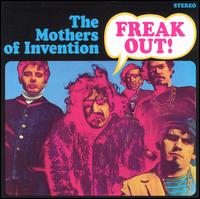
Freak Out! - 1966 Verve
D
(Great / Very Good)
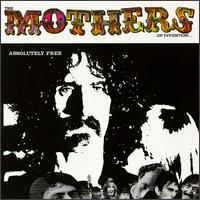
Absolutely Free - 1967 Verve
C
(Very Good / Great)
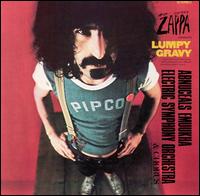
Lumpy Gravy - 1968 Verve
7
(Mediocre / Good)
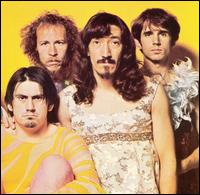
We're Only In It For The Money - 1968 Verve
D
(Great / Very Good)
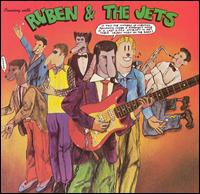
Cruising With Ruben & The Jets - 1968 Verve
8
(Good / Mediocre)
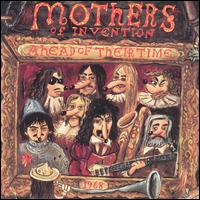
Ahead Of Their Time - 1993 Rykodisc
9
(Good)
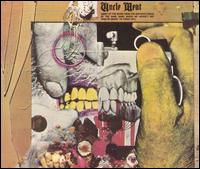
Uncle Meat - 1969 Bizarre
D
(Great / Very Good)
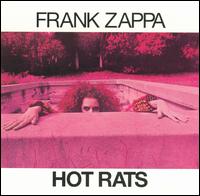
Hot Rats - 1969 Bizarre
D
(Great / Very Good)
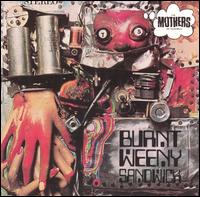
*Burnt Weeny Sandwich - 1970 Bizarre*
E
(Great)
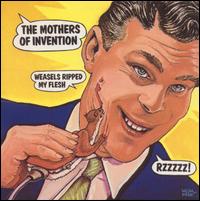
Weasels Ripped My Flesh - 1970 Bizarre
9
(Good)
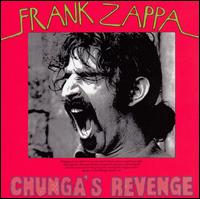
Chunga's Revenge - 1970 Bizarre
9
(Good)
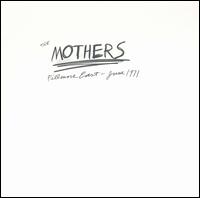
Fillmore East, June 1971 - 1972 Bizarre
5
(Mediocre / Bad)
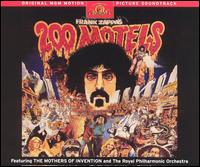
200 Motels - 1971 United Artists
4
(Bad / Mediocre)
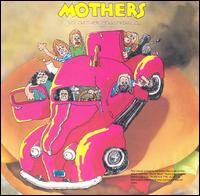
Just Another Band From L.A. - 1972 Bizarre
6
(Mediocre)
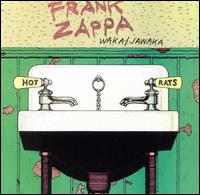
Waka Jawaka - 1972 Bizarre
9
(Good)
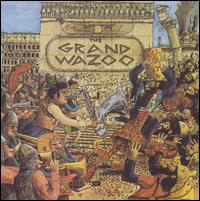
The Grand Wazoo - 1972 Bizarre
8
(Good / Mediocre)

Imaginary Diseases - 2007 Zappa
9
(Good)
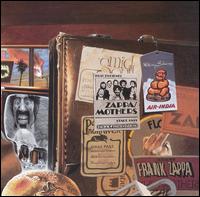
Overnite Sensation - 1973 DiscReet
A
(Very Good / Good)
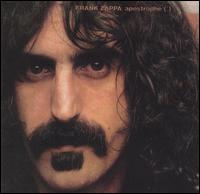
Apostrophe - 1974 DiscReet
9
(Good)
I`d give it 10 out of 10 for the guitar tone in the solo on Stink
Foot alone and the trickery of St Alphonso`s Pancake Breakfast.Full
marks and never even mentioned Uncle Remus or Cosmic Debris.I know
this album appeals to the lowest common denomanator ,but it`s still
fantastic!
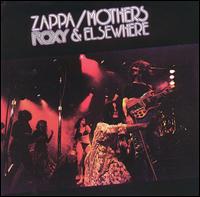
Roxy & Elsewhere - 1974 DiscReet
C
(Very Good / Great)
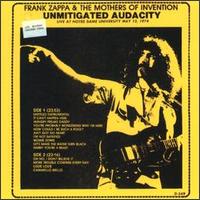
Unmitigated Audacity - Foo-ee! 1991
8
(Good / Mediocre)
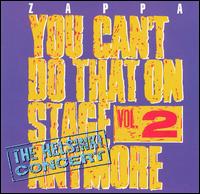
You Can't Do That On Stage Anymore, Vol 2 - 1988 DiscReet
9
(Good)
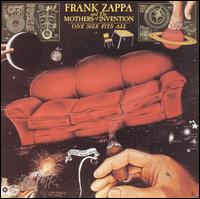
One Size Fits All - 1975 DiscReet
B
(Very Good)
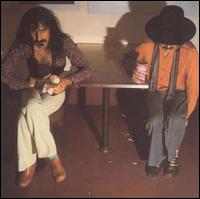
Bongo Fury - 1975 DiscReet
8
(Good / Mediocre)
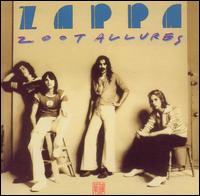
Zoot Allures - 1976 DiscReet
A
(Very Good / Good)
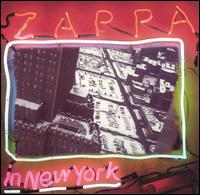
Zappa In New York - 1978 DiscReet
9
(Good)
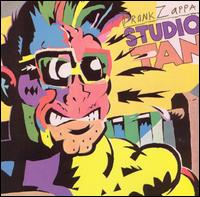
Studio Tan - 1978 DiscReet
7
(Mediocre / Good)

Sleep Dirt - 1979 DiscReet
6
(Mediocre)
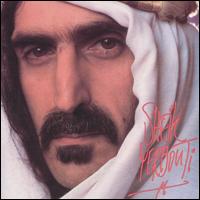
Sheik Yerbouti - 1979 Zappa
9
(Good)
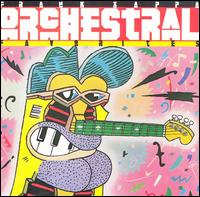
Orchestral Favorites - 1979 DiscReet
6
(Mediocre)
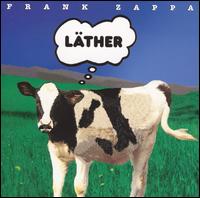
Läther - 1996 Rykodisc
B
(Very Good)
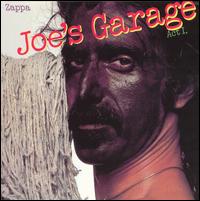
Joe's Garage - 1979 Zappa
B
(Very Good)
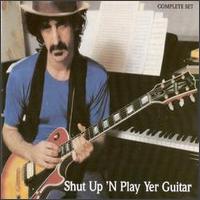
Shut Up 'N' Play Yer Guitar - 1981 Zappa
9
(Good)
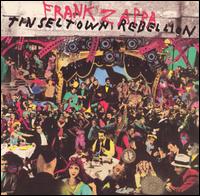
Tinseltown Rebellion - 1981 Barking Pumpkin
6
(Mediocre)
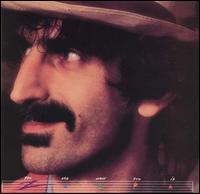
You Are What You Is - 1981 Barking Pumpkin
D
(Great / Very Good)
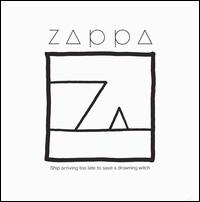
Ship Arriving Too Late To Save A Drowning Witch - 1981 Barking Pumpkin
8
(Good / Mediocre)
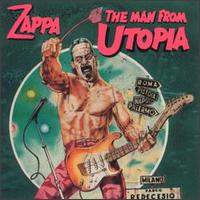
The Man From Utopia - 1983 Barking Pumpkin
6
(Mediocre)
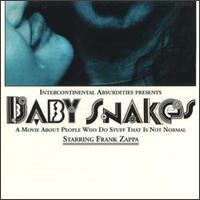
Baby Snakes - 1983 Barking Pumpkin
8
(Good / Mediocre)
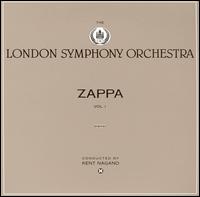
London Symphony Orchestra Vol 1 - 1983 Barking Pumpkin
6
(Mediocre)
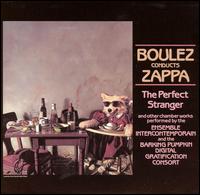
The Perfect Stranger - 1984 Barking Pumpkin
7
(Mediocre / Good)

Francesco Zappa - 1984 Barking Pumpkin
6
(Mediocre)

Them Or Us - 1984 Barking Pumpkin
B
(Very Good)
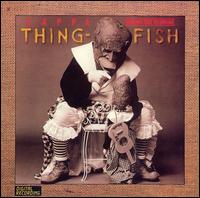
Thing Fish - 1984 Barking Pumpkin
4
(Bad / Mediocre)
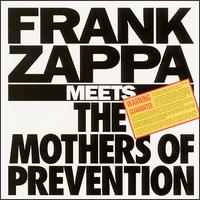
Meets The Mothers Of Prevention - 1985 Barking Pumpkin
7
(Mediocre / Good)
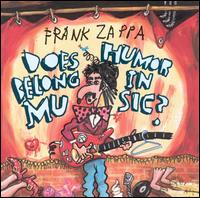
Does Humor Belong In Music? - 1986 Barking Pumpkin
8
(Good / Mediocre)
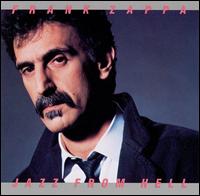
Jazz From Hell - 1986 Barking Pumpkin
8
(Good / Mediocre)

London Symphony Orchestra Vol 2 - 1987 Barking Pumpkin
6
(Mediocre)
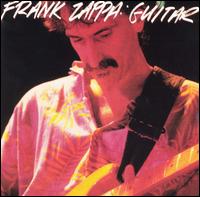
Guitar - 1988 Barking Pumpkin
9
(Good)
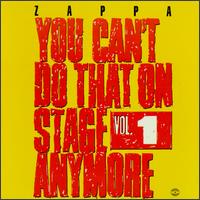
You Can't Do That On Stage Anymore, Vol 1 - 1988 Barking Pumpkin
A
(Very Good / Good)
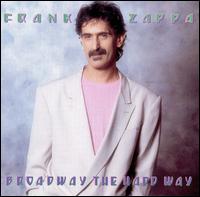
Broadway The Hard Way - 1988 Barking Pumpkin
8
(Good / Mediocre)
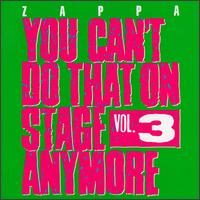
You Can't Do That On Stage Anymore, Vol 3 - 1989 Barking Pumpkin
8
(Good / Mediocre)
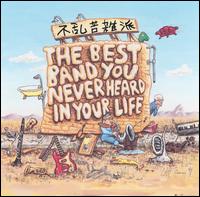
The Best Band You Never Heard In Your Life - 1991 Barking Pumpkin
B
(Very Good)
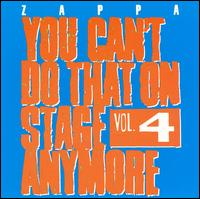
You Can't Do That On Stage Anymore, Vol 4 - 1991 Barking Pumpkin
9
(Good)
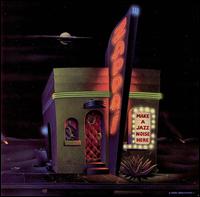
Make A Jazz Noise Here - 1991 Barking Pumpkin
8
(Good / Mediocre)
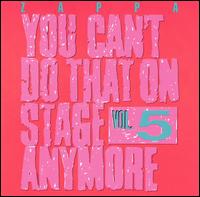
You Can't Do That On Stage Anymore, Vol 5 - 1992 Barking Pumpkin
9
(Good)
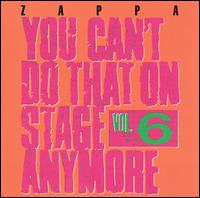
You Can't Do That On Stage Anymore, Vol 6 - 1992 Barking Pumpkin
9
(Good)
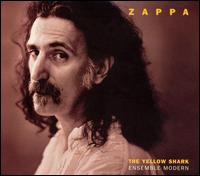
The Yellow Shark - 1993 Rykodisc
6
(Mediocre)

Civilization Phaze III - 1995 Barking Pumpkin
8
(Good / Mediocre)
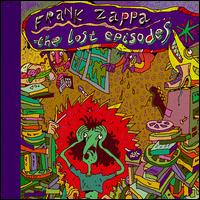
The Lost Episodes - 1996 Rykodisc
A
(Very Good / Good)

Trance Fusion - 2007 Zappa
9
(Good)